How Do Travel Agents Make Money? [The Travel Agent Business Model]
In the past, travel agents made money from commissions from airlines and hotels. And while this is still a key revenue source for travel agents, the increasing prevalence of online booking has made them look for new sources to diversify their income. So, how do travel agents make money today?
Below, we explain the different ways in which independent professionals and online agencies generate revenue in the ever-changing travel industry. By understanding the rewards that come with taking on the role of a travel agent, you will gain insight into this often-overlooked career path and how it could fit into your own life goals.

How Do Travel Agents Work?
Travel agents work to provide their clients with a stress-free and personalized travel experience by taking care of all the details and providing expert advice and support. Travel agents can work independently or for travel agencies.
The key role of a travel agent is to assess their client’s needs and make the necessary recommendations and arrangements based on them. Services provided by travel agents include:
- Consultation – Determining the client’s travel needs, budget, and preferences. This includes asking questions about the purpose of the trip, the desired destination, preferred travel dates, accommodation preferences, and any specific requests or requirements.
- Research – Identifying the best travel options available for the client (flights, hotels, rental cars, tours, and activities).
- Booking – Making travel arrangements on behalf of the client.
- Confirmation – Verification of all details related to the booking, including providing the client with the necessary information, such as flight times, hotel reservations, and tour details.
- Follow-up – A travel agent may provide advice on travel visas, travel insurance, packing tips, and other travel-related issues.
How Do Travel Agents Get Paid?
The most common way a travel agent gets paid is from commissions from airlines, cruise lines, or tour companies for packages sold. The commission rate varies depending on the type of travel and the agreements with travel providers.
Additionally, travel agents get paid a fee by their clients for their services. The amount of the service fee is entirely up to the agent and is related to the type of services provided. Typically, it’s charged for arranging some or all segments of the travel.
If the travel agent is employed by an agency, then just like any other employee, they’ll receive a salary or hourly wages.
Net price overages are also an option for many agencies. So, for instance, if an agent books a certain number of hotel rooms, the vendor gives them a discount which is then marked up, and the difference is kept by the agency.
Some travel agents may also earn additional revenue by offering travel insurance or upgrades to accommodations or transportation.
Travel Agent Business Model
The simplest way to describe the business model of travel agents is to go by the main source of income. Based on this, there are two types of business models:
- Commission-Based
The commission-based business model allows travel agents to earn a percentage of the total cost of a travel package, such as flights, accommodations, and activities. Depending on whether the package is domestic or international, travel agent commissions may be as low as 5% or as high as 20% or more.
- Service-Fee-Based
In a service-fee-based business model, travel agents charge their clients a service fee for their expertise or assistance in planning a trip. If the travel agent is in the role of an advisor, they may recommend a popular destination or deal on a specific trip.
Alternatively, they may provide help for any given element of the trip, from booking a hotel room or flight to booking a spa treatment. The fee charged can be a flat rate or a percentage of the total trip cost.
It’s important to note that with the rise of online booking platforms, the travel industry has become more competitive, and many travel agents use a combination of commission and service fees, plus access to exclusive deals and pricing. This way, they’re able to offer their clients a unique and personalized experience while staying competitive in the market.
How Travel Agents Make Money
Here are the most common ways travel agents make money.
1. Travel Insurance Sales
Travel insurance is essential to ensure your trip is protected in case of any unexpected changes or emergencies. Travel agents can sell insurance policies for their clients, which provide coverage for things like flight cancellations, lost luggage, and medical expenses. Depending on the policy sold, agents can earn up to 40% in commission.
2. Cruise Sales
Travel agents may receive a high commission or bonus on cruises based on the number of rooms booked by their clients. Typically, the commission rate for cruises is around 12%. This is because a large number of passengers are required to fill a ship.
Note that a significant portion of clients’ bills is taxes. For instance, a booking for cruise berths priced at $4,000 might include taxes amounting to $1,500. When booking cruises, agents earn commissions only on the portion of the cost that is not taxed.
3. Car Rental
Depending on the car rental agency, agents may earn between 8% to 10% commission on bookings. Other travel agents charge a flat fee of $20–$40 for making the reservation with the car rental company.
The car rental industry is highly competitive, so the key here is for travel agents to establish relationships with different companies and shop around for the best rates for their clients.
From visiting vineyards in Tuscany to exploring the rainforest in Costa Rica, tours are an excellent way for clients to get the most out of their travels. Agents can earn commissions ranging between 10% and 20% when they book a tour package and may also receive incentives such as free rooms or discounts on future trips.
5. Premium Listings
Car companies, airlines, and cruise lines pay handsomely for premium listings on travel agents’ sites. This gives the company more visibility and may help them generate more revenue. Typically, agents negotiate a commission for booking trips with these companies or charge a flat fee for providing access to the website.
6. Vacation Packages and Deals
If a travel agent is employed, they can use the buying power of their agency to get discounts and special offers which they can then pass on to their clients in the form of reduced hotel rates, exclusive deals, and other incentives. Usually, the commission rates for booking vacation packages range between 10% and 15%.
7. Niche Travel
Focusing on a niche area can be highly profitable for travel agents because it allows them to refine their expertise and cater to clients seeking a specific type of trip, like wedding and honeymoon or sports travel.
Some agents have two distinct branches of their business. The first covers travel to various destinations worldwide, while the second specializes in a particular theme like yachting, wine, or culinary adventures. For instance, an agent could sell packages for resorts and cruises while also organizing unique wine or food-related trips.
8. Mode of Travel
Vacationers have options beyond just using traditional modes of transportation like planes, trains, and cars. For instance, they can choose to explore an area by cycling from one spot to another. It’s the agent’s responsibility to arrange the logistics of the trip, from transportation to the actual adventure.
9. Corporate Travel
Many travel agents make their money by organizing custom trips for corporations. From organizing team building, corporate retreats, or special rewards trips, corporate travel is an excellent source of revenue and provides the opportunity for the agent to make long-term relationships with companies.
Travel agents may be paid an hourly fee for their services and/or a commission on airline tickets, cruises, and hotels and resorts. They could also receive incentives to book certain properties or activities, such as golf courses or spa treatments.
How Much Do Travel Agents Make Per Booking?
A travel agent’s commission may be as low as 5% or as high as 30% and depends on various factors such as the type of booking, the element of travel, and the vendor they book with. In addition to commissions, travel agents’ income can come from other sources, such as service fees.
For example, if a travel agent earns a commission of 10% on a $2,000 booking, they would make $200. However, if the booking is a complex itinerary, such as a multi-country trip, and the travel agent charges a service fee of $200, their total income from that booking would be $400.
Do Travel Agents Get Paid Hourly?
Yes, travel agents can be paid by the hour, and it’s a more common type of compensation for travel agents who work for larger agencies. The average hourly pay of travel agents in the US currently stands at $17.71 and goes as high as $28 per hour in states like New York, California, and Nevada.
However, travel agents are typically compensated in different ways, and their pay structure may depend on the company they work for and the type of travel they book. And while some are paid on an hourly basis, most receive a salary or are paid on a commission basis.

Travel Fam Trip
The Best Travel Fam Tips
- Travel Fam Tips
How Travel Agencies Earn Money: A Complete Guide To Their Revenue Streams

Have you ever caught yourself wondering how travel agencies manage to stay afloat in this era of easy-peasy DIY trip planning? You’re not alone – it’s a question that has crossed my mind more times than I can count, especially after learning that travel agencies in the U.S. pulled in a whopping $17.3 billion in 2021! Like many of you, I was itching to peel back the curtain on this tenacious industry and get a glimpse at their revenue-generating magic tricks.
So buckle up and come along for the journey; our guide is your all-access pass to demystifying how these travel maestros keep their cash register singing.
Key Takeaways
- Travel agents get commissions from airlines, hotels, and other suppliers for bookings made for their clients. These commissions are a big part of how they earn money.
- Agencies also charge service fees for personalized itinerary planning and handle complex travel arrangements, adding another income source.
- Offering niche services like luxury eco – tourism or themed vacations allows travel agencies to attract specific types of travelers and create additional revenue opportunities.
- Big travel agencies use their size to negotiate better deals with suppliers and provide diverse services worldwide, helping them maximize profits.
- To increase earnings further, travel agents can promote exclusive deals on social media, network with local businesses for corporate arrangements, and consistently enhance their industry knowledge through training.
The Evolution of Travel Agencies

Travel agencies have evolved over time, from traditional storefronts to more modern and flexible home-based models. With the rise of online booking platforms, travel agents have had to adapt their business strategies to stay competitive in the industry.
A Brief History
I’ve seen the landscape of travel agencies transform over time. In their early days, these agencies operated as key gatekeepers between travelers and transportation providers like airlines and train companies.
They thrived on commissions from bookings, wielding exclusive access to reservation systems that were out of reach for the general public.
Over the years, travel agents have had to adapt quickly due to technological advancements. The internet burst onto the scene and suddenly, flight tickets and hotel rooms were just a click away for anyone with web access.
This revolution forced agencies to reevaluate their value propositions and dig deeper into personalized services where they still held an edge over digital platforms.
Shift in Business Models
Travel agencies have had to rethink their approach to stay competitive. In the past, they primarily earned from commissions on bookings for flights, hotels, and tours. Now, with the rise of online travel platforms and do-it-yourself booking options, traditional commission-based models don’t cut it anymore.
Agencies are turning towards more diverse business models that focus on value-added services. They’re charging service fees for personalized itinerary planning and leveraging relationships with providers to offer exclusive deals.
Some even create unique travel experiences that you can’t find elsewhere or cater to niche markets like luxury eco-tourism or adventure travel. By adapting in these ways, they keep their edge in a tech-driven market where travelers demand more control and customization.
Transition to Home-Based Agencies
Making the switch to home-based agencies marked a significant change in the travel industry. I traded my office for my living room, embracing flexibility and personalized service that clients love.
This move cut down on overhead costs dramatically, boosting profit margins without sacrificing quality. By leveraging technology and social media, I can connect with customers anywhere at any time.
Adapting quickly became crucial once I ditched the traditional storefront. Now, fostering relationships with clients and offering tailored experiences is at the core of what I do. It feels good to provide value that goes beyond just booking trips; from crafting unique itineraries to being there when plans go awry – nothing beats the personal touch I can give from my home setup.
Diversifying Income Streams
Diversifying income streams is essential for travel agencies to maximize their earnings and remain competitive in the industry. By offering a variety of services such as customized itineraries, niche travel packages, and corporate travel management, agents can tap into different market segments and revenue sources.
This not only increases their potential for earning commissions from airline and hotel bookings but also allows them to charge service fees or markups on specialized offerings. Moreover, exploring new sales strategies and partnerships with tour operators can further diversify income streams and create additional opportunities for generating profits.
In conclusion, diversifying income streams enables travel agencies to adapt to changing market demands and capitalize on various revenue sources beyond traditional booking commissions.
How Travel Agencies Make Money

Travel agencies make money through various revenue streams, including commissions from airlines and hotels, service fees, and custom itinerary services. To learn more about the different ways travel agents earn money, keep reading!
Breakdown of Revenue Streams
Travel agencies earn money through various revenue streams, including:
- Commission from Suppliers: Travel agents receive a commission from airlines, hotels, car rental companies, and other suppliers for bookings made on behalf of clients.
- Service Fees: They charge service fees for the time and expertise invested in creating customized itineraries and handling complex travel arrangements.
- Tour Packages: Selling pre-packaged tour deals gives them a margin on the price difference between what they pay the supplier and the package price sold to the client.
- Corporate Services: Business travel management generates income through negotiating corporate rates with suppliers and providing expense management solutions.
- Ancillary Products: Earning commissions from selling travel insurance, visa processing services, and other ancillary products adds to their revenue stream.
- Incentives and Bonuses: Some agents receive incentives or bonuses based on achieving sales targets set by suppliers or consortiums they are affiliated with.
- Group Booking Markups: Organizing group tours enables them to negotiate favorable rates with suppliers and earn markups on group bookings.
Corporate Travel Agencies
After understanding the revenue streams in travel agencies, corporate travel agencies stand out as a significant source of income. These agencies specialize in managing business-related travel for organizations.
They earn money through service fees charged to businesses for booking flights, accommodations, and other logistics required for corporate trips. Additionally, they often negotiate contracts with airlines and hotels to secure discounts or commissions on bookings made for their clients.
Moreover, corporate travel agencies can generate revenue from providing consultancy services that optimize their client’s travel spending through cost-saving measures like bulk purchasing deals and data analysis to identify better booking options.
Leisure Travel Agencies
Leisure travel agencies generate income through commissions on bookings, service fees, and markups on tour packages. They earn a percentage of the total cost when clients book flights, accommodation, or tours through them.
Additionally, travel agents may charge service fees for custom itineraries and specialized services such as destination weddings or adventure trips. Furthermore, leisure travel agencies often markup the price of tour packages provided by suppliers to achieve a profit margin.
By diversifying their revenue streams and offering niche services such as luxury travel experiences or themed vacations, these agencies can maximize their earnings in an increasingly competitive market.
Custom Itineraries and Niche Services
When creating custom itineraries and niche services, I focus on curating unique travel experiences tailored to each client’s preferences. By offering specialized packages such as adventure travel, culinary tours, or eco-friendly getaways, I can meet the specific needs of discerning travelers.
This personalized approach allows me to differentiate my services in a competitive market, attracting clients seeking exclusive and authentic experiences.
I leverage my expertise to craft bespoke itineraries that cater to niche interests like cultural immersion, luxury travel, or off-the-beaten-path destinations. By tapping into these specialized areas, I can provide added value and stand out from mass-market offerings.
Big Travel Agencies
Expanding beyond niche services, big travel agencies play a significant role in the industry. They often have a substantial market share and boast extensive networks with various suppliers such as airlines, hotels, and tour operators.
Scaling their operations to reach a broader audience, these agencies leverage their brand recognition to negotiate favorable terms with suppliers, which in turn impacts their revenue streams significantly.
By tapping into economies of scale and offering diverse services across different regions or continents, large travel agencies can maximize profits while providing comprehensive support to a wide array of clients.
Taking advantage of their size and resources, big travel agencies are able to offer competitive pricing on package deals due to wholesale buying power. Additionally, they can invest in cutting-edge technology solutions that streamline processes for both employees and customers – from booking platforms to customer management systems.
Maximizing Earnings as a Travel Agent
To maximize earnings as a travel agent, understanding the different types of travel agents and tips for increasing income are essential. Want to know more about how you can increase your revenue as a travel agent? Keep reading to learn all about it!
Different Types of Travel Agents
There are various types of travel agents, each specializing in different areas such as corporate travel, leisure travel, custom itineraries, and niche services. Corporate travel agents focus on providing business-related travel services such as booking flights and accommodations for employees attending conferences or meetings.
On the other hand, leisure travel agents cater to individuals seeking vacation packages, cruises, or adventure trips. Some agents specialize in creating customized itineraries tailored to clients’ specific needs and interests while others focus on niche services like destination weddings or eco-tourism.
Some big agencies offer a wide range of services; smaller home-based agencies often provide personalized attention to their clients by focusing on specific niches or customized offerings.
Tips for Increasing Income
To increase income as a travel agent, I suggest the following:
- Leverage social media to promote exclusive travel deals and engage with potential clients.
- Offer personalized services and carefully curated itineraries to attract high – paying clients.
- Network with local businesses to establish partnerships for corporate travel arrangements.
- Invest in ongoing training and education to stay updated on industry trends and destination knowledge.
- Implement a referral program to incentivize existing clients to recommend your services to others.
Understanding Commissions
As a travel agent, understanding commissions is essential for maximizing earnings. Commissions are the primary source of income for many travel agencies and agents. They are typically earned from booking flights, hotels, car rentals, and other travel services on behalf of clients.
These commissions can vary based on the travel provider and type of service booked. It’s crucial to have a clear understanding of commission structures offered by different suppliers in order to negotiate better deals and maximize profits.
Travel agents should also be aware of any incentives or bonuses offered by suppliers, as these can significantly boost earnings. Building strong relationships with preferred suppliers can lead to higher commission rates and exclusive offers for clients.
Creating Niche Services
As a travel agent, I develop niche services to cater to specific customer needs. This may involve creating specialized packages for unique destinations, such as eco-tourism adventures or culinary tours.
By offering niche services, I can differentiate my agency from competitors and attract clients seeking tailored experiences. Additionally, developing expertise in niche areas allows me to provide valuable insights and recommendations that set me apart as an industry expert.
My goal is to identify underserved markets and design custom itineraries that resonate with those audiences. This approach not only enhances customer satisfaction but also boosts my agency’s revenue potential through premium service fees and exclusive partnerships with niche suppliers.
In conclusion, travel agencies can generate income through various revenue streams, including commissions from bookings and service fees. They have adapted business models to diversify their earnings by offering custom itineraries and niche services.
Maximizing earnings as a travel agent involves understanding different types of agents and tips for increasing income. Overall, the profitability of travel agencies is dependent on their ability to adapt to changing market dynamics and offer unique value to clients.
1. How do travel agencies make money?
Travel agencies make money through commissions from airlines, hotels, car rental companies, and tour operators when they book travel services for clients.
2. Can I save money by booking directly instead of using a travel agency?
In some cases, you may find lower prices by booking directly; however, travel agencies often have access to special deals and can provide valuable expertise and support.
3. What are the different revenue streams for travel agencies?
Travel agencies earn revenue through commissions, service fees charged to clients, selling travel insurance or packages, and through partnerships with other businesses in the industry.
4. Do all travel agencies charge service fees?
Not all travel agencies charge service fees; it varies based on the agency’s business model and the complexity of the trip being planned.
5. How much commission do travel agents receive?
Commissions for travel agents vary but typically range between 10-15% of the total booking cost depending on the type of service booked.
Related News

Why Do Travel Agents Get Better Deals? The Truth Behind The Savings

Uncover The Best Travel Agent Fam Trips To Africa: Explore The Wonders Of Kenya, Tanzania, And More!
You may have missed.

Why Taking Family Vacations Is Vital For Building Strong Bonds And Creating Lasting Memories

How Do Disney Travel Agents Earn Their Income?

How To Successfully Market Yourself As A Travel Agent And Gain New Leads
The Journal
Travel Advisor Resources
How Much Do Travel Agents Make? Fora’s Full Guide

The Modern Travel Agency
Fora Travel
https://www.foratravel.com/the-journal/how-much-do-travel-agents-make
How much do travel agents make? What factors go into how much a travel agent — or as we prefer, travel advisor — earns? We’re telling all.
Alternatively, you can learn exactly how much you can make by becoming a Fora Advisor . Apply today and we’ll answer all your questions.
First, is there a high demand for travel agents? (Hint: yes!)
And demand is growing. Since travel restrictions were lifted after the COVID-19 pandemic, more people than ever are going on vacations and business trips (check out jobs where you travel ) — more importantly, they’re smarter about how they go about it. And there’s no better way to book a trip than to use a travel advisor to get awesome perks, deals and the kind of personal touches that turns a good trip into a great one.
(Wondering how to become a travel agent ? Our guide has you covered.)
How do travel agents get compensated?
There are a few different ways travel advisors earn income, and the source typically depends on the service. Here’s how it breaks down.
(Wondering about startup and upkeep costs? Check out our guide to how much it costs to become a travel agent .)
Travel partners (or suppliers, in industry lingo) pay commissions: think hotels, travel insurance, rental cars, cruise incentives, tours…
Image courtesy of Turtle Bay Resort
A large portion of a travel advisor’s income comes from commissions, which are a percentage — usually between 10 and 15 percent — of whatever service their client is benefiting from, be it a hotel reservation, travel insurance and so on. (Here are 5 types of bookings you can make as a Fora Advisor that aren’t hotels .)
Suppliers, such as hotel brands, cruise lines and rental car providers pay these commissions; and Fora Advisors don’t charge their clients for commissionable services. In other words? Fora Advisors get paid, and their clients don't have to pay anything extra.
The cool thing is that many of the best hotels and services know that happy travel advisors will send new clients back, so the suppliers will throw in complimentary perks to sweeten the deal. This is why Fora Advisors can offer the same rate as an online travel agency for a hotel room at, say, Virgin Hotels New Orleans (one of the most unique places to stay in New Orleans , by the way), yet offer cool extras for their clients at no additional cost.
Our guide to how much do travel agents make per booking gets into the details of the process if you’re curious.
Clients pay planning & service fees: non-commissionable bookings, vacation packages & custom itineraries…
Besides commissions, planning and service fees are the other major sources of income for travel advisors.
Why might advisors charge fees? In most cases, an advisor may charge a fee to develop a custom itinerary for a client. In this case, the client compensates the advisor for their time, much in the same way one would pay a financial advisor.
At Fora, it’s generally up to the advisor to decide how much to charge (if at all) for custom itineraries.
How much do travel agents make exactly? It depends
There’s no simple answer to this question, because Fora Advisors have the flexibility to work as much or as little as they want. Some treat their advisor position as a part-time endeavor alongside another job or caregiving duties, for instance. Others jump into travel advising full time.
Can you make ‘good’ money as a travel agent? You bet
Is being a travel agent worth it ? Fora Advisors will say yes. Many top Fora Advisors earn six figures per year. Again, when you join Fora, you can work as much or as little as you'd like, so the money earned will vary, but regardless, we'll teach you how to maximize your earnings.
Ready to start your lucrative career in travel? Become a Fora Advisor today .
What’s the average travel agent salary in the USA?
We can’t speak for all travel agencies, but some of the top Fora travel advisor salaries are measured in seven figures. And while such a salary is quite a bit above average, these top earners put in a lot of work, and have been doing this for a while.
On the flip side, plenty of Fora Advisors treat their travel business like a side hustle on top of their day job, earning an extra couple of hundred to several thousand dollars per month.
Factors that might affect how much a travel agent makes
A lot of factors go into how much travel agents make per month. Here are some of the most common.
Remote vs. brick-and-mortar travel agencies
There are a lot of advantages to becoming a travel agent online , but the biggest might be the substantial difference in overhead.
Travel agents who work from brick-and-mortar establishments have to pay rent or property taxes for office space. Remote travel agents only have to worry about internet connection and a comfy spot to sit.
In either case, you have to factor in your expenses when calculating how much you’re making as a travel agent, and remote agents have a clear advantage.
Independent vs. employed travel agents
Let's break it down. There are essentially three different types of travel agent jobs .
Employed travel advisors — that is, advisors who work for a company that sells travel — typically earn base pay, but there are a lot of trade-offs that make this business model less attractive to the advisor. Most importantly, there may be caps on the number of clients you have and / or reduced commissions that severely impact your bottom line.
One potential positive: marketing resources may be available through the company, but oftentimes, they’re not exactly modern in their approach (unlike Fora's!). And finally, employed travel advisors generally have to adhere to a traditional nine-to-five schedule — with little flexibility.
Fully independent travel advisors, on the other hand, can enjoy all the flexibility they want. But, as business owners, they also have to consider things like licensing fees, marketing materials, business insurance and so on that employed advisors don’t have to worry about. These fees and extra expenses can dampen profit margins, and can be prohibitive for prospective advisors who don’t necessarily want to risk the startup costs.
Our guide on how to start a travel agency from scratch provides more details, but we’ll be frank: there’s a much easier path to making great money as a travel agent.
The third option (and sweet spot)? Join Fora. Fora Advisors are technically independent travel agents — sometimes referred to as independent contractors — except they operate under Fora’s licenses and have access to an incredible wealth of resources (including extensive travel agent training ).
Plus, thanks to Fora's global network of travel partners, our advisors unlock tons of exclusive client perks at thousands of hotels.
Want to learn more? Here’s how to become an independent travel agent through Fora.
In a literal sense, how do travel agents get paid?
Across the industry, travel advisors are paid via the old-school, commission-check-in-the-mail method. At Fora, travel advisors are paid via direct deposit. And our advisors don't have to chase down their commission payments. We take care of all that.
Read about how travel agents get paid for more details.
Are there ways to maximize the earnings a travel agent makes?
Certainly. How much a travel agent makes depends heavily on factors like their niche, host agency (if applicable) and — of course — travel planning skills.
Can’t wait to start your travel career? Become a Fora Advisor .
1. Consider adopting a niche
A niche can go a long way in boosting how much a travel agent makes because it gives them a focus. Rather than trying to be good at everything, niche travel agents become great at only one or two aspects of travel — at least to start. This allows them to build a wealth of knowledge in their niche that will impress clients, potentially drawing in business from new clients seeking a similar trip.
At Fora, there’s no limit to the type of niches an advisor adopts. You could specialize in selling cruises, Disney vacations, trips to a certain location (such as Las Vegas or Barcelona) — whatever you’re most passionate about.
(BTW: learn how to become a cruise travel agent or how to become a Disney travel agent .)
2. Expand your partnerships with hotel reps, tour operators and other travel-related services
Image courtesy of The Rubens at the Palace
Incentives like VIP hotel perks — complimentary hotel upgrades, meals, etc. — give travel advisors an edge over online travel agencies (OTAs) like Booking.com. As such, expanding these partnerships allows travel advisors to offer a wider range of trip benefits while remaining competitive.
Fora Advisors can unlock awesome perks for their clients at over 4,500 hotels around the world and counting. And Fora’s HQ is constantly working to expand its network of partnerships.
3. Work with a travel company that cares about your success
This may be a shameless plug, but our advisors will back us up on this one. Just check out our advisor-sourced guide to the best reasons to become a Fora Advisor .
In any case, your choice of host agency is critical. Plenty of old-school agencies essentially throw their advisors into the wild, only stepping in if sales quotas aren’t met.
At Fora, we offer unwavering support to all our advisors, plus loads of awesome resources, including a bevy of marketing materials, thorough travel agent training and access to an engaged community filled with travel experts.
Here are a few insider tips for how to be a successful travel advisor .
4. Give your clients the star treatment (because thoughtful advisors will get repeat business)
Possibly the most important factor affecting how much a travel agent makes: their customer service skills.
The simple truth is that clients will only use your services if you actually help them. Putting the time and effort into making sure your clients have an amazing experience will pay dividends later. Not only will you likely win their future business, but you could win the business of their family members, friends and peers, too.
(Read about how travel agents get clients .)
5. Keep at it: being a travel agent can be stressful, but so worth it
Finally, patience and dedication have a dramatic effect on how much travel agents make.
Chances are, you’re not going to start with a dozen clients planning 20 trips. It takes a lot of time and effort to get to that point, but if you can, you’ll find that travel planning can be a very rewarding career.
Need to know more? See what it takes to become a travel agent .
How much do travel agents make? Ask (or become) a Fora Advisor
Ultimately, the best way to find out how much you can make as a travel agent is to try it out for yourself. Sign up to become a Fora Advisor today .
Not quite ready? Check out these travel advisor resources, too:
How to Market Your Travel Business Like a Pro: Tips from the Experts
How to Become a Luxury Travel Agent: the 2023 Guide
Travel Agent Certification: Options and FAQs
Debunking 3 Myths about Becoming a Travel Advisor
A Window into Fora's Certified Training
Book a Cruise With a Virgin Voyages Travel Agent
Why Group Bookings Are Great: Tips from an Expert
Are you the go-to person for travel tips?
Transform your passion for travel into your dream job. We'll set you up with everything you need to succeed as a travel advisor. From training to top-notch tech, marketing assets, community, commission tracking & payments (and more), we've got you.
BUSINESS STRATEGIES
How to make money as a travel agent in 13 unique ways
- Rachel Bistricer

Making money as a travel agent is a viable business idea that taps into the multi-trillion-dollar global travel and tourism industry.
In an age where experiences are valued more than material possessions, individual travel agents have a unique opportunity to capitalize on this trend. They can offer personalized service, expert advice and stress-free planning that online booking sites can't match. The role of a travel agent has evolved with technology, and now, more than ever, agents have access to a vast array of tools and platforms to enhance their services and increase their revenue.
Whether you're an aspiring travel agent or you're already navigating the travel industry, understanding how to monetize your passion effectively is crucial. The journey from a travel enthusiast to a profitable travel agent involves mastering the art of client service, identifying profitable travel business ideas and executing strategic promotion when starting a business .
Making money as a travel agent: the essentials
The travel industry is dynamic and competitive and to make money as a travel agent you must have a strong foundation built on several key elements. Understanding these essentials can help turn a passion for travel into a profitable venture.
Tip: Learn how to start a service business with our guide.
Build a strong brand identity
A strong brand identity is crucial for any business, but in the travel industry, it's essential for standing out in a crowded market. Your brand is what sets you apart from competitors and speaks to your target audience. It encompasses everything from your logo and company colors to your messaging and customer service style. A memorable brand can foster loyalty, encourage word-of-mouth referrals and create a lasting impression that draws clients back time and again.
Offer unique value propositions
To make money, travel agents must offer something that clients can't easily find elsewhere. This could be exclusive deals, specialized knowledge of a niche market or exceptional customer service. Your value proposition should answer the question, "Why should a traveler book with me?" By clearly defining and communicating your unique offerings, you can attract and retain a client base that values what you provide.
Leverage technology and tools
In today's digital age, the right technology can make all the difference in managing and growing a travel business. From CRM systems that help maintain client relationships to booking software that streamlines the reservation process, technology can enhance efficiency and improve the client experience. Social media platforms and online marketing tools are also invaluable for promoting your business, reaching a wider audience and making money as a travel agent.
Establish strategic partnerships
Partnerships with other businesses in the travel industry, such as hotels, airlines, and tour operators can lead to mutual benefits. These relationships can provide access to better rates, special promotions and additional resources that can be passed on to clients. Networking within the industry can also open doors to new money-making opportunities and help you stay informed about the latest trends and developments.
13 ways to make money as a travel agent
The travel industry offers a myriad of opportunities for agents to earn income. Here are 13 diverse ways to monetize your travel agency business.
Niche travel
Unique experiences
Group travel packages
Earn booking commissions
Consultation fees
Educational travel workshops
Travel insurance services
Create a travel blog
Sell travel products
Destination wedding planning
Corporate travel management
Social media marketing
Membership program
01. Niche travel
Catering to niche travel markets such as luxury travel, adventure tours or ecotourism can set you apart as a travel agent and attract clients looking for specialized knowledge and experiences. If you make a successful name for yourself in your niche and become the go-to travel agent for it, it’s a sure way to increase your chances of making money.
02. Unique experiences
Offering unique travel experiences, such as private tours, exclusive access to events or bespoke travel itineraries, can help make you stand out in a competitive industry and make money as a travel agent. If you can make your experiences truly unique, in that no one else offers them, your potential for loyal customers and profit is even higher.
03. Group travel packages
You can make money as a travel agent by organizing and selling travel packages to groups based on interests like culinary tours, yoga retreats or volunteer travel, which can lead to bulk bookings and higher profits.
04. Booking commissions
Partnering with travel suppliers means you can earn commissions on accommodations, flights, cruises and tours that you book for your clients. This is a great way to make money as a travel agent because you earn when clients use your services and you earn through booking their services. However, it's important to always act with your customers' best interest in mind, over prioritizing earning commissions.
05. Consultation fees
As an expert in travel, you can make money by charging for creating personalized travel plans and complex itineraries. This can be even more profitable if you offer it as a service for corporate clients and work on a retainer, where you get paid over a set period of time for advice or consultation. If you have a lot of experience as a travel agent and an extensive network it can be easier to find consulting opportunities.
Learn more: How to start a consulting business
06. Educational travel workshops
If you’re looking for extra ways to make money as a travel agent, you could consider conducting workshops or webinars on travel-related topics and then charging for attendance or securing sponsorships. These workshops can be a way to impart your travel knowledge and secure new customers for your business. They can be in-person or online, depending on your location and target audience.
07. Travel insurance services
As part of your travel agent services, you can offer travel insurance to make more money, as you have the potential to earn a commission for each policy sold.
Learn more:
Service business ideas
Service business examples
08. Create a travel blog
Start a travel blog to share travel tips, reviews and potential itineraries. You can build a readership and then make money by monetizing your blog through advertising, affiliate marketing or sponsored content. Starting a blog can also be an effective way to market your travel agency and attract potential clients.
Check out these travel blogs for inspiration with starting your own:
Anika Pannu
Zion Adventure Photog
Get started with a blog maker.
09. Sell travel products
You can make extra money as a travel agent by selling travel gear - this could be luggage, travel accessories or equipment needed for specific trips, such as hiking or mountain climbing. You can choose to sell from a brick-and-mortar store or with an eCommerce website .
How to start an eCommerce business
How to make an eCommerce website
Best eCommerce platforms
10. Destination wedding planning
A creative way to make money as a travel agent is by planning and coordinating destination weddings. These often require a large number of different services for significant numbers of people. Anything from travel arrangements for guests, venue selection and event or party planning . This variety of services can make it a profitable idea for a travel agent to pursue.
11. Corporate travel management
If you’re looking to make a steady income as a travel agency, corporate travel management is a good B2B business idea to develop. It usually involves managing the corporate travel arrangements for an entire company. This means organizing flights and accommodations for employees when they travel for business. You can work with companies of all sizes but those with a global presence and a large number of employees would help you maximize your profitability from your services.
12. Social media marketing
A great way to market your business and make more money as a travel agency owner is to build a strong brand and presence on social media. You can develop this further by becoming a travel industry expert and partnering with travel brands and large agencies to help promote their services in return for commissions.
How to make money on YouTube
How to make money on Instagram
How to make money on TikTok
13. Membership programs
By offering a membership or subscription service as a travel agency you can make a consistent income by providing exclusive deals, perks or content for repeat customers. For example, a membership program could give subscribers early access to special trips or discounts.
How to start making money as a travel agent
Launching a travel agency can be an exciting venture and with a strategic approach, you can set the foundation for a successful business. Here's a step-by-step guide to get you started.
Research and plan your business
Begin by conducting thorough market research to identify your niche and target audience. Develop a business plan that outlines your vision, goals, services, pricing structure and marketing strategies . This document will serve as a roadmap for your business and can be crucial for securing financing or partnerships.
Register your business and make it legal
Choose a business structure that suits your needs whether it's a sole proprietorship , partnership , LLC or corporation . Register your business , come up with a business name , obtain the necessary licenses and permits and ensure you’re complying with all travel industry regulations. Don't forget to purchase liability insurance to protect your business.
Create a strong brand identity
Design a logo and create branding materials that reflect your business's personality and appeal to your target market. Your brand identity will be instrumental in all your marketing efforts and client interactions.
Set up your working space
Decide whether you'll work from home, rent an office space or operate completely online. Ensure you have the necessary equipment and technology to run your business efficiently, such as a reliable computer, phone system and travel agency software.
Build relationships with suppliers
Establish relationships with suppliers like hotels, airlines and tour operators. These partnerships will be key to providing value to your clients and may also allow you to earn commissions on bookings and find different ways to make money as a travel agent.
Develop an online presence
Making a website that showcases your services, offers valuable content and includes clear calls to action is important. Optimize your site for search engines to increase visibility.
Implement marketing strategies
Develop a marketing plan that includes both online and offline strategies. Consider email marketing, content marketing, pay-per-click advertising and networking events to reach your audience and build your client base.
Provide excellent customer service
From the outset, prioritize customer service. Satisfied clients are more likely to return and refer others to your agency. Establish clear communication channels and ensure you're responsive to inquiries and feedback.
How to make money as a travel agent FAQ
How much do travel agents make per booking.
Travel agent income per booking varies widely depending on factors such as the type of booking (flight, hotel, tour package), the supplier's commission rate, and whether the agent adds a service fee. Commissions can range from 5% to 20% or more, and service fees are typically set by the agent based on the complexity of the itinerary.
Can travel agents work from home?
What are the startup costs for a travel agency, is it necessary to have certification to become a travel agent, how can travel agents stay competitive with online booking platforms, what's the best way to find clients as a new travel agent, how important is social media for promoting a travel business, other ways to make money you might want to consider.
How to make money as a student
How to make money as a chef
How to make money as a real estate agent
How to make money as a personal trainer
How to make money as a therapist
How to make money as a freelance writer
How to make money as a singer
How to make money as a contractor
How to make money as a handyman
How to make money as a notary public
How to make money as an entrepreneur
How to make money as a farmer
How to make money as a crafter
How to make money as a teenager
How to make money as a virtual assistant
Related Posts
14 best travel and tourism websites to inspire your own
Creative travel business names: your passport to inspiration
Was this article helpful?

How Do Travel Agencies Make Their Money? (The Ultimate Guide)
How Do Travel Agencies Make Their Money?
Have you ever wondered how travel agencies make money? After all, they don’t seem to do much besides book your flights and hotels. In fact, there’s a lot more to it than that. Travel agencies act as middlemen between you and the airlines, hotels, and other travel providers. They negotiate rates on your behalf, and they earn a commission for each booking they make.
In this article, we’ll take a closer look at how travel agencies make money, and we’ll discuss the different types of commissions they earn. We’ll also explore the pros and cons of using a travel agency, and we’ll provide some tips for finding the best deals on your next vacation.
So, if you’re curious about how travel agencies make their money, read on!
Travel agencies are a vital part of the tourism industry, helping people book flights, hotels, and other travel arrangements. But how do travel agencies make money?
There are a few different ways that travel agencies generate revenue.
Commissions from Travel Providers
One of the main ways that travel agencies make money is through commissions from travel providers. When a travel agency books a flight, hotel, or other travel arrangement for a customer, the travel agency receives a commission from the travel provider. The commission is typically a percentage of the total cost of the booking.
The amount of commission that a travel agency receives varies depending on the type of travel arrangement and the travel provider. For example, airlines typically pay higher commissions than hotels.
Service Fees
In addition to commissions, travel agencies also charge service fees. These fees are typically a flat fee, regardless of the total cost of the booking. Service fees can range from $20 to $100, depending on the travel agency.
Some travel agencies also charge cancellation fees if a customer cancels their booking. These fees can range from $25 to $100, depending on the travel agency and the length of time before the booking is cancelled.
Other Revenue Sources
In addition to commissions and service fees, travel agencies also generate revenue from a variety of other sources. These sources include:
- Advertising revenue: Travel agencies often sell advertising space on their websites and in their marketing materials. This advertising revenue can come from travel providers, as well as other businesses that target the travel industry.
- Affiliate marketing: Travel agencies may also earn affiliate marketing revenue by referring customers to other travel websites and businesses. When a customer clicks on a link from a travel agency’s website and makes a purchase, the travel agency earns a commission from the sale.
- Membership fees: Some travel agencies charge membership fees to their customers. These fees can provide access to exclusive discounts and benefits, such as free cancellation or priority customer service.
How Much Do Travel Agencies Make?
The amount of money that a travel agency makes depends on a variety of factors, including the size of the agency, the type of travel arrangements it books, and the commissions and fees it charges.
According to the U.S. Bureau of Labor Statistics, the median annual salary for travel agents was $41,950 in 2020. However, the top 10% of travel agents earned more than $76,000 per year, while the bottom 10% earned less than $25,000 per year.
Travel agencies play a vital role in the tourism industry, helping people book flights, hotels, and other travel arrangements. There are a few different ways that travel agencies make money, including commissions from travel providers, service fees, advertising revenue, affiliate marketing revenue, and membership fees. The amount of money that a travel agency makes depends on a variety of factors, including the size of the agency, the type of travel arrangements it books, and the commissions and fees it charges.
3. Other Revenue Sources
In addition to commissions from travel suppliers, travel agencies generate revenue from a variety of other sources, including:
- Service fees: Travel agencies typically charge a service fee for booking flights, hotels, and other travel arrangements. These fees can range from a few dollars to several hundred dollars, depending on the complexity of the booking and the agency’s fees.
- Cancellation fees: Travel agencies also charge cancellation fees if a customer cancels a booking. These fees can range from a small percentage of the total cost of the booking to the full cost of the booking.
- Package deals: Travel agencies often offer package deals that include airfare, hotel accommodations, and other travel-related expenses. These packages can be a great way to save money on your next vacation, but it’s important to read the fine print carefully before you book to make sure you understand all of the terms and conditions.
- Membership fees: Some travel agencies offer membership programs that provide members with discounts on travel-related purchases. These programs can be a good way to save money on your next trip, but it’s important to weigh the benefits of membership against the cost before you sign up.
4. How Much Do Travel Agencies Make?
The amount of money that a travel agency makes depends on a variety of factors, including the size of the agency, the type of travel arrangements it books, and the commissions it receives from travel suppliers. According to the U.S. Bureau of Labor Statistics, the median annual salary for travel agents was $45,370 in 2020. However, the top 10% of earners made more than $75,570, while the bottom 10% earned less than $25,630.
Some of the factors that can affect a travel agency’s revenue include:
- The size of the agency: Larger agencies typically have more employees and book a wider variety of travel arrangements, which can lead to higher commissions.
- The type of travel arrangements booked: Agencies that book more expensive travel arrangements, such as international flights and luxury hotels, typically earn higher commissions.
- The commissions received from travel suppliers: The commissions that a travel agency receives from travel suppliers can vary significantly. Some suppliers offer higher commissions than others, and some agencies are able to negotiate higher commissions than others.
Travel agencies make their money from a variety of sources, including commissions from travel suppliers, service fees, cancellation fees, package deals, and membership fees. The amount of money that a travel agency makes depends on a variety of factors, including the size of the agency, the type of travel arrangements it books, and the commissions it receives from travel suppliers.
How do travel agencies make money?
Travel agencies make money by charging a commission on the sale of travel products, such as flights, hotels, and car rentals. The commission is typically a percentage of the total cost of the trip, and it is paid by the travel supplier (e.g., the airline or hotel).
What is the average commission rate for travel agencies?
The average commission rate for travel agencies is around 10%. However, this rate can vary depending on the type of travel product being sold, the supplier, and the agency’s negotiating power.
How much money do travel agents make?
The income of a travel agent depends on a number of factors, including the size of the agency, the number of clients they have, and the commission rates they earn. However, the average salary for a travel agent is around \$50,000 per year.
Are travel agencies a good way to book travel?
Travel agencies can be a good way to book travel, as they can provide expert advice and help you find the best deals on flights, hotels, and other travel products. However, it is important to shop around and compare prices before booking through a travel agency, as you may be able to find the same or better deals online.
What are the benefits of using a travel agency?
There are a number of benefits to using a travel agency, including:
- Expert advice: Travel agents can provide expert advice on everything from choosing the right destination to booking the best flights and hotels.
- Convenience: Travel agents can take care of all the details of your trip, so you can relax and enjoy your vacation.
- Peace of mind: Travel agents can help you avoid any travel problems, such as flight cancellations or lost luggage.
What are the drawbacks of using a travel agency?
There are a few drawbacks to using a travel agency, including:
- Cost: Travel agencies typically charge a commission on the sale of travel products, which can add to the cost of your trip.
- Time: It can take some time to work with a travel agent to book your trip.
- Lack of control: When you book through a travel agency, you give up some control over your trip. The agency may not be able to accommodate all of your requests, and you may be limited to the products and services that they offer.
How do I choose a travel agency?
When choosing a travel agency, it is important to consider the following factors:
- Size: The size of the agency can affect the level of service you receive. Larger agencies typically have more resources and can offer a wider range of products and services. However, smaller agencies may be more personal and attentive.
- Experience: The experience of the agency’s staff is important, as they will be able to provide you with expert advice and help you find the best deals on travel products.
- Reputation: It is important to choose an agency with a good reputation. You can read reviews of different agencies online or ask for recommendations from friends or family.
How do I book a trip through a travel agency?
To book a trip through a travel agency, you will need to provide the agency with the following information:
- Your desired destination
- Your travel dates
- Your budget
- Your preferred mode of transportation
- Your accommodation preferences
The agency will then use this information to help you find the best deals on flights, hotels, and other travel products. Once you have selected the products you want, the agency will book them on your behalf.
What happens if I need to change my trip after I have booked it through a travel agency?
If you need to change your trip after you have booked it through a travel agency, you will need to contact the agency and let them know what you need to change. The agency will then try to make the changes for you, but there may be a fee involved.
What happens if I cancel my trip after I have booked it through a travel agency?
If you cancel your trip after you have booked it through a travel agency, you will typically forfeit your deposit. You may also be responsible for paying a cancellation fee. The amount of the deposit and cancellation fee will vary depending on the terms and conditions of your booking.
travel agencies make money by providing a variety of services to their customers. These services include booking flights, hotels, and other travel arrangements; providing travel insurance; and offering advice and assistance on planning trips. Travel agencies also earn commissions from the companies they book travel with. By providing these services, travel agencies help their customers make the most of their travel experiences and ensure that they have a smooth and enjoyable trip.
Here are some key takeaways from this article:
- Travel agencies make money by providing a variety of services to their customers, including booking flights, hotels, and other travel arrangements; providing travel insurance; and offering advice and assistance on planning trips.
- Travel agencies earn commissions from the companies they book travel with.
- By providing these services, travel agencies help their customers make the most of their travel experiences and ensure that they have a smooth and enjoyable trip.
Author Profile

Latest entries
- January 19, 2024 Hiking How to Lace Hiking Boots for a Perfect Fit
- January 19, 2024 Camping How to Dispose of Camping Propane Tanks the Right Way
- January 19, 2024 Traveling Information Is Buffalo Still Under Travel Ban? (Updated for 2023)
- January 19, 2024 Cruise/Cruising Which Carnival Cruise Is Best for Families?
Small Business Trends
How do travel agents make money industry secrets revealed.

Travel agents, versatile in their professional capacities, have the option to be employed by a travel agency or to branch out as independent, self-employed agents.
In either scenario, their primary source of income is generated through planning and booking various components of a journey.
This could involve airline tickets, car rentals, hotel accommodations, among other aspects, all tailored to suit the needs of an individual client or a larger group.
Importantly, their remuneration comes at the end of the process, only after the client makes the final payment, signifying the completion of the travel booking.
Those who are employed by major travel agencies generally earn a steady salary, providing a certain level of financial security.
These agencies often incentivize their employees through additional remuneration models such as commissions, which are based on the volume of business each travel agent is able to generate.
The more travel plans they book, the higher their potential earnings. This effectively encourages agents to increase their productivity and customer base.
On the other hand, self-employed travel agents have a slightly different model of income generation. Their earnings primarily come from commissions they receive from suppliers or by imposing specific fees for their planning and consulting services.
This allows them the freedom to set their own rates and work at their own pace.

In today’s era, characterized by the convenience of the internet and a plethora of travel information available at one’s fingertips, it might seem counterintuitive that the demand for travel agents or agencies remains high.
However, many travelers find the vast array of choices and the necessary time to meticulously research these options to be overwhelming. This is where the value of a travel agent comes into play.
Their expertise in sorting through this abundance of information and crafting a streamlined, personalized travel plan is highly valued.
Consequently, the travel industry continues to thrive, proving that the role of travel agents and agencies is far from becoming obsolete.

12 Ways Travel Agents Make Money
How exactly do travel agents generate income? They have a diversified income model, deriving their earnings from a variety of sources. Whether it’s via commission-based earnings or fixed service fees, they collaborate with travel vendors and utilize numerous strategies to sell travel.
Let’s explore these diverse income channels:
1. Service Fees
A travel agent’s revenue can be significantly supplemented through service fees, charged for distinct elements of the travel planning process. Instead of solely relying on commissions for securing airline or hotel reservations, agents can levy a service fee for each component they book.
Additionally, their role often extends beyond mere booking; they serve as travel advisors, highlighting popular destinations or lucrative deals, thus enhancing the overall travel experience for clients.
A consultation fee for this advisory service may also be part of their earnings.
2. Cruise Incentives
The cruise industry, aiming to ensure maximum occupancy on their vast ships, often extends attractive commission rates or bonuses to travel agents based on the number of cabins they book.
Commissions could be as high as 12%. However, significant portions of the cruise fares, for example in a $3,000 fare around $1,000 might be attributed to taxes.
Agents only earn commission on the non-taxed portion of the cruise fare.

3. Commissions
Prior to the digital revolution in the 1990s, commissions from airline tickets and hotel reservations served as the primary income source for travel agents.
When online platforms enabled easy self-booking, these traditionally high commission avenues began to wane.
Today, although these commissions still constitute a part of an agent’s earnings, the rates have lowered considerably.
Domestic flights typically fetch around a 5% commission, whereas international bookings can secure between 10-20%.
A roundtrip within the US coupled with a $200 hotel room would thus generate a modest $20 commission. With this shift, many travel agencies and self-employed agents have pivoted towards a flat fee model to ensure a steady stream of income.
4. Travel Insurance
For many travel agents, selling travel insurance is a significant part of their revenue. Not only does this service offer lucrative commission rates, but it also fulfills a critical need of travelers, providing financial protection against unforeseen events during their journey.
By offering insurance, agents can enhance their service portfolio, ensuring a comprehensive travel experience for their clients, while also boosting their own earnings.
5. Car Rental
Facilitating car rental bookings presents another avenue for income for travel agents. Agents can secure a commission of approximately 8%, or opt for a flat fee model that could range between $25-40 per booking.
By collaborating with rental companies, they ensure convenience for their clients and augment their income stream.
6. Airline Tickets
Collaborating with an Airline Consolidator, agents can help clients secure the most economical airfare. These consolidators scan a vast network of domestic and international airlines to find the most cost-effective options.
If the travel agency or agent charges a flat fee for this service, the final ticket price can still be considerably lower for the traveler, offering them value for money while ensuring steady income for the agent.
Tour operators curate unique experiences, from a week-long fly fishing adventure in Montana’s pristine rivers to a wine tour in California’s top vineyards or a journey through Route 66. Travel agents play a vital role in promoting and booking these exclusive trips, providing their clients with memorable experiences while gaining a part of their income from this segment.
8. Premium Listings
Promoting premium listings is another avenue that travel agents leverage. Companies in the travel industry, such as cruise lines, airlines, or car rental businesses, pay for their services to be highlighted on a host agency website.
This prominent feature attracts potential customers to the premium services. The travel agent gets assigned an accreditation number by the vendor, which helps in keeping track of their sales.
By showcasing premium listings, the agent not only facilitates the client’s search for high-quality services but also secures a payment from vendors for the marketing service.
9. Specialized Travel
In the realm of specialized travel, agents can carve out unique experiences tailored for specific events, such as the Olympics, or particular demographics, like veterans or disabled persons.
They can also curate travel arrangements for niche groups, such as corporations or hobby-based organizations like gardening or cooking clubs.
Corporate travel arrangements are a lucrative sector that can provide a steady income stream.
By ensuring seamless corporate travel experiences and promptly addressing any issues, agents can enhance their reputation, and consequently, their business prospects. Many travel professionals have started their journey by establishing a stronghold in this area.
10. Vacation Packages
Travel agents understand the essence of leisure travel – a carefree experience devoid of hassle for the traveler.
Thus, all-inclusive vacation packages, including resorts, are extremely popular. These packages often comprise of airfare, accommodation, and rental cars, eliminating the need for travelers to worry about separate bookings.
Destination weddings, a trend that has gained significant traction over the years, is another variant of such packages.
Agents, by offering these comprehensive packages, can cater to clients’ needs while securing their earnings.

11. Mode of Travel
Travel isn’t always about planes, trains, and automobiles. Some vacationers desire unique modes of travel—bicycling from one New England Inn to another, journeying down a river on a houseboat, or canoeing in northern Maine’s rivers.
Savvy travel agents cater to these desires, meticulously managing the details and logistics of such unique travel experiences.
By doing so, they create unforgettable memories for their clients while expanding their range of services and income potential.
12. Custom Itineraries
Custom itineraries for clients with distinct travel desires can be a profitable niche for travel agents.
These clients may wish to eschew traditional bus tours in favor of unique adventures, like hiking in Peru’s Andes Mountains, paddling on the Amazon, or birdwatching in the Everglades before heading off to the Florida Keys.
y catering to the specific desires of these often affluent clients, travel agents can build a robust reputation and a steady stream of income.
13. Group Travel Coordination
Travel agents expand their earnings by arranging group travel, such as family reunions or club outings. These bookings often secure better rates and higher commissions. Agents can add a coordination fee for managing the complex logistics of group travel, enhancing their income while providing valuable, organized experiences for groups.
14. Referral Fees
Agents enhance their income by recommending additional services like travel insurance or tour packages, earning referral fees. This involves collaborating with other service providers and earning commissions for each customer referral, broadening their revenue sources beyond direct sales.
15. Membership Programs
Establishing a membership or loyalty program can provide a consistent revenue stream. In this model, clients pay a subscription fee for access to exclusive deals and personalized services, creating a sense of exclusivity and enhancing customer loyalty.
16. Hosting Workshops and Webinars
Travel agents can capitalize on their expertise by hosting paid workshops or webinars. These sessions, covering travel tips, destination insights, or planning strategies, provide an additional revenue stream while positioning the agent as a knowledgeable industry leader.
17. Affiliate Marketing
Agents can utilize their online presence, through websites or blogs, to participate in affiliate marketing. By promoting travel-related products or services, they can earn commissions, diversifying their income streams while offering valuable content to their audience.
18. Social Media Influencing
For agents with a robust social media presence, monetizing their platforms through sponsored content or brand collaborations can be lucrative. This strategy leverages their follower base and influence in the travel industry to generate income.
19. E-commerce and Merchandising
Selling travel-related merchandise, such as guidebooks or travel gear, directly through their website or office allows agents to tap into the retail aspect of the travel industry, creating another avenue for profit.
20. Virtual Travel Planning Services
In an increasingly digital world, travel agents can offer virtual travel planning services. This involves creating detailed itineraries, virtual tours, and travel advice through online consultations.
Agents can charge for these personalized digital services, catering to clients who prefer planning their travels from the comfort of their homes. This service is especially appealing to tech-savvy travelers or those seeking unique experiences that might not be available through traditional travel packages.
How Much Money do Travel Agents Make?
As per national statistics, the typical income for individuals in the travel industry stands at approximately $39,000.
However, one must bear in mind that this figure is an average that amalgamates the incomes of individuals working for an agency and those who are self-employed.
It doesn’t delve into the nuances that come with these different forms of employment or the variable income patterns associated with each.
Interestingly, despite this average, many agents in the industry surpass this figure significantly, earning incomes well into the six figures.
These individuals typically have an expansive network of clients, offer highly specialized services, or have carved out a niche for themselves in the industry.
Their success underscores the potential for substantial earning within the travel industry for those who can differentiate themselves and cultivate a robust client base.

Types of Travel Agent
The working environment within the travel agent community can be highly varied.
How do travel agents make money in these diverse settings?
They may choose to operate either from a home-based office, offering flexibility and personal convenience, or opt for a traditional office setting, which can provide a more structured work environment and greater opportunities for collaboration with peers and clients.
Regardless of their chosen work setting, the aim remains the same: crafting ideal travel experiences for clients.
How to Maximize Your Earnings
- Diversify – Your revenue streams should come from several different sources.
- Sell Add ons – Especially travel insurance. Also seek to sell “side tours” with hotel bookings.
- Work for a Corporation – Cha-ching. It’s not only a great way to make money. It’s a great way to bolster your reputation.
- Make Arrangements for Group Travel – This can be a headache. At the same time, it’s a way to prove your organization talents.
- Specialized Trips – This type of organized travel is increasingly popular. Specialized travel includes honeymoons and anniversaries, retirements and other milestones.
How do travel agents get paid?
- Commissions – you are paid a percentage of the cost.
- Service fees – you charge a fee for arranging each segment of travel.
- Salaries – you work for a large travel company.
- Net price overages – the vendor gives a price break, for example, for a number of hotel rooms (100). You add to the per room fee by a chosen dollar amount.
- Travel perks – This isn’t a dollar figure, but vendors may give you a price breaks on things like hotel rooms or airline seat upgrades.
Image: Depositphotos

© Copyright 2003 - 2024, Small Business Trends LLC. All rights reserved. "Small Business Trends" is a registered trademark.


How Do Travel Agents Make Money: A Clear Explanation
- March 27, 2024
- Travel Agency Software

Table of Contents
How do travel agents make money? Travel agents earn through commissions, service fees, travel packages, and partnerships with travel providers.
Travel agents are professionals who help travelers plan, book, and manage their trips. While many people assume that travel agents work on commission, the reality is that there are several ways that travel agents make money. In this article, we’ll explore the different income streams available to travel agents, as well as the challenges and opportunities of working in the travel industry.

Understanding the Travel Agency Business Model is key to understanding how travel agents make money. Travel agents typically work on a commission basis, which means that they earn a percentage of the total cost of the trip they book. However, this is not the only way that travel agents can make money. Some travel agents charge a fee for their services, while others earn money through selling travel insurance or other add-ons. It’s important to note that not all travel agents work in the same way, and the income streams available to them can vary depending on their business model.
Key Takeaways:
- Travel agents can make money through commissions, fees, and selling add-ons like travel insurance.
- The travel industry is constantly changing, presenting both challenges and opportunities for travel agents.
- To build a successful career as a travel agent, it’s important to stay up-to-date on industry trends and regulations.
Understanding the Travel Agency Business Model
Travel agents are professionals who help travelers plan and book their trips. They work with various suppliers in the travel industry, such as airlines, hotels, and tour operators, to provide their clients with the best options for their needs and budget. But how do travel agents make money? Here are the main ways travel agents earn their income:
Commission-Based Earnings
Commission is the most common way travel agents make money. When a travel agent books a trip for a client, they receive a commission from the supplier, such as an airline or hotel. The commission rate varies depending on the supplier and the type of travel product being booked. For example, airlines typically pay a commission of around 5-10% on the base fare of a ticket, while hotels may pay a commission of 10-20% on the room rate.
Service Fees and Consultation Charges
In addition to commissions, some travel agents also charge service fees or consultation charges. These fees are typically charged for more complex or customized itineraries that require more time and effort to plan. Service fees can range from a flat rate to a percentage of the total trip cost. Travel agents who specialize in luxury or high-end travel may also charge consultation charges for their expertise and access to exclusive travel products.
Markup on Travel Products
Another way travel agents make money is by marking up the price of travel products they sell. This means that they add a certain percentage or amount to the base price of a travel product, such as a flight or hotel room, and sell it to their clients at a higher price. This markup can vary depending on the travel agent and the type of product being sold.
It’s important to note that travel agents are required to disclose their earnings to their clients. This helps ensure transparency and helps clients understand how their travel agent is compensated for their services.
Overall, the travel agency business model is based on building relationships with suppliers and providing valuable services to clients. By understanding how travel agents make money, travelers can better understand the value of working with a travel agent and make informed decisions about their travel plans.
Here is a helpful resource for more information on how travel agents make money.
Different Types of Travel Agents
Travel agents can work in various settings and have different business models. Here are the most common types of travel agents:
Storefront Travel Agencies
These travel agencies have a physical location where customers can walk in and speak with a travel agent. Storefront travel agencies often have a team of agents who specialize in different types of travel, such as cruises, adventure travel, or luxury vacations. They may also offer additional services, such as travel insurance or visa assistance.
Storefront travel agencies typically earn money through commissions from suppliers, such as airlines, hotels, and tour operators. They may also charge service fees for certain types of bookings or for personalized travel planning.
Home-Based Travel Agents
Home-based travel agents operate their business from their home office. They often have lower overhead costs compared to storefront travel agencies, which can result in lower prices for their clients. Home-based travel agents may specialize in certain types of travel or destinations, and they may work independently or as part of a larger network.
Like storefront travel agencies, home-based travel agents earn money through commissions and service fees. However, they may also have more flexibility in setting their commission rates and fees.
Independent Travel Agents
Independent travel agents are self-employed and work on their own. They may have their own website or social media presence to market their services. Independent travel agents often have extensive knowledge of a particular destination or type of travel, which can be valuable for clients seeking specialized advice.
Independent travel agents typically earn money through commissions and service fees, and they may also charge consulting fees for their expertise.
Online Travel Agencies
Online travel agencies (OTAs) operate entirely online and allow customers to book travel arrangements through their website or mobile app. OTAs often offer a wide range of travel options, including flights, hotels, rental cars, and vacation packages. They may also offer additional services, such as travel insurance or 24/7 customer support.
OTAs earn money through commissions from suppliers and service fees. They may also charge convenience fees for certain types of bookings or for personalized travel planning.
According to a report by Statista, the global online travel booking market is expected to reach $817 billion by 2023, indicating the growing popularity of online travel agencies.
Overall, travel agents can earn money through a variety of sources, including commissions, service fees, and consulting fees. By specializing in certain types of travel or destinations, travel agents can provide valuable expertise and personalized service to their clients.
For more information about the different types of travel agents, you can visit Travel Agent Central .
How Do Travel Agents Make Money
Travel agents generate revenue through various income streams. In this section, we will discuss the three primary income streams for travel agents : Travel Product Sales, Group and Corporate Travel, and Specialized Travel Services.
Travel Product Sales
Travel agents earn commissions by selling travel products such as flights, cruises, vacation packages, tours, and travel insurance. The commission rate varies depending on the product and the supplier. For instance, a travel agent might earn a 10% commission for booking a flight, but only a 5% commission for booking a vacation package.
To maximize their earnings, travel agents often specialize in a particular type of travel product, such as luxury travel or niche travel. By focusing on a specific market, they can develop expertise and build relationships with suppliers, which can lead to higher commissions and better deals for their clients .
Group and Corporate Travel
Group and corporate travel can be a lucrative income stream for travel agents. They can earn commissions by booking group travel for weddings, family reunions, and other events. Corporate travel, on the other hand, involves booking travel for business clients, which can include flights, hotels, and car rentals.
Travel agents who specialize in group and corporate travel often have to negotiate with suppliers to get the best deals for their clients. They may also have to handle complex itineraries and make last-minute changes, which requires excellent organizational skills and attention to detail.
Specialized Travel Services
Travel agents can also earn money by offering specialized travel services, such as destination weddings, adventure travel, and luxury travel. These services require a higher level of expertise and customization, which can lead to higher commissions and fees.
For instance, a travel agent who specializes in luxury travel might offer customized itineraries, private tours, and exclusive access to high-end hotels and restaurants. They may also charge a consultation fee for their services, which can range from a few hundred to several thousand dollars.
In conclusion, travel agents generate revenue through various income streams, including travel product sales, group and corporate travel, and specialized travel services. By specializing in a particular market and offering customized services, travel agents can maximize their earnings and provide added value to their clients. To learn more about how travel agents make money, check out this resource .
Building a Successful Travel Agent Career

Becoming a successful travel agent takes more than just booking trips for clients. It requires a combination of education, certification, marketing, and networking skills. Here are some tips on how to build a successful career as a travel agent.
Education and Certification
To become a travel agent, one must have a high school diploma or equivalent. However, having a degree in travel and tourism or a related field can give an edge over the competition. Many colleges and universities offer programs in travel and tourism that provide students with the knowledge and skills necessary to succeed in the industry.
In addition to education, obtaining certification can increase credibility and expertise. The most recognized certification for travel agents is the Certified Travel Associate (CTA) or Certified Travel Counselor (CTC) offered by The Travel Institute. These certifications require passing an exam and completing continuing education courses.
Developing a Niche
Developing a niche is essential for travel agents to stand out in a crowded market. A niche can be a specific destination, type of travel, or demographic. For example, a travel agent can specialize in luxury travel, adventure travel, or family travel.
Once a niche is established, it is easier to target a specific audience and provide tailored services. This can lead to higher commissions and repeat business.
Marketing and Client Acquisition
Marketing tools such as social media, email marketing, and a website are essential for travel agents to reach potential clients. A well-designed website with a blog and testimonials can showcase expertise and credibility.
Networking with other travel agents, business owners, and industry professionals can also lead to client referrals. Attending trade shows, conferences, and events can provide opportunities for networking and learning about new products and destinations.
Networking with Travel Suppliers
Travel agents must establish relationships with travel suppliers such as airlines, hotels, and tour operators. These relationships can lead to exclusive deals and commissions.
Attending supplier events, familiarization trips, and webinars can provide opportunities to learn about new products and build relationships with suppliers. It is also important to stay up-to-date with industry news and trends to provide clients with the best possible experience.
In conclusion, building a successful travel agent career requires a combination of education, certification, developing a niche, marketing, and networking skills. By following these tips, travel agents can establish themselves as experts in the industry and provide clients with exceptional service. For more information on becoming a travel agent, visit The Travel Institute.
Challenges and Opportunities in the Travel Industry

The travel industry has always been dynamic, but the pandemic has brought about unprecedented challenges. Travel agents have had to adapt to the changing landscape and find new opportunities to stay afloat.
Impact of the Pandemic
The pandemic has had a significant impact on the travel industry. With restrictions on travel and uncertainty around safety, many people have put their travel plans on hold. This has resulted in a significant drop in revenue for travel agents.
However, with the rollout of vaccines and the easing of restrictions, there is hope that the industry will bounce back. Travel agents who can navigate the changing regulations and provide safe and flexible travel options are likely to come out ahead.
Adapting to Changing Travel Trends
The pandemic has also brought about changes in travel trends. People are looking for more remote and secluded destinations, and there is a growing interest in eco-tourism and sustainable travel.
Travel agents who can adapt to these changing trends and offer unique and personalized travel experiences are likely to succeed. This requires a deep understanding of the market and the ability to provide tailored recommendations based on the client’s preferences.
Leveraging Technology and Social Media
Technology and social media have always been important in the travel industry, but the pandemic has accelerated their importance. Travel agents who can leverage these tools to provide virtual tours, online booking, and personalized recommendations are likely to succeed.
Social media platforms like Instagram and Facebook are also valuable tools for marketing and building brand awareness. Travel agents who can build a strong social media presence and engage with their audience are likely to attract more clients.
In conclusion, the travel industry is facing unprecedented challenges, but there are also opportunities for those who can adapt and innovate. Travel agents who can provide safe, flexible, and personalized travel experiences while leveraging technology and social media are likely to succeed in the post-pandemic world.
Here is a great resource on how travel agents are adapting to the new travel landscape.
Compensation and Benefits for Travel Advisors

Salary and Commission Structures
Travel advisors can earn income through a variety of compensation structures. Many travel agencies offer a base salary, while others operate on a commission-only basis. According to a survey by ASTA, the average annual salary for a travel advisor in the United States is $44,690. However, this can vary based on factors such as experience, location, and the agency’s commission structure.
Commission-based compensation is common in the travel industry, with advisors earning a percentage of the total cost of the trip they book. This can range from 8% to 20% depending on the type of travel, such as cruises or luxury trips. Some agencies also offer bonuses or incentives for reaching certain sales goals.
Perks and Industry Rewards
In addition to income, travel advisors can receive a variety of perks and rewards. Many agencies offer travel discounts or free trips for their advisors to experience new destinations and products. Some suppliers also offer rewards programs for top-performing advisors, such as free hotel stays or upgrades.
Industry associations such as ASTA and CLIA also offer rewards and recognition programs for travel advisors. These can include awards for top sales, certifications, and other achievements.
Host Agency Support
Many travel advisors operate as independent contractors under a host agency. Host agencies provide support services such as back-office support, marketing, and training. In exchange, they take a percentage of the advisor’s commission.
Host agencies can also offer additional benefits such as access to preferred suppliers, group buying power, and insurance coverage. This can help advisors increase their revenue and provide better service to their clients.
Overall, travel advisors have the potential to earn a good income while enjoying a variety of perks and rewards. By partnering with a reputable host agency and focusing on building strong relationships with clients, travel advisors can build a successful and fulfilling career in the travel industry.
Here is a link to ASTA’s Travel Advisor Salary Survey for more information on travel advisor salaries.
Legal and Regulatory Considerations

Licensing and Accreditation
Travel agents are required to obtain licenses and accreditation from the relevant government agencies and industry associations. The licensing fees vary depending on the jurisdiction and the type of travel agency. For instance, in the United States, travel agencies that sell air tickets must be registered with the Department of Transportation and pay an annual fee of $50.
Accreditation is a voluntary process that travel agents can undergo to demonstrate their professionalism and commitment to ethical standards. Accreditation is granted by industry associations such as the American Society of Travel Agents (ASTA) and the International Air Transport Association (IATA). Accreditation requires agents to meet certain criteria such as financial stability, customer service, and ethical standards. Accreditation numbers are used to identify accredited agents and can be verified on the association’s website.
Financial Transactions and Direct Deposit
Travel agents earn commissions from travel suppliers such as airlines, hotels, and car rental companies. The commissions are paid directly to the travel agency’s bank account through direct deposit. Direct deposit is a secure and convenient way for travel agents to receive payments from suppliers.
Travel agents are also responsible for collecting payments from customers and remitting them to the suppliers. This requires travel agents to have a system for tracking payments and ensuring that they are properly accounted for. Travel agents must also comply with anti-money laundering regulations and report suspicious transactions to the relevant authorities.
Customer Service and Ethical Standards
Travel agents are expected to provide excellent customer service and adhere to ethical standards. This includes providing accurate and timely information to customers, resolving complaints in a timely manner, and protecting customers’ personal and financial information.
Travel agents must also comply with industry codes of conduct and regulations. For instance, in the United States, travel agents must comply with the Code of Ethics of the American Society of Travel Agents (ASTA). The code requires agents to act with integrity, provide accurate information, and protect customers’ interests.
In conclusion, travel agents must comply with legal and regulatory requirements, provide excellent customer service, and adhere to ethical standards. By doing so, travel agents can earn commissions from travel suppliers and build a loyal customer base. For more information on the legal and regulatory considerations for travel agents, visit the ASTA website.
The Future of Travel Advising

As the travel industry continues to evolve, travel advisors must also adapt to the changing landscape. The future of travel advising is bright, with emerging trends and new technologies opening up new opportunities for travel advisors to provide personalized travel experiences to clients.
Emerging Trends in Travel
One emerging trend in travel is the increasing demand for sustainable travel options. Many travelers are now seeking out eco-friendly accommodations and activities, and travel advisors can help clients find these options. Another trend is the rise of experiential travel, where travelers are looking for unique and authentic experiences that go beyond the typical tourist destinations. Travel advisors can help clients plan these types of trips by recommending off-the-beaten-path destinations and activities.
The Role of Personalization
Personalization is becoming increasingly important in the travel industry, and travel advisors can provide this by tailoring trips to individual clients’ preferences and needs. By getting to know their clients and understanding their travel goals, travel advisors can create customized itineraries that meet their clients’ specific needs. This can include everything from recommending specific hotels and activities to arranging transportation and dining reservations.
Growth of Remote Travel Advising
Remote travel advising is also on the rise, as more people are turning to virtual travel advisors for their travel planning needs. This allows travel advisors to work with clients from anywhere in the world, and can be especially beneficial for clients who are unable to meet in person. Remote travel advising can also be more cost-effective for clients, as they may not have to pay for travel expenses for their advisor.
Overall, the future of travel advising is bright, with new trends and technologies providing opportunities for travel advisors to provide personalized travel experiences to clients. By staying up-to-date with emerging trends and embracing new technologies, travel advisors can continue to thrive in the ever-changing travel industry.
Source: Travel Market Report
Frequently Asked Questions

What are the primary sources of income for travel agents?
The primary sources of income for travel agents are commissions and service fees. Commissions are paid by travel suppliers, such as airlines, hotels, and cruise lines, for bookings made by the travel agent on behalf of their clients. Service fees, on the other hand, are charges that travel agents impose on their clients for the services they provide, such as itinerary planning, ticketing, and travel insurance.
What is the average commission percentage for travel agents on cruises?
The average commission percentage for travel agents on cruises varies depending on the cruise line and the specific itinerary. According to Cruise Lines International Association (CLIA), the average commission percentage for travel agents on cruise bookings is around 10-15%.
In what ways do travel agents earn from hotel bookings?
Travel agents can earn commissions on hotel bookings made through their agency. They can also earn money through markups, which is the difference between the price they pay for the hotel room and the price they charge their clients. Additionally, some travel agents negotiate special rates with hotels, which they can then offer to their clients at a discounted price.
Can travel agents earn a substantial income without charging fees?
Yes, travel agents can earn a substantial income without charging fees. While service fees can be a significant source of income for travel agents, they are not the only way to make money. By focusing on high-value bookings and building strong relationships with travel suppliers, travel agents can earn substantial commissions without charging fees.
How do independent travel agents receive their compensation?
Independent travel agents receive their compensation in the form of commissions and service fees. However, unlike traditional travel agents who work for a travel agency, independent travel agents are responsible for finding their own clients and building their own business.
What factors influence a travel agent’s earnings per booking?
Several factors can influence a travel agent’s earnings per booking, including the type of travel being booked, the travel supplier being used, and the level of service being provided. For example, luxury travel bookings typically have higher commissions than budget travel bookings. Additionally, some travel suppliers offer higher commission rates to travel agents who book a certain volume of business with them.
For more information on how travel agents make money, check out this article from Forbes: How Travel Agents Make Money .
Compare hundreds of Travel Agency Software in our Software Marketplace
Discover the best software tools for your business!
Our recommended apps.

Travel powers progress. Amadeus powers travel. Amadeus’ solutions...

Since 2005, TI infotech has been instrumental in...

Key benefits and Technical features of our TMS:...
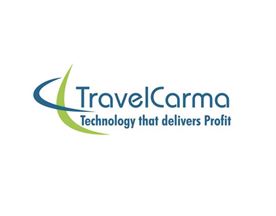
TravelCarma is a global travel technology brand, with...

FlightsLogic is a recognized leader in the travel...

Travelaps.com is an online travel portal solution for...
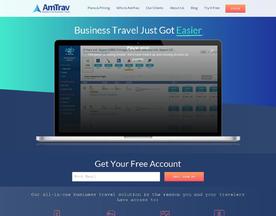
Whether you're the traveler, executive assistant, travel manager,...

Booking activities online should be as easy as...
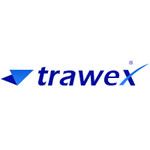
Trawex is a Travel Technology Company and we...
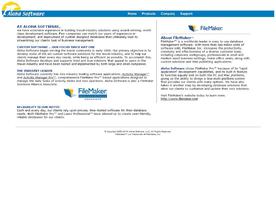
AT ALOHA SOFTWARE, we have extensive experience in...

Stealth Companies: What They Are and How They Operate
What are stealth companies? Stealth companies are startups that intentionally operate in secrecy to avoid public attention, often to protect their ideas and strategies until

Credit Card Machine for Small Business: Choose the Best Option
What is a credit card machine for small business? A credit card machine for small business processes card payments, enabling quick, secure transactions and sales

How Much Are Vending Machines? A Comprehensive Guide
How much are vending machines ? Vending machines cost between $1,000 to $10,000, depending on type and features. Factors include size, technology, and the type

How to Start a Construction Company: A Comprehensive Guide
How to start a construction company? Start a construction company by planning your business, securing permits, obtaining financing, acquiring tools, hiring skilled workers, and ensuring
Privacy Overview
How Do Travel Agencies Make Money? Revenue Models, Fees, And Ancillary Services Explained
December 13, 2023
Discover the various ways travel agencies generate income, from commission-based revenue models to , markups on travel products, ancillary services, and more. Explore how group travel, affiliate partnerships, and travel packages contribute to their revenue streams.
Commission-Based Revenue Model
Percentage-based commissions.
In the world of travel, one common revenue model is the commission-based approach. This means that travel agencies and agents earn a percentage-based commission on the sales they generate. Percentage-based commissions are a popular choice because they allow travel professionals to earn a fair and proportional amount based on the value of the transaction.
When it comes to percentage-based commissions, the rate can vary depending on the type of travel product or service being sold. For example, airlines may offer a certain commission percentage for flight bookings, while hotels may have a different rate for room reservations. This flexibility allows travel agencies to adapt their pricing structure and commission rates to different industry standards and market demands.
One advantage of percentage-based commissions is that they incentivize travel agents to focus on selling higher-value travel products. Since the commission is a percentage of the total price, agents have the potential to earn more when selling more expensive options. This encourages them to upsell and cross-sell additional services, such as room upgrades, travel insurance, or car rentals, which can enhance the overall customer experience and generate additional revenue.
Flat Fee Commissions
Another commission-based revenue model that travel agencies may adopt is the flat fee commission structure. In this approach, instead of earning a percentage of the total transaction value, travel agents receive a fixed amount for each booking or service they provide. This can be a flat fee per booking or a flat fee per service rendered.
Related: Disney Travel Agent Jobs: Overview, Benefits, And How To Become One
Flat fee commissions can be advantageous for both travel agencies and customers. For agencies, it provides a predictable and stable income stream, regardless of the total value of the transaction. It also simplifies the pricing structure, making it easier for agents to calculate their earnings and manage their financials.
From a customer’s perspective, flat fee can offer transparency and clarity. For example, if a travel agency charges a flat fee of $50 for booking a flight, the customer knows exactly how much they will be paying for the service. This can help build trust and provide a sense of value for the customer.
Override Commissions
Override commissions are a form of commission-based revenue model that allows travel agencies to earn additional income based on their performance or the performance of their team. In this model, travel agents receive a higher commission rate or bonus when they meet certain sales targets or achieve specific milestones.
Override commissions can be structured in various ways. Some travel agencies may offer tiered commission rates based on sales volume, where the commission percentage increases as the agent reaches higher sales targets. Others may provide one-time bonuses for surpassing certain performance benchmarks, such as booking a certain number of vacations within a specified timeframe.
Override commissions can be a powerful motivator for travel agents, as they provide an extra incentive to go above and beyond in their sales efforts. It encourages them to strive for excellence and actively seek out opportunities to generate more revenue for the agency. Furthermore, override commissions can foster healthy competition within the team, driving individual and collective performance.
Related: How Much Does Course Hero Cost? Pricing Plans And Fees Explained
To summarize, the commission-based revenue model in the travel industry offers various options for travel agencies and agents to earn income. Percentage-based commissions provide flexibility and incentivize selling higher-value products, while flat fee commissions offer simplicity and transparency. Override commissions add an extra layer of motivation and reward for achieving sales targets. By adopting the most suitable commission structure, travel agencies can optimize their revenue and provide value to their customers.
Service Fees
Consultation fees.
Looking to plan your dream vacation but feeling overwhelmed with all the options? Our expert travel consultants are here to help! We offer personalized consultation services to ensure that your travel plans are tailored to your specific needs and preferences. Whether you’re looking for a relaxing beach getaway or an adventurous trip to a remote destination, our consultants will guide you every step of the way.
Our consultation fees are designed to cover the time and expertise of our travel consultants. By charging a nominal fee for our consultation services, we can dedicate the necessary resources to provide you with the highest level of service. Rest assured that this fee is a small investment compared to the value you’ll receive in return – a perfectly planned vacation that exceeds your expectations.
During the consultation process, our travel consultants will take the time to understand your travel preferences, budget, and any special requirements you may have. They will research and recommend the best destinations, accommodations, and activities based on your individual preferences. Our goal is to ensure that every aspect of your trip is carefully curated to create unforgettable memories.
So, why choose our consultation services? By working with our experienced travel consultants, you’ll benefit from their extensive knowledge of popular destinations, insider tips, and access to exclusive deals and promotions. They can provide valuable insights and recommendations that you won’t find by simply searching online. Plus, our consultants are always available to answer any questions or address any concerns you may have before, during, and even after your trip.
Related: How To Make Coloring: Materials, Techniques, And Tips
Booking Fees
Once you’ve finalized your travel plans, it’s time to book your flights, accommodations, and activities. At our travel agency, we charge a small booking fee to cover the administrative costs associated with making these arrangements on your behalf. This fee ensures that all the necessary reservations are made accurately and efficiently, saving you time and hassle.
By paying a booking fee, you can enjoy the convenience of having our team take care of all the details for you. Our travel agents have access to a wide range of travel suppliers and can compare prices, availability, and options to find the best deals for you. They will handle all the necessary bookings, confirmations, and itinerary updates, leaving you with peace of mind and more time to focus on the excitement of your upcoming trip.
It’s important to note that the booking fee is separate from the actual costs of your travel arrangements. While the fee covers the service of booking and managing your reservations, the total cost of your trip will depend on various factors such as the destination, travel dates, accommodations, and additional services or activities you choose.
Cancellation Fees
Life is unpredictable, and sometimes plans change. We understand that unforeseen circumstances may require you to cancel or modify your travel arrangements. However, it’s important to keep in mind that cancellations often come with associated costs and fees. These fees are necessary to compensate for the time and effort our team has already invested in planning and securing your reservations.
Our cancellation fees are designed to be fair and reasonable, taking into account the specific terms and conditions set by airlines, hotels, and other travel suppliers. These fees help us cover the costs incurred due to cancellations, such as non-refundable deposits, penalties imposed by suppliers, and administrative expenses.
Related: Crafts To Make And Sell: Handmade Jewelry, Home Decor, Clothing, And More
Before making any cancellations, we encourage you to review the terms and conditions of your bookings and consult with our travel consultants. They can provide guidance on the cancellation policies of each travel supplier and help you explore any available options to minimize the impact of cancellation fees.
Remember, our priority is to ensure your satisfaction and provide you with the best possible service. We strive to find solutions that align with your needs and circumstances, even in challenging situations. Our dedicated team is here to support you throughout your travel journey and make the process as smooth as possible.
In summary, our service fees , including consultation fees, booking fees, and cancellation fees, enable us to deliver exceptional travel experiences tailored to your preferences. By investing in our services, you gain access to the expertise of our travel consultants, the convenience of hassle-free bookings, and the peace of mind that comes with knowing you have a dedicated team behind you every step of the way. So, why wait? Contact us today to start planning your next unforgettable adventure!
() Consultation fees () Booking fees (*) Cancellation fees
Markup on Travel Products
When it comes to selling travel products, travel agencies often employ a markup strategy to generate revenue. This involves adding a certain percentage or flat fee on top of the base price of the products they sell. By doing so, they are able to cover their operational costs and earn a profit. Let’s take a closer look at the different types of markups that travel agencies commonly apply to various travel products.
Related: How To Become A Disney Travel Agent: Requirements And Steps
Airline Ticket Markups
One of the most common travel products that travel agencies mark up is airline tickets. When you book a flight through a travel agency, you may notice that the price they offer is slightly higher than what you would find on the airline’s website. This is because travel agencies add a markup to the base fare of the ticket. The markup can vary depending on the agency and the specific ticket, but it is typically a percentage of the base fare.
For example, let’s say the base fare for a round-trip flight from New York to Los Angeles is $300. A travel agency may add a 10% markup, making the total price $330. This markup covers the agency’s costs and allows them to earn a profit from selling the ticket. It’s important to note that the markup does not necessarily mean that you are paying more for the same ticket. Travel agencies often have access to discounted fares or exclusive deals, so even with the markup, you may still be getting a good deal compared to booking directly with the airline.
Hotel Room Markups
In addition to airline tickets, travel agencies also apply markups to hotel room bookings. When you book a hotel through a travel agency, you may notice that the price they offer is higher than what you would find on the hotel’s website. This is because travel agencies add a markup to the base price of the room.
The markup for hotel rooms can vary depending on factors such as the location, the type of room, and the level of demand. Travel agencies typically negotiate special rates with hotels, allowing them to offer discounted prices to their customers. However, they still need to add a markup to cover their costs and make a profit.
For example, let’s say the base price for a standard room at a hotel is $100 per night. A travel agency may add a 20% markup, making the total price $120 per night. This markup allows the agency to cover their expenses and earn a profit from the booking. Again, it’s important to remember that even with the markup, you may still be getting a better deal compared to booking directly with the hotel.
Tour Package Markups
Another area where travel agencies apply markups is in the sale of tour packages. Tour packages typically include a combination of transportation, accommodation, and activities, all bundled together at a fixed price. Travel agencies create these packages by negotiating special rates with various suppliers and then adding a markup to cover their costs and make a profit.
The markup for tour packages can vary depending on the destination, the duration of the tour, and the level of customization. Travel agencies often work with local tour operators to create unique and immersive experiences for their customers. They carefully curate the itineraries, ensuring that they offer value for money while still allowing for a reasonable profit margin.
For example, let’s say a 7-day tour package to a popular tourist destination has a base price of $1000. A travel agency may add a 15% markup, making the total price $1150. This markup covers the agency’s expenses in organizing the tour, such as transportation, accommodation, and guides, as well as their profit.
Ancillary Services
When planning a trip, there are several ancillary services that can greatly enhance your travel experience. These services go beyond the basic transportation and accommodation needs and cater to specific requirements that travelers may have. In this section, we will explore three important ancillary services: travel insurance sales, visa and passport services, and car rental commissions.
Travel Insurance Sales
Travel insurance is an essential aspect of any trip, providing peace of mind and financial protection in case of unforeseen events. Whether you’re embarking on a short domestic getaway or a long international adventure, having travel insurance can save you from potential financial losses due to trip cancellations, medical emergencies, or lost luggage.
Travel insurance policies vary in coverage and price, catering to different types of travelers. Some policies may focus on medical coverage, while others may offer additional benefits like trip cancellation or interruption coverage. It’s important to carefully review the policy details, including coverage limits, exclusions, and claim procedures, to ensure that you choose the right plan for your specific needs.
When purchasing travel insurance, consider factors such as your destination, duration of the trip, and any activities you plan to engage in. Adventure sports, for example, may require additional coverage due to the higher risk involved. Additionally, if you have pre-existing medical conditions, make sure to disclose them to the insurance provider, as this may affect your coverage.
Travel agencies often partner with insurance providers to offer comprehensive travel insurance packages. By bundling your travel insurance with other services, you can enjoy cost savings and convenience. These packages may include options for both individual and group travelers.
So, before you embark on your next journey, take the time to explore the different travel insurance options available to you. It’s a small investment that can provide invaluable protection and peace of mind throughout your trip.
Visa and Passport Services
Obtaining the necessary visas and passports is an essential part of international travel. Navigating the complex visa requirements and application processes can be daunting, especially for first-time travelers or those visiting countries with strict entry regulations. This is where visa and passport services come in handy.
Visa and passport services providers specialize in assisting travelers with the application process, ensuring that all necessary documents are prepared correctly and submitted on time. They stay up to date with the latest visa regulations and requirements, saving you the time and effort of researching and gathering the necessary information yourself.
These services can help simplify the process and minimize the chances of errors or delays that could potentially disrupt your travel plans. They offer guidance on the specific visa types required for your destination, help with completing application forms, and provide assistance in gathering supporting documents.
Furthermore, visa and passport services providers can also offer expedited processing options for urgent travel situations. This can be particularly useful if you need to obtain a visa within a short timeframe or if you encounter unexpected changes to your travel plans.
While utilizing visa and passport services may incur additional fees, the convenience and peace of mind they offer can outweigh the costs. By entrusting the application process to experienced professionals, you can focus on other aspects of your trip preparation, knowing that your visa and passport requirements are being handled efficiently.
Car Rental Commissions
Car rentals provide travelers with the flexibility and convenience to explore their destinations at their own pace. Whether you’re traveling for business or leisure, renting a car can give you the freedom to visit off-the-beaten-path attractions and make spontaneous stops along the way.
Car rental commissions refer to the fees earned by travel agencies or online travel platforms when they facilitate car rental bookings for their customers. These commissions are usually a percentage of the rental cost and serve as a revenue stream for the agency or platform.
Travel agencies often negotiate special rates with car rental companies, allowing them to offer competitive prices and exclusive discounts to their customers. By partnering with multiple car rental providers, agencies can provide a wide range of options to suit different budgets and preferences.
When booking a rental car, it’s important to consider factors such as the size of the vehicle, the duration of the rental, and any additional services or features you may require. Some car rental companies offer add-ons like GPS navigation systems, child seats, or Wi-Fi connectivity, which can enhance your driving experience.
Additionally, it’s essential to familiarize yourself with the rental terms and conditions, including insurance coverage, mileage limitations, fuel policies, and any potential fees or penalties. This will help you avoid any surprises or misunderstandings when picking up or returning the rental car.
By utilizing the car rental services offered by travel agencies or online platforms, you can benefit from the expertise and convenience they provide. They can assist you in finding the best deals, comparing prices, and ensuring that your rental experience meets your expectations.
Group Travel and Corporate Accounts
Group travel and corporate accounts offer unique opportunities for discounts, streamlined management, and additional incentives. Whether you are planning a group trip or managing corporate travel, understanding the benefits and options available can make a significant difference in your overall experience.
Group Reservation Discounts
Planning a trip with a large group of people can be a daunting task, but it doesn’t have to be overwhelming. One of the advantages of group travel is the potential for group reservation discounts. Many hotels, airlines, and tour operators offer special rates or packages specifically designed for groups. These discounts can range from a percentage off the regular price to exclusive group rates that are significantly lower than individual bookings.
When booking accommodations for a group, it’s important to consider the specific needs and preferences of your group members. Some hotels offer group packages that include discounted room rates, complimentary breakfast, or even meeting room facilities. By taking advantage of these group reservation discounts, you can save money while ensuring that everyone in your group has a comfortable and enjoyable stay.
Corporate Travel Management Fees
Managing corporate travel can be a complex process, especially when dealing with multiple employees and various travel arrangements. That’s where corporate travel management fees come into play. Many companies choose to outsource their travel management to specialized agencies or consultants who can handle all aspects of corporate travel, including booking flights, arranging accommodations, and managing expenses.
These travel management services typically charge a fee for their expertise and assistance. However, the benefits of outsourcing travel management can outweigh the costs. By letting professionals handle the logistics of corporate travel, companies can save time, reduce administrative burdens, and ensure that their employees have a seamless travel experience. Additionally, travel management agencies often have access to exclusive discounts and perks, further optimizing travel expenses for corporate accounts.
Incentive Program Commissions
Incentive programs provide an extra layer of motivation and reward for both group travel and corporate accounts. These programs offer commissions or incentives to individuals or organizations that help promote and sell travel packages or services. For example, a travel agent who brings in a certain number of bookings for a specific destination may earn a commission or bonus.
Incentive program commissions can vary depending on the travel industry and the specific program. Some programs offer a percentage-based commission, while others may provide a flat fee for each booking. These incentives can be a win-win situation for everyone involved – the travel agent or organization earns extra income, and the travelers benefit from the expertise and recommendations of the agent.
By participating in incentive programs, travel agents and organizations can not only boost their revenue but also enhance their reputation and build stronger relationships with their clients. These programs create a sense of trust and loyalty between the agent and the traveler, fostering long-term partnerships and repeat business.
- Explore exclusive group reservation discounts for your next group trip.
- Optimize your corporate travel management with professional assistance.
- Earn commissions and incentives through participation in incentive programs.
Remember, when it comes to group travel and corporate accounts, the possibilities are endless, and the rewards are plentiful. Start exploring today and unlock a world of opportunities.
Affiliate Partnerships
Affiliate partnerships are a popular revenue model in the travel industry, allowing businesses to earn commissions by promoting and selling products and services from partner companies. By joining affiliate programs, travel agencies and online travel platforms can expand their offerings and generate additional income. Let’s take a closer look at some specific types of affiliate programs in the travel industry.
Hotel Affiliate Programs
Hotel affiliate programs are a great way for travel agencies and online platforms to earn commissions by promoting hotel bookings. As an affiliate partner, you can showcase a wide range of hotels to your customers, offering them various options that suit their preferences and budget. When a customer books a hotel through your affiliate link, you earn a commission based on the booking value.
Joining a hotel affiliate program opens up a world of possibilities. You can access a large inventory of hotels worldwide, ranging from budget-friendly options to luxurious resorts. This allows you to cater to different types of travelers and provide them with tailored accommodation choices.
To make the most of hotel affiliate programs, it’s important to choose partners that offer competitive commission rates and have a strong reputation in the industry. Additionally, consider the ease of integration and the level of support provided by the affiliate program. Some programs may provide you with promotional materials, such as banners and widgets, to help you effectively market the hotels to your audience.
Car Rental Affiliate Programs
Car rental affiliate programs provide travel agencies and online platforms with an opportunity to earn commissions by promoting car rental services. By partnering with reputable car rental companies, you can offer your customers convenient transportation options for their trips.
When you join a car rental affiliate program, you gain access to a wide selection of vehicles, ranging from compact cars to SUVs and luxury vehicles. This allows you to cater to the diverse needs of your customers, whether they’re looking for an economical option or a comfortable ride for their vacation.
As an affiliate partner, you can earn a commission for each successful car rental booking made through your affiliate link. This commission is typically a percentage of the rental cost or a fixed amount per booking.
To maximize your earnings from car rental affiliate programs, it’s important to consider factors such as the availability of inventory, competitive pricing, and the ease of booking process for your customers. Additionally, look for programs that provide reliable customer support and offer attractive commission rates.
Activity and Tour Affiliate Programs
Activity and tour affiliate programs allow travel agencies and online platforms to earn commissions by promoting various activities and tours to their customers. These programs give you the opportunity to offer unique experiences and add value to your customers’ travel itineraries.
As an affiliate partner, you can showcase a wide range of activities and tours, such as city tours, adventure activities, cultural experiences, and more. This allows your customers to explore their chosen destination in a more immersive and exciting way.
When a customer books an activity or tour through your affiliate link, you earn a commission based on the booking value. This commission can be a percentage of the total booking cost or a fixed amount.
To succeed in promoting activity and tour affiliate programs, it’s important to choose partners that offer a diverse range of experiences, cater to different interests and age groups, and provide reliable customer service. By offering unique and memorable activities, you can enhance your customers’ travel experiences and generate additional revenue.
Are you ready to take your travel experience to the next level? Explore our range of partner hotels, car rental services, and exciting activities and tours to create unforgettable memories on your next trip.
Hotel Affiliate Programs 1. Access a wide range of hotels worldwide, catering to different budgets and preferences. 2. Earn commissions by promoting hotel bookings through your affiliate link. 3. Choose reputable partners with competitive commission rates and strong industry reputation. 4. Consider ease of integration and support provided by the affiliate program.
Car Rental Affiliate Programs 1. Provide your customers with convenient transportation options by promoting car rental services. 2. Gain access to a diverse selection of vehicles, from economical options to luxury rides. 3. Earn commissions for successful car rental bookings made through your affiliate link. 4. Look for programs with reliable customer support and attractive commission rates.
Activity and Tour Affiliate Programs 1. Enhance your customers’ travel itineraries by offering unique experiences and tours. 2. Showcase a wide range of activities, catering to different interests and age groups. 3. Earn commissions for activity and tour bookings made through your affiliate link. 4. Choose partners that provide diverse experiences and reliable customer service.
Remember, by joining affiliate programs, you not only expand your offerings but also provide valuable options and experiences to your customers. So, why wait? Start exploring our affiliate partnerships today and unlock a world of possibilities for your next trip.
Travel Packages and Bundles
Vacationing is a delightful escape from the mundane routine of everyday life. It allows us to explore new destinations, experience different cultures, and create lasting memories. When it comes to planning a trip, many travelers seek convenience and affordability. This is where travel packages and bundles come into play. These comprehensive offerings provide a hassle-free way to enjoy a well-rounded vacation experience. Let’s take a closer look at the various types of travel packages and the commissions associated with them.
All-Inclusive Package Commissions
All-inclusive packages are a popular choice among travelers who yearn for an immersive vacation without the stress of planning every detail. These packages typically include accommodation, meals, transportation, and sometimes even activities and entertainment. Travel agencies often collaborate with resorts and hotels to curate such packages, ensuring a seamless experience for their customers.
From a commission perspective, travel agents earn a percentage-based commission on the total cost of the all-inclusive package. This commission is usually negotiated between the travel agency and the resort or hotel. The percentage can vary depending on factors such as the volume of bookings made by the agency or the exclusivity of the partnership.
For example, if a traveler books an all-inclusive package worth $2,000 through a travel agency, and the agreed commission rate is 10%, the agency would earn a commission of $200. This commission serves as a reward for the agency’s role in connecting the traveler with the perfect all-inclusive experience.
Cruise Package Commissions
Cruise vacations offer a unique way to explore multiple destinations while enjoying the luxuries and amenities of a floating resort. Cruise lines collaborate with travel agencies to create enticing packages that cater to different interests and budgets. These packages often include accommodation, meals, onboard activities, and access to various ports of call.
When it comes to commissions, cruise package bookings work slightly differently. Instead of a percentage-based commission, travel agents earn a flat fee commission for each cabin booked. This fee is determined by the cruise line and can vary depending on factors such as the length of the cruise, the cabin category, and the sailing date.
For instance, if a travel agent books a cruise package that includes four cabins, and the agreed flat fee commission per cabin is $100, the agency would earn a commission of $400. This commission rewards the agency for their expertise in matching the traveler with the perfect cruise experience.
Vacation Package Commissions
Vacation packages, also known as bundled vacations, combine different elements of a trip into a single, convenient booking. These packages often include flights, accommodation, and sometimes additional components such as car rentals or activities. The goal is to provide travelers with a seamless and cost-effective way to enjoy their vacation.
In terms of commissions, travel agents can earn both percentage-based and flat fee commissions on vacation packages. The commission structure may vary depending on the components included in the package and the agreements between the travel agency and the various service providers.
For example, if a traveler books a vacation package worth $3,000 through a travel agency, and the agreed commission rate is 7%, the agency would earn a commission of $210. Additionally, if the package includes a car rental, and the agreed flat fee commission for car rentals is $50, the agency would earn an additional $50. These commissions reflect the agency’s role in curating a comprehensive vacation experience for the traveler.
(Note: The information provided in this section is based on industry standards and practices. Commission rates and structures may vary between travel agencies and service providers. Please refer to your specific travel agency or service provider for accurate and up-to-date information.)
You may also like
- How Think Tanks Generate Revenue: Funding Sources And Strategies
- How Do Writers Make Money? Freelancing, Publishing, And More
- Ways Teachers Can Earn Money In The Summer – Maximize Skills And Supplemental Income
- How Does 72 Sold Make Money? Revenue Streams And Monetization Strategies
- How Do Sports Teams Make Money? Exploring Revenue Streams In The Sports Industry
- How Title Companies Make Money: Revenue Sources And Factors
- How Does American Express Make Money? Revenue Sources And Partnerships Explained
- How Venmo Makes Money: Transaction, Transfer, Card, And Merchant Fees
- How Do UPS Stores Make Money? Revenue Streams, Partnerships, And Upselling Opportunities
- How Do They Make Money? Exploring Revenue Streams And Monetization Strategies

Susan B. Cook is a passionate advocate for financial literacy and empowerment. With her extensive knowledge in budgeting, saving, and creating multiple income streams, she provides valuable insights and practical tips to help readers take control of their financial lives.
Leave a Comment Cancel reply
Save my name, email, and website in this browser for the next time I comment.
It's Official, Our Leads Program and Booking Portal With Over 750,000 Hotels Has Launched For Our Agents. Learn More
Travel Agent Resources
How do travel agents make money.
- X (Twitter)
By Courtney Eisen
February 22, 2024
So, you're considering a career as a travel agent and wondering how you can actually make money. What are the options available to you for maximizing your revenue? In this article, I will delve into the good, the bad, and the ugly of how travel agents earn their income. Please note that this article does not cover travel agents in salaried positions, as that is a completely different scenario. If you are seeking information on that topic, I recommend consulting resources like Glass Door for location and company-specific data. Furthermore, this article offers a unique perspective on earnings compared to what you might find elsewhere online. Our agents, in particular, earn exponentially more than the average, so this is not your typical or "average" perspective. Now that we have clarified these points let's dive in!
A brief history lesson.
If you have been researching this topic, you have likely come across various resources discussing the milestones and challenges faced by travel agents, which eventually led to the introduction of charging fees. These challenging times for travel agents began in the 90s when airlines became less supportive of the travel agent community. With the emergence of Online Travel Agencies (OTAs) like Expedia and Priceline, airlines relied less on travel agents and significantly reduced or even eliminated commission-earning opportunities. The struggles continued with major world events such as 9/11 and the COVID-19 pandemic, which caused turmoil among travelers. However, it is worth noting that agencies like ours have chosen not to adhere to outdated philosophies, further disrupting the industry for standard agents and agencies. These difficulties prompted agents to seek additional compensation for their time and explore ways to diversify their earnings. The most common solution that emerged was the introduction of fees. In fact, if you read other articles on this topic, you will find that fees are often mentioned and encouraged. However, at our agency, we take a different approach. We not only discourage charging fees but actually have a company-wide ban on them. Any agent caught charging a fee to a client is promptly removed from our agency. Why is that?
Suggested Article: How Much do Travel Agents Make?
First and foremost, we prioritize training our agents to be efficient. We teach them how to create well-thought-out, high-quality itineraries quickly, typically within 15-45 minutes. Instead of recreating the hotel's website in the form of a PDF, we utilize a more concise bullet-point format with links to the different properties. We also provide training on lead qualification. While it is true that some "tire kickers" may still approach us, the minimal time investment allows our agents to avoid losing sleep over potential "wasted time."
So why are we so strongly against charging fees? Many agents become upset when I explain this crucial point. In fact, we have been banned from numerous agent groups for expressing our views. Here's the truth: charging fees will ultimately result in lower earnings. To illustrate this, let's look at the numbers. Most agents do not earn substantial amounts of money, even when considering the highest estimates for experienced full-time agents, which still fall below six figures. On the other hand, our founder earns seven figures without charging fees. Perhaps we are onto something? While we do not accept existing travel agents, our founder, David, mentored a peer during his time at Andavo Travel. Under David's guidance, they stopped charging fees and made a few other process changes, resulting in a tenfold increase in earnings—from $25,000 to $250,000 per year. Why is that? Well, let's use common sense for a moment. Charging a fee makes you less desirable, less accessible, and more likely to lose clients to agencies like ours or booking sites. This brings us to the core of how travel agents truly make money—commissions.
Commissions: The Real Path to Earning
Yes, commissions are the primary source of income for agents. On average, agents earn between 10% and 20%, with the average commission rate hovering around 13%, on what they sell to clients. Consider a small booking of $5,000, for example. This would result in a minimum commission of $500. Completing such a booking within 15-30 minutes translates to an hourly income of $1,000 to $2,000. How is that not enough? Why would you risk losing that income by charging a fee? The issue lies in being a slow agent, which significantly reduces your earnings per hour. Now, imagine handling an ultra-luxury booking where the client spends $10,000 or more per night or a group booking with hundreds of rooms. In these cases, you have the potential to earn tens of thousands of dollars per hour, propelling you to six or seven figures in earnings much faster. While speed is important, here are some additional tips for increasing your income as an agent.
Suggested Article: Travel Agent Commissions
Be Available 24/7/365
You might be surprised to learn that many travel agents, even those who position themselves as industry insiders and experts, adhere to strict office hours. Remember the OTAs I mentioned earlier, such as Expedia? They offer immediate satisfaction to customers. Agents with limited availability cannot provide the same level of instant gratification and are, therefore, less desirable. I have encountered agents on forums who schedule new clients a week after their initial contact. During that week, clients may decide to handle the booking themselves as they witness flight prices fluctuating, usually increasing.
Suggested Article: Why You Should Be a 24 Hour Travel Agent
If you truly want to maximize your earnings as a travel agent, take this advice to heart: do not follow the path of other agents. Be modern, be smart, and be available. You may need to step out of a movie theater to assist a client, but the inconvenience can result in hundreds or even thousands of dollars. Do not keep your clients waiting. Be there for them when they want or need you, and you will become an important and reliable figure in their lives, ensuring their return time and time again.
Know the Markets
To understand how much agents earn per hour, we must consider efficiency. Familiarize yourself with your network and identify the markets that are important to both potential and existing clients. If you frequently handle trips to Mexico, for instance, you should have a solid understanding of the best properties for families, budget-seekers, luxury travelers, and adults only, among others. Having a general knowledge of hotels in popular markets will not only save you time but also provide your clients with a better and faster experience. The ability to quickly match clients with suitable properties is crucial for increasing client satisfaction and earnings per hour. However, you cannot achieve this without the next item on our list—listening to your clients!
Listen to Your Clients
Allowing your clients to express themselves will ultimately lead to higher earnings. How? Well, people will tell you exactly what they want if you give them the chance. The more you let your clients speak, the better you will understand their priorities and true desires. This understanding enables you to transform their vision into reality—a rare and beautiful achievement in the realm of travel. Once clients realize that you have turned their dreams into reality, they will return to you for their next trip. In a world filled with an overwhelming amount of information, where travelers grow weary of sifting through fake reviews, doctored images, and endless listings, you become a human-computer of sorts. You listen to your clients and swiftly match them with the perfect property in a matter of minutes. Recognizing this as your ultimate goal will significantly increase your income.
Ask for Referrals
This brings us back to the beginning. Travel agents attempted to diversify their income streams by charging fees, but this approach does not make sense in reality. To earn more money and better weather unexpected global events, it is more logical to diversify your client base. Achieving this requires actively seeking referrals. The travel industry thrives on word-of-mouth marketing, so gaining 2-3 new clients from existing satisfied clients is the most effective way to rapidly increase your earnings. Eventually, if you consistently deliver excellent service, you will be referred to ultra-high-net-worth individuals, where substantial profits can be made. We have witnessed bookings as high as $600,000 for leisure trips, resulting in a $60,000 commission from a single booking. I hope you see where I am going with this. When you have a diverse set of clients, you will be able to weather any storm. Guess who still travels during a financial crisis? Wealthy people. Need a boost in April? Your middle-class clients will be booking trips when they get their tax returns. The correct response to keeping earnings steady is not "diversifying" your income through fees but diversifying the markets you serve, which can also be done through the next step -- sell everything.
Sell Anything and Everything
You would be surprised how many agents limit their earnings by keeping their services in a niche. Some agents only sell Disney, Royal Caribbean, and Sandals. I have personally met agents who only sell international bookings. There are so many odd niche agents out there, and every time I see someone following this strategy, usually encouraged by their host agency, I ask myself, "Why?" Why would you want to pigeonhole yourself into one space? If you have a client, why not be the go to for all of their travel needs? It seems like common sense, but so many hosts encourage specialization. If you really want to maximize your income, you will find yourself booking a Royal Caribbean cruise one day and a Rosewood Hotel the next. Make your name synonymous with travel. Be the go-to for travel. Don't brand yourself as a Disney or Cruise agent. Do it all.
In Conclusion: Ignore the Noise and Make Money
To sum up, if your goal is to earn six or seven figures, joining a host agency like ours that genuinely cares about your ability to earn commissions is crucial. Our travel agent training is free, and we cover your errors and omissions insurance and licensing fees. This means that we actually incur a loss for each new recruit until they start generating sales. We will not teach you outdated and inefficient "best practices," such as charging fees or making 20-page PDFs. Instead, we will provide honest guidance, resources, and mentorship to help you understand how to truly make money as a travel agent. It is not a get-rich-quick scheme; it requires hard work and the ability to ignore advice from agents who do not earn significant incomes each year.
Suggested Article: How Do Travel Agents Get Paid?
If you do not aspire to earn much, then by all means, follow the resources that advocate for charging fees. However, if you want to maximize your earnings, join a host agency like ours that is willing to invest in your success.

More Resources

Why You Should Be a 24 Hour Travel Agent

How to Start a Travel Agency From Home
- Skip to content

Travefy Academy
Win and retain more business.
5 Ways a Travel Agent Can Make Money
By Travefy Academy
When asking how a travel agent can make money, the obvious and simple answer is that they sell travel! But in this article, we want to expand on what a travel agent can sell instead of focusing on high-level thinking of selling flight tickets or booking hotels. There’s so much more a travel agent can target and sell that the possibilities are almost endless in creating revenue as a travel business.
Commissions
The most important way that a travel agent earns money is by receiving a commission on travel sold. This can include a commission from booking flights, accommodation, tours, car rentals, entertainment tickets, insurance, and so much more. An agent will always earn a commission on selling travel but commission fees can differ based on the supplier they are purchasing from and if they are affiliated with a consortium or host agency, who will take a percentage of the commission as well.
Travel Agents can also earn more commission by selling add-ons such as additional days of travel, tours, and trip insurance. A helpful example to explain what a commission could look like is if a travel agent sold a 5 night, 6-day cruise to a couple traveling. The travel agent would earn the cruise commission but could also earn more if the travelers decide to purchase tours from the cruise line and trip insurance as well. Maybe they end up staying an extra night at the final destination too, which in return will add up in commission for the agent.
Service Fees
In addition to receiving commissions when booking travel, many travel agents will also have a set service fee they charge to all clients. This can look different for all travel agents. An agent might have a service fee they charge (ranging from $100-$250+) for all trips or offer a fee just to help plan the travel.
Pro Tip: Not charging a fee? Check out our article on charging fees here to see if charging a fee is right for you.
Instead of booking all of the travel for a client, travel agents can also charge clients just to do the planning and itinerary building and let the client book travel on their own. Travel agents might charge a flat “planning” fee and then just hand over the travel plans to the client once they are finished and that’s all they will do.
Group Tours
Planning group tours as a travel agent can be a popular money avenue because of the large number of travelers at one time. A lot of travel agents will specialize in group travel whether that is planning family reunions, destination weddings, hobby travel, sports travel, you name it!
As an example, a travel agent might book 50 cabins on a cruise and work on filling each cabin. They might focus on a niche like a certain hobby or event that would help encourage many people to book a cruise at the same time. That way, the agent earns a commission on 50 cabins instead of 1 when a traveler books a one-off trip.
There are a lot of agents who will only do group travel since the value of earning a large income is so high. Some agents may even focus on planning 1-2+ large travel groups a year and earn their yearly revenue just by that alone. The possibilities are truly endless when it comes to group travel which brings us into our next way of making money: Niche Travel. Combining a niche with group travel can be a great way to earn a lot of money from one trip.
Niche Travel
Another popular income source for travel agents is focusing on a niche so that they can create group trips or become a go-to source when a traveler is looking for a particular travel experience. Many agents even have two businesses under one umbrella where they will sell travel to anywhere in the world but also have a side that is dedicated to a niche. As an example, a travel agent might sell a lot of resort packages and cruises but then have a second business just for wine and food travel.
Even though there are hundreds of different niche travel options, here are a few to give you an idea of what niche travel can look like:
- “Surprise” Travel: This has been a growing sensation for many travelers. Surprise Travel is when a travel agent books an entire trip for someone but the traveler doesn’t know where they are going until the day before or when they get to the airport!
- Sports Travel: An agent might rent a charter bus and find 50 people who are interested in traveling to a sports game and book hotels, activities, and transportation for the group.
- Destination Weddings and Honeymoons: If weddings and honeymoons are your jam, this is a great option for you!
- Disney: Many agents focus solely on Disney experiences and these agents live and breathe it. They know all the in’s and out’s of each park and can help customize your trip to fit your families needs.
- Special Needs: Focusing on a demographic can help when choosing a niche. Someone who focuses on special needs travel will be a pro at knowing what to look for when booking, what types of accommodation might need to be made, where to rent equipment, and so much more. For more information on this type of niche, check out our webinar here .
Above are just a few examples but there are so many different niches available and many that haven’t even been thought of yet. If you’re interested in niche travel, ask yourself where your passion lies and see what types of travel experiences can come from that.
Corporate Travel
Focusing on corporate travel is another option for your travel business. Instead of booking leisure travel, some agents will only work with corporate clients. This can be a great option because you will have your main clients and know that you will continuously be booking travel just for them. Booking corporate travel mostly includes booking flights, accommodation, and rental cars but since you know that the quantity is greater, you can end up making great revenue from commissions in return. Corporate travel can also include booking incentive travel or group retreats and events.
How Does a Travel Agency Make Money?
- Small Business
- Money & Debt
- Making Money
- ')" data-event="social share" data-info="Pinterest" aria-label="Share on Pinterest">
- ')" data-event="social share" data-info="Reddit" aria-label="Share on Reddit">
- ')" data-event="social share" data-info="Flipboard" aria-label="Share on Flipboard">
How to Sell Through Orbitz
How to increase sales with travel incentives, strategic objectives for an airport's marketing department.
- Definition of a Commission Agent
- Fast Food Industry: The Bargaining Power of Suppliers
Travel agencies can be small, independent operations or large, nationwide chains responsible for packaging trips to millions of Americans. Helpful, friendly travel agents provide customers with expertise and guidance when booking a trip of any kind at little to no cost to the traveller.
So how do travel agencies make money? In return for their services, travel agencies receive commissions from suppliers who typically make payment after the trip has concluded successfully. Standard industry rates of reimbursement apply. The best travel agencies to work for offer training, ongoing support, high earning potential and work-from-home opportunities, according to Indeed Career Guide .
Hotel Suppliers
Independent hotels and other accommodation suppliers each have individual deals or contracts with travel companies and agencies. These deals can depend on company policy or on the power of a given agency to deliver customers. In the case of hotel chains, the rate of commission is typically established for all agencies and travel companies who can then choose to sign on or not if the deal is sufficiently profitable for them.
The standard industry rate is in the 10 percent range, but special promotions such as Las Vegas wedding packages, can offer up to 33 percent commission, according to Hilton Hotels . This amount is deducted from the supplier's bottom line after payment is received. It is then sent to the agency in a monthly statement after the traveler has returned from her trip.
Tours and Car Rentals
Local tours, rental cars and transfers are another profitable part of the travel agent's portfolio. Since the majority of tour operators and transfer companies are small businesses located in a single region, they are more willing to deal with successful agencies who can send them big numbers of tourists.
Rental-car companies, on the other hand, can be major players who set the commission rate for all agencies across the board. If a particular agency has a preferred rental-car company however, the rate may be more geared toward agency profit than the others. The standard rate is around 5 percent, according to Hertz , but the rate may rise higher depending on the specialty of the agency and any partnerships which may develop.
Airline Flights
Airline tickets are the least profitable part of the trip for a travel agent. Agents are given a set rate of commission by the airline at the start of each year. This rate is typically low and without room for negotiation. Since the majority of travel requires some type of flight to be possible, the airlines are in a position of power and they use that power to keep as much of the profit as possible. Although the cost of the flight can fluctuate and may make up a large chunk of the overall trip cost, it does not bring in high profits for the travel agency.
Travel Insurance
Travel insurance is one of the most profitable items on the travel agent's menu that boosts the travel agency's profit margin. It is relatively low-cost and low-risk but comes with a premium price tag for the traveler. Since travel insurance has nothing to do with the trip itself, but is more of an add-on. Agencies typically reward agents for selling clients on the benefits of insurance coverage.
Insurance commission paid is higher than that for hotels or other travel necessities. Travel insurance is also the one item on the trip itinerary that can easily be bargained down so customers often do some haggling to bring the overall cost of a trip down.
Partnership Marketing
Large agencies or chains may develop marketing deals with suppliers who wish to gain exposure to the United States market through brochures, TV and radio ads, trade shows and other advertising avenues. In exchange for a preferred placement, the promotion of a product line such as a group of Caribbean resorts, or a joint ad, the agency or chain may receive a one-time payment as the result of a marketing plan. While these funds are meant to cover the expense of the ads and peripherals, they also amount to a profit for the agency.
- Hilton Hotels: Promotions and Incentives
- Hertz: Travel Agency Commission Policy
- Indeed Career Guide: Sixteen Travel Agent Companies With High-Paying Remote Jobs
Robert Morello has an extensive travel, marketing and business background. He graduated with a Bachelor of Arts from Columbia University in 2002 and has worked in travel as a guide, corporate senior marketing and product manager and travel consultant/expert. Morello is a professional writer and adjunct professor of travel and tourism.
Related Articles
How do travel agency fees work, how to start a travel business from home, sources of travel agency revenue, sales strategies for hotels, how to calculate advertising agency commission, advertising agency fee structures, how to start a talent booking agency, gross vs. net costs in advertising, how to open a travel agent business, most popular.
- 1 How Do Travel Agency Fees Work?
- 2 How to Start a Travel Business From Home
- 3 Sources of Travel Agency Revenue
- 4 Sales Strategies for Hotels
- Host Agencies
- Accelerator Course
- Travel Jobs
- Travel Agent Chatter
- Etiquette & Rules
- Privacy Policy
How Much Do Travel Agents Make? Travel Agent Salary 2024
There's a whoooole lot to consider when looking at how much travel agents make. Beyond the more obvious factors (like working hours or having more experience), here are a few things that impact a travel agent's income.
- Employee vs. Self-employed? The vast majority of leisure travel agents are now entrepreneurs (most of whom align with a host agency ). This is a change from the old-school days when most travel agents were storefront agency employees. Why does this matter? Because there are going to be a lot more factors that impact income for those who run their own business compared to employees who clock in and out of a 9 to 5.
- Travel Agent Niche: A corporate advisor will typically earn a higher salary than leisure/vacation travel agents. However, within the leisure sector, niche makes a big difference. Adventure and luxury travel, for example, earned higher averages than family and Disney travel in some of HAR's more recent research reports .
- Time Investment: Self employed travel advisors who set their own schedules work varied hours. Time investment also has a huge impact on earning potential.
- Industry Experience: Experience level also plays a large role in travel advisor income, with travel advisors typically making more as they get a foothold in the industry.
The thing with travel advisors in the 21st century is that there is no "norm." Organizations outside the industry that report on travel agent salaries are ill-equipped to offer a nuanced picture. The Bureau of Labor and Statistics , for example, doesn't include self-employed travel advisors in their data, only employees.
Here's the thing though. Being self employed is, by far, the most popular pathway to becoming a travel agent .
Organizations reporting on travel agent salaries outside the travel industry aren’t aware of the nuances of our field.
So that’s why we’re here! :)
As a company that focuses solely on travel advisors, we’ll break down some of those nuances so you can get a more accurate picture of travel agent salaries. I know you're curious to know if travel agents make good money but it not quite as simple as yes or no.
We’re going to dig into some in-house data to break down travel agent salaries and earnings into digestible categories.
Here’s what you can expect:
- ALL travel agents (employees and self-employed: hosted and independent)
- Self-employed travel agents (includes hosted travel agents and independently accredited agents).
- Travel agent employees (advisors who get 'ye old W2, employed by a travel agency)
- Corporate travel advisor employees and corporate travel managers (employees who book corporate travel)
So take a seat. Pour a waterfall of melted butter on a mountain of popcorn and settle in!
How Much Do Travel Agents Make? All of 'Em.
Phocuswright's 2023 US Travel Agency Landscape offered a great overview of current travel advisor income. They offer a big picture look at how much all advisors earn based on experience.
Here's the key takeaways:
- Overall, 39% of advisors earned less than $25,000 per year. However, 80% of advisors in the lowest income bracket had been selling travel for two years or less.
- Experienced agents, typically earned $50,000+ annually and 25% of experienced travel agents earned $100,000+ annually.
In summary?Experience has a big impact on income! That's in large part due to commissions not being paid until after a client travels or in the case of cruises, 30-60 days prior to departure. It makes the first few years tough if you depend on commissions.
But don't get discouraged if you're just starting out! Travel agents can make good money but it can take some time to build up your client base and to start to see the money coming in.
Here's more on how much self-employed travel advisor earn their first few years.

What does the Bureau of Labor and Statistics Say About Travel Agent Salaries?
The Bureau of Labor and Statistics (BLS) offers a somewhat different vantage point. While Phocuswright's number reflect primarily home-based independent advisors, BLS data predominantly profiles travel advisor employees.
The BLS data has shown a 26% increase in travel advisor salaries over the past decade. The graph below illustrates how it's increased over time.

The BLS’ latest numbers (2024) reported an average travel agent salary of $50,040 1 .
Here’s a few things to keep in mind about the BLS numbers:
- BLS only profiles employees. The BLS site sums it up here: “Estimates do not include self-employed workers.” Here at HAR, we survey full-time and part-time self-employed travel agents in addition to employees.
- BLS only looks at full-time travel agents. Here's how they crunch their numbers, "Annual wages have been calculated by multiplying the hourly mean wage by a 'year-round, full-time' hours." 2
Alright, so we took a look at the BLS data, which you now know skews heavily towards employees. Because of that, it doesn’t reflect the true industry landscape where the majority of travel advisors are self-employed.
So let's dive in to see if self-employed travel agents make good money!
What does HAR's research say about how much ALL travel agents make?
Host Agency Reviews' survey respondents were 95% self-employed and 5% employees.
Here's a birds-eye view of average travel agent income of our survey respondents. We break it down into full-time advisors and all advisors (both FT and PT).

When homing in on experienced and full-time advisors, results from HAR’s 2023 survey clock in higher than the BLS number, with data indicating that full-time travel advisors earned a $56,632 a year on average.
Another angle you can figure out how much travel agents make is by looking at how much travel agents make per booking . We've got a whole article on the subject but the key takeaway is about 10% per booking, with the average booking size being $4,375 in 2023. 3
Since it’s hard to get accurate numbers on how much a travel agent makes when we look at everyone—corporate/leisure, employee/self-employed—next up, we’ll take a detailed look at average travel agent salaries for:
- self-employed advisors,
- travel advisor employees,
- travel managers,
- and corporate travel advisors.
Gotta cover all our bases! 😀
How Much Do Travel Agents Make? Self-Employed Travel Agents
Self-employed travel advisors are those who run their own businesses (rather than work as an employee). I’m going to throw some industry lingo at you now. Are you ready?
The self-employed category contains two primary segments of advisors:
- Hosted advisors (those who use another agency’s accreditation number, called a host agency ) and
- Independently accredited travel advisors (those who have their own travel accreditation
Here’s the big picture you need to know about self-employed advisors. Over time, the number of self-employed advisors has been growing exponentially, while the number of storefront travel agencies has decreased. In particular, hosted agencies have become the leading path to bringing new talent to the travel agency distribution channel.
So how much do self-employed travel agents make?
In our 2023 travel advisor research reports , full-time hosted advisors with 3+ years of experience earned $60,146 on average and their independently-accredited counterparts earned $76,252.
Why the income drop for hosted advisors?I chat more on that in this Masters in Travel podcast episode .
Here's the short story: we know two big factors that influences how much a travel agent makes is their experience level and if they work full time or part time. Hosted advisors are more likely to be newer to the industry and to work part time. The median years of experience for hosted advisors was 5 years , compared to 18 years for independent travel agents.
Owner Deductions (and how it impacts how much self-employed travel agents make)
I want to bring up one last thing that complicates things when it comes to self-employed travel agent salaries. Because why not? You've already read this far! 😊
When we're talking about income for self-employed agents, income/salary numbers can be artificially deflated.
Why? Three things:
- Business owners may not be reporting all of their income. Since cash transactions leave no paper trail for the IRS to follow, many small businesses won't report cash transactions and in not doing so, they lower the income/earnings they report to the government.
- Business owners get write-offs. I can write off my office. I can write off my work trips. I can write off my work phone and meals with colleagues where I discuss business. When I do that, it lowers what I report for my taxable income (ahem, salary) to the IRS. Not only that, but travel agents will vary WILDLY in terms of how much of their income they write off. (Take a look at what travel expenses you can (and can't) write off .)
- Salary and income are separate things for some business structures. Depending on the agency's business structure, the owner may pay themselves a salary (say $45k) but the income of the company may actually be much higher. All the IRS requires with these S Corp business structures is that the owner pays themselves a “reasonable” salary. ( Learn about the different travel agency business structures .)
So, keep those things in mind when you're looking at earning potential.
How Much Do Travel Agents Make? Travel Agent Employees Only
This section on employee travel agent salary is going to give you numbers that will be close to what you can expect if you get hired on at an agency. Travel agent employee salaries have less variance when compared to self-employed travel agents.
For the majority of travel advisor employees, income is not dependent on commissions alone.
The set salary of a travel agent employee offers stability not afforded to self-employed advisors. Additionally, employees also often receive benefits and are not subject to the added complexity and expense of paying business taxes .
When looking at travel advisor employees only, HAR’s salary data lands much closer to what the BLS reports. In HAR’s 2023 survey, salary only employees made $50,792. But if you ever wondered if travel agents make good money, they def can! Full-time travel agent employees earning salary and commission brought home $88,909 . 😲
Employee compensation models play a substantial role when it comes to how much a travel agent employee makes. The graph below takes a look at the average travel agent income of the three most common compensation models.

Lesson on that? If you're looking for an employee position at a travel agency, find one that pays salary, plus commission! 😀
How Much Do Travel Agents Make? Corporate Employees & Travel Managers
Corporate travel advisors.
Corporate travel advisors (those who book travel for corporations) typically earn more than those who sell leisure travel. Below offers a look at corporate travel advisor income compared to leisure travel advisor income (among FT advisors).
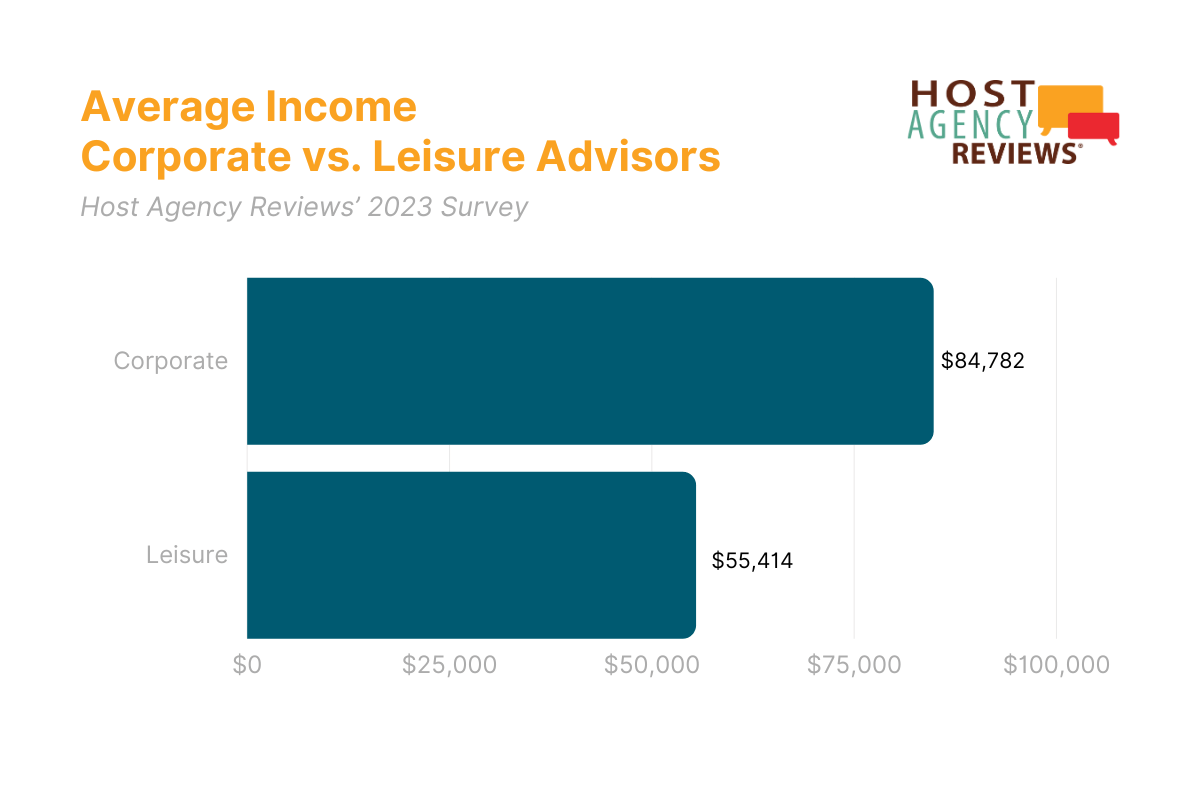
Do you have an interest in becoming a Corporate Travel Agent? You can sink your teeth into a few juicy tidbits of info here:
- HAR’s article, Breaking into corporate travel
- Our podcast interview (below) with corporate agent Karen Hurlbut:
- A podcast interview with entertainment travel specialist Molly Williams who moves bands around the world:
Travel Managers
Looking ahead on the corporate travel agent career trajectory, Travel Manager/Supervisory positions start with a much higher baseline.
Business Travel News (BTN) report on Travel Managers/Supervisors' salary cover people working for corporate entities as an in-house advisor (not working for a travel agency). The overall average for a corporate travel manager salary registered at $128,439.
Nice, huh?! You can make some pretty good money as a corporate travel agent. :)
Beyond Travel Agent Salaries, Why Advisors Love Their Jobs
We've looked at travel agent salaries from a whole bunch of different perspectives. You made it through the spinning, twirling madness of data acrobats.
HAR’s research reports offer a ton of info on travel agent salaries. But ultimately, how much you make as a travel agent depends on a lot of factors, including:
- what type of advisor you are (corporate, leisure, employee, self-employed, etc.),
- what type of travel you sell,
- your experience level,
- hours worked,
- and all that other fun stuff!
While naming one number for a travel agent salary is impossible, there is one thing that is consistent among all the surveys: the majority of travel advisors are happy with their career choice.
HAR’s 2023 Hosted Travel Advisor Survey indicated that 95% of advisors would choose to become a travel advisor again if given the choice.
Corporate travel managers taking BTN’s survey were a bit more lukewarm in response to travel agent income satisfaction. 48% of travel managers reported their earnings were equitable, 12% felt “well compensated,” and 41% felt their salary was “low for responsibilities.”

And here’s the thing to remember about being in the travel industry. It goes beyond dollars.
Many advisors report that the primary benefit of working in travel is rooted in a personal passion for travel and the ability to share their love of travel with others.
Additionally, advisors often have access to great travel experiences they may not otherwise via familiarization trips or travel advisor rates for those who reach sales thresholds or meet requirements.
In general, positions in travel may offer a lower salary than other industries. But here’s the kicker, occupations in other industries don't include travel benefits and working in travel !
Interested in Becoming an Advisor? Here’s Where to Start
This leads us to the question of what type of travel advisor career you’d like to pursue.
Do you want to become a self-employed travel advisor so you can have the creativity to book the type of travel you love and the flexibility to be your own boss? Or do you want the structure of 9-5 with benefits and the income security of a travel advisor employee?
Employees at a travel agency may have a salary cap if their compensation model is strictly hourly/salary (about 42% of employees), but for those who own their own business, the sky's the limit. Plus, it's hard to put a price on visiting beautiful places, touring the newest properties , and the freedom and flexibility to work anywhere that goes with owning your own home-based travel agency.
How do you decide what type of travel you want to sell? Do you want to do leisure or corporate? If you do leisure, which types of travel agent niches are the most lucrative? If you go the corporate route, how do you break into booking business travel ?
💕 If you're thinking of joining the industry, here are a few resources you're gonna love: 💕
- Starting a travel agency from home
- Free 15-page travel agency business plan template
- HAR's nifty course on how to start a travel agency!

We’re here to help! If you have questions about what route to take or how to get started, give us a holler in the comments or reach out to us at [email protected] .
- https://www.bls.gov/oes/current/oes413041.htm ↩
- Source: https://www.bls.gov/oes/current/oes413041.htm ↩
- Source: Hosted Advisor Report 2023 ↩
About the Author

Steph grew up in the travel industry, helping on and off with her mom's homebased travel agency. She has worked with thousands of agents in her role as a former host agency director before leaving in 2012 to start HAR. She's insatiably curious, loves her pups Fennec and Orion, and -- in case you haven't noticed -- is pretty quirky and free-spirited.
If you’re looking for Steph, she leaves a trace where ever she goes! You can find her on Facebook, Instagram, LinkedIn (her fav) and Pinterest as 'iamstephly'. 🙂 You can also catch her on her Substack, Bumblin' Around, where she writes on things outside the world of HAR.

- Still Exploring
- Travel Agent Basics
A Look at How Travel Agents Make Money
The average travel agent earns between $47,000 and $55,000 annually.
Most travel agents’ income is made up of their salary, but they also earn from commissions, service fees, and markups.
Generally, the more experienced and niche a travel agent is, the higher the commission and other fees they charge.
They are also multiple types of travel agents, with some specializing in leisure travel, others in business travel, and some offer niche travel services, like adventure or eco-tourism.
Table of Contents
- 1.1 1. Leisure Travel Agents
- 1.2 2. Business Travel Agents
- 1.3 3. Niche Travel Agents
- 2 How Much Commission Travel Agents Make on Flights
- 3.1 1. Markups
- 3.2 2. Service fees
- 3.3 3. Package deals
- 3.4 4. Incentives
- 4.1 1. Commissions
- 4.2 2. Service Fees
- 4.3 3. Salaries
- 5 Travel Agent Commission Rates
- 6 Travel Agents Make Good Money
- 7 Travel Agents Don’t Expect Tips
- 8 Who Even Uses Travel Agents Anymore?
3 Different Types of Travel Agents
These are the three main types of travel agents.
1. Leisure Travel Agents
Leisure travel agents specialize in vacation and leisure planning for both individuals and families.
They can book flight tickets and hotels and arrange tours and activities for travelers.
2. Business Travel Agents
Business travel agents specialize in business travel for businesses and their employees.
Their services include booking flight tickets, hotel rooms and coordinating ground transportation.
3. Niche Travel Agents
Niche travel agents specialize in niche types of traveling, like adventure travel or eco-tourism.
Each niche travel agent specializes in a specific niche, and use their niche travel knowledge to plan customized trips for niche travelers.
How Much Commission Travel Agents Make on Flights
Travel agents commonly receive commissions for selling travel products and services.
For flights, a travel agent can make 5% commission on domestic flights, and 10-20% for international flights.
For instance, a travel agent could sell an international roundtrip flight for $1,000. And if their commission rate is 15%, they’ll receive $150 for the sale.
When it comes to cruises, travel agents can expect to make approximately 10-15% of the pre-tax price on a cruise.
4 Ways Travel Agents Make Money
Besides commission, travel agents make their money through the following four ways.
Travel agents sometimes add a markup to their travel products and services to earn extra income.
For instance, a travel agent could add a $10 markup to a hotel room that costs $90.
They’ll charge the traveler $100 total for the hotel room, with the $10 being their fee for finding and booking the room.
The exact markup an agent charges depends on the products they’re selling and their arrangement with their supplier.
The most experienced travel agents naturally have the highest markup.
2. Service fees
Travel agents also sometimes charge a flat or percentage service fee.
For example, they could charge you a flat $200 for arranging your trip, or they could charge 5% for the total cost of your trip.
The service fees are charged for providing you with their services, including booking your flights and hotels, arranging for tours and transport, and filing your visa applications.
The exact fee depends on the agent’s experience and reputation.
The most experienced and well-reputed travel agents charge the highest fees.
Inexperienced agents may not charge any service fees at all.
3. Package deals
Travel agents often create and sell packages, which contain a group of products or services given at a discounted price.
These packages can be customized to specific travelers or designed to decrease costs for them.
There are four main types of package deals.
- Flight and hotel ticket packages: This package will have discounted flight and hotel tickets.
- All-inclusive packages: This will include everything from flight and hotel tickets to meals and activities – all at a discounted price.
- Tour packages: This package will include guided tours and activities in addition to flight and hotel tickets.
- Cruise packages: This package includes a cruise vacation along with pre-cruise and post-cruise flight and hotel tickets.
The agents earn from packages by adding markups, service fees, and commissions to their packages.
4. Incentives
Travel companies often provide incentives and bonuses to agents for selling a specific number of services.
The incentives range from cash rewards to complimentary trips and other benefits.
Travel agents often earn additional income from these incentives.
How Travel Agents Get Paid
Travel agents are paid via the following three ways.
1. Commissions
The travel agent receives a percentage of the sales they make for a product or service.
2. Service Fees
Travel agents sometimes charge the traveler an upfront flat or percentage service fee directly.
3. Salaries
Travel agents earn a base salary of $39,770 according to Salary.com
Travel Agent Commission Rates
Most host agencies provide between a 7% and 8% commission.
These are the usual commission tiers for annual sales:
- $0 to $49,999: 10%
- $50,000 to $249,999: 13%
- $250,000 to $499,999: 14%
- $500,000 and higher: 15%
These are the normal commission tiers in terms of passengers:
- 0 to 20 passengers: 10%
- 21 to 49 passengers: 11%
- 50 to 199 passengers: 13%
- 200 and more: 15%
Travel Agents Make Good Money
Most travel agents earn between $47,000 and $55,000 annually, including their salary and other payments.
The exact income of a travel agent depends on their skills, experience, and relationship with suppliers.
Experienced travel agents with a high number of sales and a good relationship with suppliers can earn substantially more than $55,000 per year, though.
All travel agents receive their salary every month. But the rest of their payments depend on the specific business arrangement with their clients and suppliers.
Most agents receive commissions after a customer finishes their travels. Most also receive their service fees upfront.
Travel Agents Don’t Expect Tips
Travel agents sometimes receive tips from wealthy customers.
But it’s not particularly common for them to receive tips, nor do most travel agents depend on or expect tips as part of their job.
Who Even Uses Travel Agents Anymore?
Many people still use travel agents today because they provide a personalized service, such as luxury travelers looking for a luxurious vacation that exactly matches their tastes and needs.
Travelers with complex trips that involve multiple destinations may hire travel agents to better manage their trips.
In conclusion:
- Most travel agents earn between $47,000 and $55,000 annually.
- This figure includes a salary of around $45,000, with the rest of their income coming from commissions, service fees, and markups on goods and services.
- The exact income for a travel agent depends on their skills, experience, and relationship with their suppliers.
- An experienced travel agent with a large number of annual sales, a good relationship with their suppliers, and high commission rates can earn more than $55,000.
Ella Dunham
Ella Dunham, a Freelance Travel Journalist and Marketing Manager, boasts an impressive career spanning eight years in the travel and tourism sectors.
Honored as one of "30 Under 30" by TTG Media (the world’s very first weekly travel trade newspaper), a "Tour Operator Travel Guru" and "Legend Award" winner, Ella is also a Fellow of the Institute of Travel, a Member of the Association of Women Travel Executives, has completed over 250 travel modules, and hosts travel-focused segments on national radio shows where she provides insights on travel regulations and destinations.
Ella has visited over 40 countries (with 10 more planned this year).
Related Posts:

The Sky’s The Limit: How Do Travel Agents Make Money?
How do travel agents make money?
- Charging a flat fee for their services
- Earning commissions through vendors
- Selling airfare through airline consolidators
When people start inquiring how to become a travel agent, their first question is always, “but how do travel agents make money?” The idea of being a professional travel consultant is really appealing because of the flexibility and perks that come with it. However, many people hesitate to pursue it because they’re not sure exactly how travel agents make an income. There is a little mystery surrounding this question, partly due to the fact that things have changed for travel agents over the past 20 years or so.
How technology changed everything
In the 1990s, most travel agents received their income from commissions. When airlines stopped offering travel agents commissions on airfare, it was a huge blow to the industry. Online travel agencies made it possible for travelers to book their own airfare and the Internet age allowed people to feel empowered to do their own trip planning. Many predicted the end of the travel agent. But then something happened that no one could have predicted.
Travelers came back to travel agents in unprecedented numbers.
Travel agents make an epic comeback
So what drove travelers back to travel advisors? Surprisingly enough, the very thing that pulled them away in the first place — the Internet. Yes, we have a fount of knowledge at our fingertips. But we also have a lot of useless, confusing, and factually incorrect information floating around. Fishing through it for helpful answers is time-consuming and overwhelming. Today’s traveler craves a unique, custom-designed itinerary with lots of local flavor. They are willing to pay a travel expert to do this research for them. Using a travel advisor ensures they can get exactly what they want and avoid feeling too much like a tourist.
So now that we have a little history, how do travel agents make money today?
Three w ays travel agents make money
1. travel agents make money by charging a flat fee.
You’re not doing yourself any favors by promising the world on a shoestring budget.
If a travel agent can offer expert knowledge and a bespoke itinerary, travelers are more than willing to pay a flat fee for their time and service. In order to be successful and confident with charging a fee you have to t arget the right customer. You’re not doing yourself any favors by promising the world on a shoestring budget . You’re not Costco. You don’t sell travel… and patio furniture and mattress toppers, and bulk-packaged hot dog condiments. You are an expert at one thing and you do it really well . Customers whose top concern is the price tag might go elsewhere and you have to be okay with that.
2. Travel agents make money with commissions
While consultation or trip planning fees are starting to take the center stage, commissions are still out there! Cruiselines, hotels, and other travel vendors may offer commission or other perks for selling their products. In order to do this, you will usually need an accreditation number such as an IATA or CLIA. If you aren’t looking to start a travel agency from the ground up, you can get accreditation by working through a host agency .
3. Travel agents make money selling airfare
This is one of the easiest ways to increase your bottom line. If you’re not offering your clients airfare, it’s time to include it. Why? First and foremost, your clients come to you because they want to save time and because they trust you to create a seamless experience. If you’re not offering a full service, they will have to go elsewhere for their air. You run a risk of eventually losing them to a travel agent who will offer a full service. But selling airfare can also add a quick chunk of change to each sale, especially if you are going through an airline consolidator, like Centrav.
[Consolidator] fares are often low enough that travel agents can build in a good markup and still provide their clients with airfare saving…
An airline consolidator contracts special negotiated rates directly with airlines and then offers them to qualified travel agents. These fares are often low enough that travel agents can build in a good markup and still provide their clients with airfare savings they are unable to get anywhere else.
We’d love to show you how Centrav’s powerful, easy-to-use booking tools help travel agents make money on every ticket. Register here to begin or read more about how Centrav works.

Shawna Levet
Shawna is passionate about helping travel agents grow their business and expand their knowledge as travel experts. She has been in the travel industry since 2011, helping agents and travelers alike find the best negotiated airfare and travel coverage to meet their needs.
Cancel reply
Save my name, email, and website in this browser for the next time I comment.
This was an excellent article. If an advisor is afraid of air they need to get training, as they are leaving money on the table!
Thank you, Sheryl! Yes, this is important!
Hello Shawna, Thanks for all your articles. It has given me a lot of information as to how to run my agency effectively. I am very grateful
Thank you, Victoria!

Think Like a Boss: How Successful People Think Differently
5 Ways to Think More Like An Entrepreneur Do you ever wonder how successful people think? Are they born to blaze their own trail, or do they grow into it? Do they see the world through a different lens? What keeps them...

9 Expert Recommendations for Your Frequent Flyers
Insider travel tips your experienced travelers will love There’s nothing seasoned travelers enjoy more than sharing the latest “insider knowledge” with anyone who will listen. You know the type: whipping through airport...

10 Skills Great Salespeople Have in Common
10 Skills Great Salespeople Have in Common What are the skills great salespeople have in common? Many think that to be great at sales you must be pushy or overbearing. But for the professional selling something they...
Sell Air The Easy Way!
SIGN UP FOR FREE and start using the best website in airline consolidation!
SIGN UP HERE!
- ABOUT CENTRAV
- FAQ’S

- Air Travel 117
- Destinations 77
- Resources 142
- Running Your Business 102

Centrav.com gives travel agents access to millions of discounted airfares with a simple point-and-click method of booking. Centrav has served the travel agent community since 1988, and today our industry-leading technology provides great airfares to destinations all over the world. You can book your client's domestic air travel as well! With access to hundreds of airlines you can always find the air schedule your client needs at Centrav.com.
- TRIP BUILDER
- MY BOOKINGS
- KNOWLEDGE BASE

- GROUP REQUEST
- GROUP AIRFARE


How Much Do Travel Agents Make & How To Increase Profits

If you’re thinking of becoming a travel agent or you’re the new owner of a travel agency, your potential earnings are likely top of mind. Keep reading to learn how much you can expect to make and how to increase your earnings.
How Much Money Do Travel Agents Make, On Average?
This is a difficult question to answer, because there are a lot of variables that can affect how much money a travel agent makes. For example, commission rates can vary from one company to another. Some travel agents work on salary, while others work on commission. And lastly, some travel agents own their own businesses, while others work for a larger company.
That said, we can still attempt to answer this question by looking at some data from the U.S. Bureau of Labor Statistics (BLS). According to the BLS, the median annual wage for travel agents was $43,810 last year. However, the top 10% of earners made more than $74,220, while the bottom 10% made less than $28,280.
While this can give you an idea of your potential earnings, it’s important to remember that there are a number of factors that can influence how much you can expect to make.
What Products and Services Can a Travel Agent Charge For?
Now that we’ve answered the question, “How much do travel agents make?” you may be wondering how you can charge clients for products and services.
Travel agents can charge clients for their time and expertise. They can also earn commissions on the sale of airfare, hotels, tours, and cruises, and charge fees for booking travel, making changes to itineraries, and providing concierge services.
How Much Can You Charge for Each of These Products and Services?
Commission rates on airfare and hotels can vary significantly, so it’s important to shop around and compare rates. Generally speaking, you can expect to earn a commission of 10-20% on airfare and 5-15% on hotel bookings.
For tours, cruises, and other activities, you can typically charge a flat fee. For example, you might charge $50 to book a tour or $100 to book a cruise. You can also charge an hourly rate for services like itinerary planning and concierge services.
Tips For Increasing Your Travel Agency’s Profits
Now that we’ve addressed how much money travel agents earn on average, here are some tips that can help you increase your travel agency’s profits .
Offer Additional Services
One way to boost profits is to offer service add-ons.. For example, you can offer clients help with travel insurance, visas, and passports. By offering these types of services, you’ll be able to make more money per booking.
Focus on a Niche Market
Another way to increase your travel agency’s profits is to focus on a niche market. For example, you could specialize in corporate or leisure travel. By focusing on a specific market, you’ll be able to better meet the needs of your clients and can charge higher prices.
Use Technology
Using technology can save you time and money, which will also increase your profits. For example, you can use a customer relationship management (CRM) system to manage your clients and bookings or an online booking system to streamline the booking process.
Offer Discounts
Offering discounts is another great way to attract new clients and increase your travel agency’s profits. For example, you might offer discounts for early or group bookings. By offering different types of discounts, you’ll be able to attract more clients and grow your business.
Build a Strong Reputation
Perhaps the best way to attract more clients and increase your travel agency’s profits is to build a strong reputation. You can do this by offering excellent customer service and competitive prices. It also helps to get involved in your local community. And, of course, every travel agent needs a professional looking website that’s up to date.
Travel agents make money by charging for their time and expertise, and by earning commissions on the sale of airfare, hotels, tours, and cruises. The average travel agent makes $43,810 per year. However, your actual earnings will depend on a number of factors. You can increase your profits by offering extra services, offering discounts, using technology, focusing on a niche market, and building a strong reputation. If you implement these tips, you’ll be well on your way to making more money.

How Do Travel Agencies Make Money?
by Hammad Ur Rehman | Jun 24, 2022 | Uncategorized | 0 comments
Travel agencies have been around for a very long time. People would use them to plan trips and book rooms and tours for vacation. But today, many travel agencies are using different techniques to attract travelers.
Here, we’re going to explore some of the ways that travel agencies make money, and what you can do to help them grow your business. We’ll also discuss the pros and cons of working for a travel agency, and how you can make more money if you decide to join one.
How Do Travel Agencies Make Money: Quick Guide?
There are a few ways that travel agencies make money, the most common being through commissions and fees.
- Commissions are typically paid by airlines, hotels, tour operators, and other suppliers, and are based on a percentage of the price of the product or service sold.
- Fees are generally charged for services such as booking flights or hotels, or for providing concierge services or other value-added services.
Moreover, some travel agencies also earn revenue through advertising, affiliate marketing, and other forms of marketing.
Also Read: Travel Hacks to Make Your Trip Easy And Cheap
Some other ways travel agencies make money:
One way that travel agencies make money is by selling transportation tickets to customers. They may also charge a service fee for booking the tickets.
In some cases, travel agencies receive commissions from hotels and resorts for bookings made by their customers.
Another way they make money is by selling package deals that include airfare, hotel accommodations, and rental cars. Travel agencies typically charge a fee for their services.
How You Can Make More Money If You Decide to Join One?
1. find the right clients.
The first step to making money as a travel agency is finding the right clients. You need to target people who are interested in traveling and are willing to spend money on their trip. There are a few ways to find potential clients :
- Use social media to reach out to people who might be interested in traveling. You can use Facebook, Twitter, and Instagram to connect with potential clients.
- Use search engine optimization (SEO) to make sure your website appears as the top result for people who are searching for travel agencies.
- Attend travel trade shows and meet potential clients face-to-face.
2. Offer Value-Added Services
In order to make money, you need to offer something that people are willing to pay for. Many travel agencies offer value-added services that can make the trip planning process easier for clients. These services might include:
- Arranging transportation to and from the airport
- Booking tours and activities
- Helping with visa and passport requirements
- Providing travel insurance
- Planning custom itineraries
3. Get Paid by the Commission
The most common way for travel agencies to make money is by charging a commission on the services they provide. When you book a hotel room or tour through a travel agency, the company will usually receive a commission from the provider. The commission is typically a percentage of the total cost of the service.
4. Charge a Service Fee
Another way that travel agencies make money is by charging a service fee. This fee is separate from the commissions that the agency earns on bookings. It’s an additional charge that the client pays directly to the agency.
5. Sell Travel Products
In addition to booking travel arrangements, many agencies also sell travel products. These might include luggage, travel insurance, and guidebooks. By selling these products, agencies can earn a commission on each sale.
6. Use Affiliate Programs
Affiliate programs are another way that travel agencies make money. With this type of program, the agency agrees to promote a product or service on its website. If a customer clicks on the affiliate link and makes a purchase, the agency will earn a commission.
7. Advertise on Their Website
Another way that travel agencies make money is by selling advertising space on their website. This can be a great way to generate additional income, especially if the website gets a lot of traffic.
8. Offer Membership Programs
Some travel agencies offer membership programs that give customers access to exclusive deals and discounts. To join the program, customers typically pay an annual or monthly fee. This recurring revenue can be a great way for agencies to make money.
9. Provide concierge services
For an additional fee, some agencies offer concierge services that can help make the trip planning process even easier for their clients. These services might include making restaurant reservations, booking tee times, and arranging for transportation.
10. Offer discounts and coupons
Many travel agencies offer discounts and coupons to their clients. This can be a great way to save money on your next trip. To find the best deals, you can check out the websites of various travel agencies or search for online coupons.
Pros and cons of working for a travel agency?
The pros of working for a travel agency can include:
- Many agencies offer a relaxed work environment.
- Flexible job hours are often available.
- You may be able to work from home.
- Some agencies offer travel perks, such as free or discounted airfare and hotel stays.
- You may get to meet new and interesting people from all over the world.
The cons of working for a travel agency can include:
- The job can be fast paced and deadline driven.
- You may have to work long hours, including evenings and weekends.
- Some agencies offer little or no travel perks.
- You may have to deal with difficult customers.
- The job can be stressful.
- You may have to deal with last-minute changes.
- You may have to work on holidays.
Conclusion
As we learned in this post, working for a travel agency can be a great way to make money. It’s also a great way to travel the world. The only thing that matters is what you want out of your job. If you want a relaxed work environment, flexible hours, and the opportunity to travel, then working for a travel agency could be a great fit for you.
Thanks for reading. Please share your thoughts in the comments section below.
Submit a Comment Cancel reply
Your email address will not be published. Required fields are marked *
Save my name, email, and website in this browser for the next time I comment.
- Destinations (7)
- Resorts (1)
- Uncategorized (13)
Recent Posts
- Is Traveling a Hobby? (Learn About Travelling as a Hobby)
- Why is Traveling so Tiring?
- Why is Traveling Important? (9 Reasons Why It’s Important)
- 9 Things to Do Before Your Vacation
- How to Overcome Jet Lag Fast

- What is a visa?
- Electronic Visa (eVisa)
- Visa on Arrival
- Appointment Required Visa
- Invitation Letter
- Arrival Card
- Passport Renewal
- Project Kosmos: Meet the man with the world's most challenging travel schedule
- Australia Visa and ETA requirements for US citizens explained
- Brazil eVisa for US citizens
- India Tourist Visa for UK citizens
- Possible B1/B2 Visa questions during the interview
Select Your Language
- Nederlandse
- 中文 (Zhōngwén), 汉语, 漢語
Select Your Currency
- AED United Arab Emirates Dirham
- AFN Afghan Afghani
- ALL Albanian Lek
- AMD Armenian Dram
- ANG Netherlands Antillean Guilder
- AOA Angolan Kwanza
- ARS Argentine Peso
- AUD Australian Dollar
- AWG Aruban Florin
- AZN Azerbaijani Manat
- BAM Bosnia-Herzegovina Convertible Mark
- BBD Barbadian Dollar
- BDT Bangladeshi Taka
- BGN Bulgarian Lev
- BIF Burundian Franc
- BMD Bermudan Dollar
- BND Brunei Dollar
- BOB Bolivian Boliviano
- BRL Brazilian Real
- BSD Bahamian Dollar
- BWP Botswanan Pula
- BZD Belize Dollar
- CAD Canadian Dollar
- CDF Congolese Franc
- CHF Swiss Franc
- CLP Chilean Peso
- CNY Chinese Yuan
- COP Colombian Peso
- CRC Costa Rican Colón
- CVE Cape Verdean Escudo
- CZK Czech Republic Koruna
- DJF Djiboutian Franc
- DKK Danish Krone
- DOP Dominican Peso
- DZD Algerian Dinar
- EGP Egyptian Pound
- ETB Ethiopian Birr
- FJD Fijian Dollar
- FKP Falkland Islands Pound
- GBP British Pound Sterling
- GEL Georgian Lari
- GIP Gibraltar Pound
- GMD Gambian Dalasi
- GNF Guinean Franc
- GTQ Guatemalan Quetzal
- GYD Guyanaese Dollar
- HKD Hong Kong Dollar
- HNL Honduran Lempira
- HTG Haitian Gourde
- HUF Hungarian Forint
- IDR Indonesian Rupiah
- ILS Israeli New Sheqel
- INR Indian Rupee
- ISK Icelandic Króna
- JMD Jamaican Dollar
- JPY Japanese Yen
- KES Kenyan Shilling
- KGS Kyrgystani Som
- KHR Cambodian Riel
- KMF Comorian Franc
- KRW South Korean Won
- KYD Cayman Islands Dollar
- KZT Kazakhstani Tenge
- LAK Laotian Kip
- LBP Lebanese Pound
- LKR Sri Lankan Rupee
- LRD Liberian Dollar
- LSL Lesotho Loti
- MAD Moroccan Dirham
- MDL Moldovan Leu
- MGA Malagasy Ariary
- MKD Macedonian Denar
- MNT Mongolian Tugrik
- MOP Macanese Pataca
- MUR Mauritian Rupee
- MVR Maldivian Rufiyaa
- MWK Malawian Kwacha
- MXN Mexican Peso
- MYR Malaysian Ringgit
- MZN Mozambican Metical
- NAD Namibian Dollar
- NGN Nigerian Naira
- NIO Nicaraguan Córdoba
- NOK Norwegian Krone
- NPR Nepalese Rupee
- NZD New Zealand Dollar
- OMR Omani Rial
- PAB Panamanian Balboa
- PEN Peruvian Nuevo Sol
- PGK Papua New Guinean Kina
- PHP Philippine Peso
- PKR Pakistani Rupee
- PLN Polish Zloty
- PYG Paraguayan Guarani
- QAR Qatari Rial
- RON Romanian Leu
- RSD Serbian Dinar
- RUB Russian Ruble
- RWF Rwandan Franc
- SAR Saudi Riyal
- SBD Solomon Islands Dollar
- SCR Seychellois Rupee
- SEK Swedish Krona
- SGD Singapore Dollar
- SHP Saint Helena Pound
- SLL Sierra Leonean Leone
- SOS Somali Shilling
- SRD Surinamese Dollar
- SVC Salvadoran Colón
- SZL Swazi Lilangeni
- THB Thai Baht
- TJS Tajikistani Somoni
- TOP Tongan Pa anga
- TRY Turkish Lira
- TTD Trinidad and Tobago Dollar
- TWD New Taiwan Dollar
- TZS Tanzanian Shilling
- UAH Ukrainian Hryvnia
- UGX Ugandan Shilling
- USD United States Dollar
- UYU Uruguayan Peso
- UZS Uzbekistan Som
- VND Vietnamese Dong
- VUV Vanuatu Vatu
- WST Samoan Tala
- XAF CFA Franc BEAC
- XCD East Caribbean Dollar
- XOF CFA Franc BCEAO
- XPF CFP Franc
- YER Yemeni Rial
- ZAR South African Rand
- ZMW Zambian Kwacha
Apply for and track your visa with our new app!
Download Now
How to Make Money as a Travel Agent

There is no question that travel has been one of the hardest-hit industries throughout the pandemic. With travel contributing over $1.1 trillion to the US’s GDP news of a vaccination provides welcome relief. The demand to travel is still high and according to CNBC “more than half of U.S. consumers say they will travel on vacation later this year.” So travel agents get ready and expect a booking boom.
How much money do travel agents make?
This comes down to certain factors such as the type of clients, level of expertise and the ability to offer specialized services. According to Indeed, the average salary of a travel agent in the US is $49,608 but there are many making up to six-figure incomes. Different types of employment for a travel agent:
- Working as an employee,
- Working through a franchise
- Setting up an independent business
Whichever employment bracket you fall into there are multiple ways to generate income, so let’s break down the most common ways to make money as a travel agent:
Whatever service you book for your client will earn a commission; this works on a percentage basis and can come from booking hotels, cruises, restaurants, tours or car hire, etc. When you work as an employee the commission is usually paid directly to your employer and will be recorded and paid to you at the end of the month.
Service Fees
Pre-1990s a huge chunk of income was made through airfare, but this commission was abruptly cut when technology evolved and customers were able to book their tickets online. Now it is common practice to charge clients a service fee when booking flights. The same charge can be applied when booking vacations, hotels or cruises. As you are offering a professional service, it therefore requires a fee. Service fees can be charged at an hourly rate or as a flat fee, all dependent on your preference.
Consulting fees
Many other industries charge consulting fees, so why should travel be any different? By marketing yourself as a travel consultant you are sharing your expertise and should charge accordingly. Creating itineraries requires time and research, so a consultant fee will be applied. Group bookings can be a logistical nightmare so having someone manage the process for a fee will also be welcomed.
Net/Private Fares
A travel agent can purchase private fares in advance from a vendor: you buy the fares low, mark them up and sell high. This will prove particularly lucrative around the holiday period and also for business travellers who are willing to spend more to stick to their schedule.
Specialized Services
Today travellers want to explore new and unique places so you might choose to specialize in a specific area. For example, destination weddings involve large groups offering a larger revenue opportunity. Also, couples are more likely to spend big money on their honeymoon with far off and exotic destinations being the preference, you will be working with bigger budgets resulting in a higher travel agent commission.
Other areas to consider specializing in are:
- Adventure holidays
- Specific age groups.
- Corporate travel
- Solo travel
- Sustainable travel
- Specific destinations and regions.
Specializing will make you stand out from the crowd meaning clients will pay for your knowledge and expertise.
Strategic Partnerships
Customers booking their travel independently can result in huge savings. It can, however, leave the customer unprotected should anything go wrong. During these uncertain times safety will be paramount, so booking through an agent provides reassurance.
Therefore, this is the perfect time to promote travel documentation services with your packages. From visas to health declarations, third-parties can provide all the information needed to ensure a successful entry to the destination. At iVisa.com , we provide to our partners a competitive commission rate, allowing them to earn more.
This is also the perfect time to promote travel insurance plans. Travel insurance is one of the highest commission products you can sell. By forming a partnership with a Travel Agent Program it allows you to offer the right travel insurance plan.
For extra self-marketing, you can form partnerships with local businesses, charities, or trade shows and ultimately promote your business and attract new clients.
Premium Listings
If your website generates a lot of traffic you may want to consider selling advert space on your site. This could be other way to make money as a travel agent. Many travel companies will pay extra for a premium listing, as statistically, it can increase their exposure by up to 50% and will also generate you an additional source of income.
Incentives/Perks
Travel agents over time build relationships with vendors, cruise lines, hotels, and airlines, etc. By utilizing these connections you will be able to not only offer your clients a competitive price but tempting extras such as business class seats and room upgrades.
With constant restrictions and travel bans, this has resulted in an unprecedented amount of cancellations. The larger vendors have been swamped with refund requests leaving many customers unable to get through to an actual person and resolve their issues. With customers prioritizing security for future travel, this is where travel agents will have the advantage. Agents provide a personal point of contact should a situation change and will result in building long-lasting relationships with clients.
Related Articles

12 things you need to know about security, visa, and immigration experiences in Africa
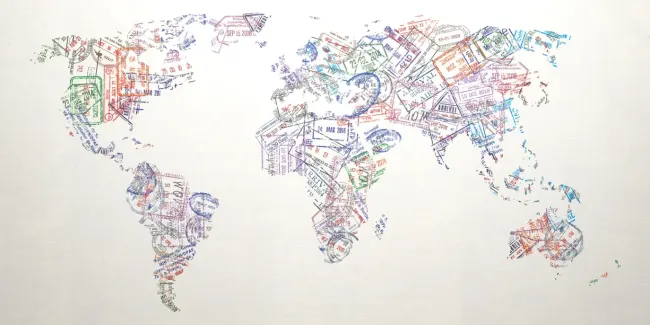
The world's 8 easiest countries to get a visa
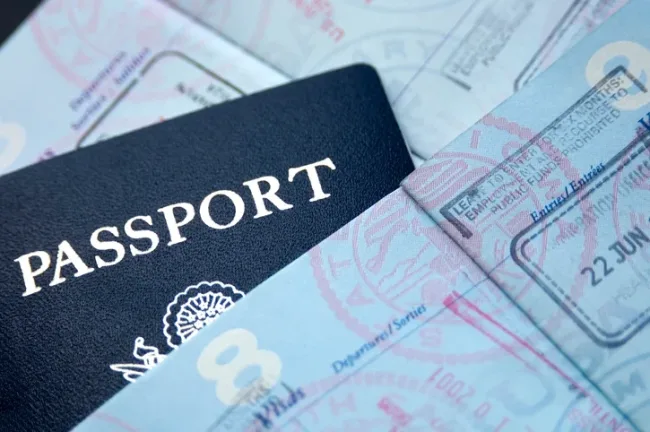
What are passport endorsements?

I’m a Travel Agent: This Is the Best Money I’ve Ever Spent on Vacation
T aking a vacation can be pricey. In fact, according to a recent GOBankingRates survey , 45% of participants said they plan to pay at least $1,000 for their summer adventure this year.
It’s easy to see how the cost of travel can add up. After all, you must cover transportation, lodging, food, activities and incidental expenses.
Check Out: 3 Places To Travel That Are Like Hawaii but Way Cheaper
Read More: How To Get $340 Per Year in Cash Back on Gas and Other Things You Already Buy
But, chances are, not every dollar you spend will have the same impact on your trip. You’ll probably find that some spending becomes incredibly meaningful while other expenditures don’t seem to add as much value.
We asked three travel agents about the best money they’ve ever spent on vacation. Perhaps their experiences will inspire your future excursions .
Best Money Spent on Vacation
Here’s a look at what travel experts consider “money well spent.”
Bonding Experience
David Ciccarelli, the CEO and founder of Lake , an online vacation rental platform for lakeside retreats, said, “The best money ever spent on vacation was renting a boat on Lake Muskoka, the heart of Cottage County in Canada, an area known as the ‘Hamptons of the North.’ After watching boats crisscross the lake and everyone else having fun on the water, I called the local marina to see if they do boat rentals and if you needed a boating license.
“It turns out you can get a daily boater license by passing a short written test. I booked the boat for the entire day, and it was certainly a memorable one. We rented boats for all the long weekends that summer,” he said. “Renting a boat gave our family an activity for the entire day, a rarity nowadays. It also meant that there would be limited screen time because we were cruising around the lake, sightseeing the beautiful boat houses on the shoreline and swimming by jumping off the boat.”
As a bonus, the activity ignited a new family interest. “Personally, it gave me a new skill as I had never driven a boat prior. It also led to my kids each wanting to get their boating license, which they did the following summer,” said Ciccarelli.
See More: 10 Best US Vacation Destinations for Retirees on a Budget
Dream Honeymoon
“The best money ever spent was on my honeymoon. It was a combination of credit card points, airline miles and cash and was the perfect trip. We [spent] two weeks in Australia and five days in Fiji, and it was 100% worth it. It was worth saving up the points and miles over a handful of years so we could splurge on hotels we otherwise wouldn’t have stayed at,” said Jared Benoff, travel agent at Vacationeeze .
Benoff continued, “My wife and I both felt it was worth the splurge to fly business class using airline miles and stay at five-star hotels using a combination of points and cash. We looked at it as a ‘once in a lifetime’ type of trip to spend three weeks away together, so we strategically mapped it out!”
Family Protection
Greg Johnson, travel expert and owner of the travel agency Travel Blue Book , believes protecting his travel costs, overall finances and family is the best money he’s spent while vacationing. “One of the most important investments I make when I travel is ensuring my family is covered with travel insurance. This expense is often deemed unimportant and unnecessary, but having coverage can be financially beneficial if you wind up needing to use it,” said Johnson.
“A lot of people forget their U.S. health insurance policy won’t apply when they’re traveling abroad. If someone without travel coverage breaks a bone or needs emergency surgery overseas, they would be left to cover their healthcare expenses out of pocket regardless of the cost.
“The same applies if someone gets stranded on the side of a mountain on vacation and needs an emergency evacuation. This kind of assistance can cost tens of thousands of dollars or more, and many travel insurance policies have emergency evacuation coverage with at least $100,000 in protection (and potentially more),” Johnson continued.
In addition, Johnson explained, “Trip cancellation and interruption coverage can also come in handy if a trip is interrupted or brought to a halt completely by a covered event, such as the death of a family member or dangerous weather. And don’t forget about other travel insurance coverage that protects you when your bags are lost or stolen or your trip is significantly delayed.”
When To Splurge
The travel experts agree there’s a time to be frugal when vacationing and a time to splurge. Benoff said, “This is so personal to each and every traveler. You should splurge if you feel like it and be frugal if you feel like it. It’s your budget, and you should decide how and when you want to spend it.”
However, “I often think if it’s a ‘just because’ trip, it’s sometimes worth it to be frugal and save up for a ‘big’ trip. But if it’s a place you’ve been longing to go or a resort you’ve been dreaming of for a while, go for it! It’s cliche, but life is short, and if you want to travel the way you want to, then go for it,” Benoff said.
Ciccarelli said vacation splurges should help you create lasting memories. “I’d suggest splurging on experiences such as renting a boat or going on a dinner cruise — something that you only do once that summer.”
How To Save
There are many ways you can save money on travel. When you do, you’ll have more cash for those meaningful splurges.
Know Your ‘Must Haves’
“Knowing what’s most important to you can help maximize your vacation budget,” said Benoff. “For us, we knew we wanted to go to Fiji as part of the trip but didn’t necessarily need to have an overwater bungalow. We’d rather stay in an entry-level room at a nicer hotel than the best room at a worse hotel, so that factored into our planning. Similarly, we prefer affordable, delicious food rather than fancy over-the-top meals and knew that most of our budget would be toward the rooms and flights and we’d save on food,” Benoff explained.
Skip the Gift Shop
You probably have a shelf full of trinkets you’ve picked up while traveling, but buying more may not be the best use of your cash. “We tend to avoid wasting money on frivolous souvenirs that lack meaning and inevitably break or get lost,” said Ciccarelli.
Don’t Over-Plan
Packing your vacation itinerary full often leads to overspending. “Sometimes the best way to make the most out of your budget is to leave room for imagination,” said Benoff.
“There’s nothing like spending a day just walking around exploring neighborhoods. I always recommend clients leave a few days completely open so they can either fully relax, follow the recommendations of locals or just let adventure take hold in the moment,” Benoff said.
Get Back to Nature
Soaking in the wind and sun is free. “Find one activity for the day that includes a lot of time outside. Hiking a challenging trail and packing snacks is a good idea, as is a fishing trip. Camping is also a good way for money to go a long way as tenting is far cheaper than staying in a hotel,” advised Ciccarelli.
Be Flexible With Your Schedule
Being willing to adjust your vacation plans even slightly can result in significant savings. “I’ll often have clients reach out saying they want to go away for two weeks with a set budget. Often, the easiest way to cut a significant portion of that budget is by cutting a night or two off the itinerary,” said Benoff.
Benoff has also personally experienced the power of flexibility. “We rearranged the [honeymoon] schedule a few times based on hotel pricing and when we could get business-class seats to Australia. We were fortunate to have the flexibility but knew that our patience and flexibility would pay off in the end,” he explained.
More From GOBankingRates
- Don't Buy a House in These 3 Cities Facing a 'Climate Change Real Estate Bubble'
- 6 Clothing Items Frugal People Keep for Many Years
- How To Eliminate $100,000 of Debt
- 3 Surprising Reasons Women Should Consider an Annuity
This article originally appeared on GOBankingRates.com : I’m a Travel Agent: This Is the Best Money I’ve Ever Spent on Vacation

- Auto Insurance Best Car Insurance Cheapest Car Insurance Compare Car Insurance Quotes Best Car Insurance For Young Drivers Best Auto & Home Bundles Cheapest Cars To Insure
- Home Insurance Best Home Insurance Best Renters Insurance Cheapest Homeowners Insurance Types Of Homeowners Insurance
- Life Insurance Best Life Insurance Best Term Life Insurance Best Senior Life Insurance Best Whole Life Insurance Best No Exam Life Insurance
- Pet Insurance Best Pet Insurance Cheap Pet Insurance Pet Insurance Costs Compare Pet Insurance Quotes
- Travel Insurance Best Travel Insurance Cancel For Any Reason Travel Insurance Best Cruise Travel Insurance Best Senior Travel Insurance
- Health Insurance Best Health Insurance Plans Best Affordable Health Insurance Best Dental Insurance Best Vision Insurance Best Disability Insurance
- Credit Cards Best Credit Cards 2024 Best Balance Transfer Credit Cards Best Rewards Credit Cards Best Cash Back Credit Cards Best Travel Rewards Credit Cards Best 0% APR Credit Cards Best Business Credit Cards Best Credit Cards for Startups Best Credit Cards For Bad Credit Best Cards for Students without Credit
- Credit Card Reviews Chase Sapphire Preferred Wells Fargo Active Cash® Chase Sapphire Reserve Citi Double Cash Citi Diamond Preferred Chase Ink Business Unlimited American Express Blue Business Plus
- Credit Card by Issuer Best Chase Credit Cards Best American Express Credit Cards Best Bank of America Credit Cards Best Visa Credit Cards
- Credit Score Best Credit Monitoring Services Best Identity Theft Protection
- CDs Best CD Rates Best No Penalty CDs Best Jumbo CD Rates Best 3 Month CD Rates Best 6 Month CD Rates Best 9 Month CD Rates Best 1 Year CD Rates Best 2 Year CD Rates Best 5 Year CD Rates
- Checking Best High-Yield Checking Accounts Best Checking Accounts Best No Fee Checking Accounts Best Teen Checking Accounts Best Student Checking Accounts Best Joint Checking Accounts Best Business Checking Accounts Best Free Checking Accounts
- Savings Best High-Yield Savings Accounts Best Free No-Fee Savings Accounts Simple Savings Calculator Monthly Budget Calculator: 50/30/20
- Mortgages Best Mortgage Lenders Best Online Mortgage Lenders Current Mortgage Rates Best HELOC Rates Best Mortgage Refinance Lenders Best Home Equity Loan Lenders Best VA Mortgage Lenders Mortgage Refinance Rates Mortgage Interest Rate Forecast
- Personal Loans Best Personal Loans Best Debt Consolidation Loans Best Emergency Loans Best Home Improvement Loans Best Bad Credit Loans Best Installment Loans For Bad Credit Best Personal Loans For Fair Credit Best Low Interest Personal Loans
- Student Loans Best Student Loans Best Student Loan Refinance Best Student Loans for Bad or No Credit Best Low-Interest Student Loans
- Business Loans Best Business Loans Best Business Lines of Credit Apply For A Business Loan Business Loan vs. Business Line Of Credit What Is An SBA Loan?
- Investing Best Online Brokers Top 10 Cryptocurrencies Best Low-Risk Investments Best Cheap Stocks To Buy Now Best S&P 500 Index Funds Best Stocks For Beginners How To Make Money From Investing In Stocks
- Retirement Best Roth IRAs Best Gold IRAs Best Investments for a Roth IRA Best Bitcoin IRAs Protecting Your 401(k) In a Recession Types of IRAs Roth vs Traditional IRA How To Open A Roth IRA
- Business Formation Best LLC Services Best Registered Agent Services How To Start An LLC How To Start A Business
- Web Design & Hosting Best Website Builders Best E-commerce Platforms Best Domain Registrar
- HR & Payroll Best Payroll Software Best HR Software Best HRIS Systems Best Recruiting Software Best Applicant Tracking Systems
- Payment Processing Best Credit Card Processing Companies Best POS Systems Best Merchant Services Best Credit Card Readers How To Accept Credit Cards
- More Business Solutions Best VPNs Best VoIP Services Best Project Management Software Best CRM Software Best Accounting Software
- Debt relief Best debt management Best debt settlement Do you need a debt management plan? What is debt settlement? Debt consolidation vs. debt settlement Should you settle your debt or pay in full? How to negotiate a debt settlement on your own
- Debt collection Can a debt collector garnish my bank account or my wages? Can credit card companies garnish your wages? What is the Fair Debt Collection Practices Act?
- Bankruptcy How much does it cost to file for bankruptcy? What is Chapter 7 bankruptcy? What is Chapter 13 bankruptcy? Can medical bankruptcy help with medical bills?
- More payoff strategies Tips to get rid of your debt in a year Don't make these mistakes when climbing out of debt How credit counseling can help you get out of debt What is the debt avalanche method? What is the debt snowball method?
- Manage Topics
- Investigations
- Visual Explainers
- Newsletters
- Abortion news
- Coronavirus
- Climate Change
- Vertical Storytelling
- Corrections Policy
- College Football
- High School Sports
- H.S. Sports Awards
- Sports Betting
- College Basketball (M)
- College Basketball (W)
- For The Win
- Sports Pulse
- Weekly Pulse
- Buy Tickets
- Sports Seriously
- Sports+ States
- Celebrities
- Entertainment This!
- Celebrity Deaths
- American Influencer Awards
- Women of the Century
- Problem Solved
- Personal Finance
- Small Business
- Consumer Recalls
- Video Games
- Product Reviews
- Destinations
- Airline News
- Experience America
- Today's Debate
- Suzette Hackney
- Policing the USA
- Meet the Editorial Board
- How to Submit Content
- Hidden Common Ground
- Race in America
Personal Loans
Best personal loans
Auto Insurance
Best car insurance
Best high-yield savings
CREDIT CARDS
Best credit cards
Advertiser Disclosure
Blueprint is an independent, advertising-supported comparison service focused on helping readers make smarter decisions. We receive compensation from the companies that advertise on Blueprint which may impact how and where products appear on this site. The compensation we receive from advertisers does not influence the recommendations or advice our editorial team provides in our articles or otherwise impact any of the editorial content on Blueprint. Blueprint does not include all companies, products or offers that may be available to you within the market. A list of selected affiliate partners is available here .
Travel insurance
Best travel insurance companies of June 2024
Amy Fontinelle

Heidi Gollub
“Verified by an expert” means that this article has been thoroughly reviewed and evaluated for accuracy.
Updated 2:16 p.m. UTC June 7, 2024
- path]:fill-[#49619B]" alt="Facebook" width="18" height="18" viewBox="0 0 18 18" fill="none" xmlns="http://www.w3.org/2000/svg">
- path]:fill-[#202020]" alt="Email" width="19" height="14" viewBox="0 0 19 14" fill="none" xmlns="http://www.w3.org/2000/svg">
Editorial Note: Blueprint may earn a commission from affiliate partner links featured here on our site. This commission does not influence our editors' opinions or evaluations. Please view our full advertiser disclosure policy .
WorldTrips is the best travel insurance company of 2024 , based on our in-depth analysis of travel insurance policies. Its Atlas Journey Elevate plan gets the top score in our rating because of the extensive coverage it provides for the price. It offers best-in-class emergency medical and evacuation benefits, as well as high limits for baggage insurance.
Best travel insurance of 2024
- WorldTrips : Best travel insurance.
- Travel Insured International : Best for emergency evacuation.
- TravelSafe : Best for missed connections.
- Aegis : Cheapest travel insurance.
- Travelex : Best for families.
- AIG : Best for add-on coverage options.
- Nationwide : Best for cruise itinerary changes.
Why trust our travel insurance experts
Our travel insurance experts evaluate hundreds of insurance products and analyze thousands of data points to help you find the best trip insurance for your situation. We use a data-driven methodology to determine each rating. Advertisers do not influence our editorial content . You can read more about our methodology below.
- 1,855 coverage details evaluated.
- 567 rates reviewed.
- 5 levels of fact-checking.
Travel insurance quotes comparison
Best travel insurance companies, best travel insurance.

Top travel insurance plans
Average cost, medical limit per person, why it’s the best.
If you’re looking for the best travel insurance for international travel , WorldTrips’ Atlas Journey Elevate plan gives you $250,000 in travel medical insurance with primary coverage. This plan is a good option if health insurance for international travel is a priority. It also has $1 million in emergency evacuation coverage.
See our full WorldTrips travel insurance review .
Pros and cons
- $250,000 in primary medical coverage.
- $1 million per person in medical evacuation coverage.
- Primary damage or loss baggage coverage of $500 per item, up to $2,500.
- 5 optional upgrades, including pet care, adventure sports and rental car damage and theft.
- No non-medical evacuation coverage.
Customer reviews
WorldTrips has a rating of 4.27 stars out of 5 on Squaremouth, based on 428 reviews of policies purchased through the travel insurance comparison site since 2008.
Heidi’s expert take: “WorldTrips offers primary coverage for emergency medical expense and for baggage damage or loss. This means the insurer will pay for your claim first and then seek recovery from any responsible third party, such as your health insurance provider, airline or homeowners insurance company (if your belongings are stolen). Travel insurance with secondary medical coverage might be cheaper, but then you’d have to file claims with third parties yourself, before you could turn to your travel insurance for help.” Heidi Gollub, Managing Editor of Insurance, USA TODAY Blueprint
Best travel insurance for emergency evacuation
Travel insured international.

Top travel insurance plan
If you’re traveling to a remote area, consider Travel Insured International’s Worldwide Trip Protector. It has the best travel insurance for emergency evacuation of travel insurance policies in our rating. This top travel insurance plan provides up to $1 million in emergency evacuation coverage per person and $150,000 in non-medical evacuation per person. It also has primary coverage for travel medical insurance benefits.
- Only plan in our rating that offers $150,000 in non-medical evacuation coverage.
- $500 per person baggage delay benefit only requires a 3-hour delay.
- Optional rental car damage benefit up to $50,000.
- Missed connection benefit of $500 per person is only available for cruises and tours.
Travel Insured International has a rating of 4.39 stars out of 5 on Squaremouth, based on 3,402 reviews of policies purchased on the travel insurance comparison site since 2004.
Heidi’s expert take: The Worldwide Trip Protector plan provides rare non-medical evacuation benefits of up to $150,000. If you’re traveling to an area at risk of a political, security or national disaster, this emergency evacuation coverage could help get you back to safety. Heidi Gollub, Managing Editor of Insurance, USA TODAY Blueprint
Best travel insurance for missed connections

TravelSafe offers good travel insurance for missed connections , with $2,500 in missed connection coverage for each person on the plan.
- Best-in-class $2,500 per person in missed connection coverage.
- $1 million per person in medical evacuation and $25,000 in non-medical evacuation coverage.
- Generous $2,500 per person baggage and personal items loss benefit.
- Most expensive of our best-rated travel insurance plans.
- No “interruption for any reason” coverage option.
- Weak baggage delay coverage of $250 per person after 12 hours.
TravelSafe has a rating of 4.3 stars out of 5 on Squaremouth, based on 1,506 reviews of policies purchased on the travel insurance comparison site since 2004.
Heidi’s expert take: “If you miss out on prepaid vacation plans because you didn’t make a connecting flight, you’ll be glad for the $2,500 missed connection coverage. Some policies only provide missed connection coverage for cruises and tours, but TravelSafe Classic doesn’t impose that restriction.” Heidi Gollub, Managing Editor of Insurance, USA TODAY Blueprint
Cheapest travel insurance

Go Ready Choice by Aegis has the most affordable travel insurance of the best-rated travel insurance companies in our rating. This is based on the average cost of seven international trips of varying lengths and values for travelers of different ages.
See our full Aegis travel insurance review .
- Cheapest of our best trip insurance plans.
- Pet care benefit of $500 under travel delay benefits.
- Low emergency medical and evacuation limits.
- Low missed connection benefit of $500 per person for cruises and tours only.
- Low baggage and personal items loss benefit of $500 per person.
Aegis has a rating of 4.06 stars out of 5 on Squaremouth, based on 1,111 reviews of policies purchased on the travel insurance comparison site since 2013.
Heidi’s expert take: “If you’re looking for a budget travel insurance policy , Go Ready Choice may fit the bill. It has comparably low coverage limits, but if you have health insurance that will cover you on your trip, its $50,000 in secondary medical coverage may be sufficient.” Heidi Gollub, Managing Editor of Insurance, USA TODAY Blueprint
Best travel insurance for families

Top-scoring plan
Travelex Insurance Services has the best travel insurance for families because you can add kids aged 17 and younger to your Travel Select plan at no additional charge.
See our full Travelex travel insurance review .
- Free coverage for children 17 and under on the same policy.
- Robust travel delay coverage of $2,000 per person ($250 per day) after 5 hours.
- Hurricane and weather coverage after a common carrier delay of any amount of time.
- Low emergency medical coverage of $50,000 per person.
- Non-medical evacuation is not included.
- Low baggage delay coverage of $200 requires a 12-hour delay.
Travelex has a rating of 4.43 stars out of 5 on Squaremouth, based on 2,048 reviews of policies purchased on the travel insurance comparison site since 2004.
Heidi’s expert take: “If you’re traveling with kids, a Travelex policy will cover them, too. The number of children you can add to your policy is unlimited and they’ll get travel protection at no additional cost.” Heidi Gollub, Managing Editor of Insurance, USA TODAY Blueprint
Best travel insurance for add-on coverage options

Travel Guard Preferred from AIG allows you to customize your policy with a host of available upgrades, making it the best traveler insurance for add-on options . These include “cancel for any reason” (CFAR) coverage , rental vehicle damage coverage and bundles that offer additional benefits for adventure sports, travel inconvenience, quarantine, pets, security and weddings.
There’s also a medical bundle that increases the travel medical benefit to $100,000 and emergency evacuation to $1 million. This is a good option if you’re looking for foreign travel health insurance.
See our full AIG travel insurance review .
- Bundle upgrades allow you to customize your travel insurance policy.
- Emergency medical and evacuation limits can be doubled with optional upgrade.
- Base travel insurance policy has relatively low medical limits.
- $300 baggage delay benefit requires a 12-hour delay.
- Optional CFAR upgrade only reimburses up to 50% of trip cost.
Heidi’s expert take: “You can add riders to your AIG travel insurance policy to maximize your coverage. Choose from these bundles: adventure sports, medical, pet, quarantine, security and wedding. You may also want to add “cancel for any reason” coverage and rental vehicle damage coverage.” Heidi Gollub, Managing Editor of Insurance, USA TODAY Blueprint
Best travel insurance for cruise itinerary changes

Nationwide’s Choice Cruise is good travel insurance for cruises . It has a $500 per person benefit if a cruise itinerary change causes you to miss a prepaid excursion.
Choice Cruise also has a missed connections benefit of $1,500 per person after only a 3-hour delay when you’re taking a cruise or tour. But note that this coverage is secondary coverage to any compensation provided by a common carrier.
See our full Nationwide travel insurance review .
- Benefits for cruise itinerary changes, ship-based mechanical breakdowns and covered shipboard service disruptions.
- Non-medical evacuation benefit of $25,000 per person.
- Missed connection coverage of $1,500 per person for tours and cruises, after a 3-hour delay.
- Baggage loss benefits of $2,500 per person.
- Travel medical coverage is secondary.
- Trip cancellation benefit for losing your job requires three years of continuous employment.
- No “cancel for any reason” upgrade available.
Nationwide has a rating of 4.02 stars out of 5 on Squaremouth, based on 570 reviews of policies purchased on the travel insurance comparison site since 2018.
Heidi’s expert take: “This plan has protections for cruisers when it comes to prepaid expenses. But its emergency medical coverage is secondary, which means you’d have to file medical claims with your health insurance company first. Since U.S. health insurance won’t help you at sea, you may want to look for cruise travel insurance with primary medical coverage instead.” Heidi Gollub, Managing Editor of Insurance, USA TODAY Blueprint
Compare the best travel insurance plans

Via Compare Coverage’s website

Heidi’s expert take: “Here are my tips on how to buy travel insurance that gets you the most coverage for the lowest price: Buy early . Getting travel insurance within two weeks of making your first trip deposit may qualify you for coverage of pre-existing medical conditions, and it won’t cost you any extra. Look for primary emergency medical coverage . If you buy a plan with secondary coverage, you’ll have to file a claim with your health insurance first, even if you know it will be denied. Don’t overinsure . Calculate the value of only your prepaid, nonrefundable trip expenses that are not already covered by other insurance (like credit card travel insurance or health insurance, if your coverage extends to where you are traveling). Even if this value is $0, you can still buy travel insurance for the travel medical insurance benefits, and you’ll only be paying for the insurance you need. Understand exclusions . If you are planning to go scuba diving, for instance, make sure this adventure activity is not excluded from a policy’s coverage. If so, you may need to pay for a rider or shop for another plan that offers the coverage you need.” Heidi Gollub, Managing Editor of Insurance, USA TODAY Blueprint
What is the best travel insurance?
The best travel insurance for international travel is sold by WorldTrips, according to our in-depth trip insurance comparison.
The best travel insurance plan for you will depend on the trip you are planning and the coverage areas that are most important to you.
- Best cruise travel insurance
- Best COVID travel insurance
- Best “cancel for any reason” travel insurance
- Best senior travel insurance
Best travel insurance for cruises
The best cruise travel insurance is Atlas Journey Preferred sold by WorldTrips . This plan offers solid travel insurance for cruises for a low rate.

Best travel insurance for COVID-19
The best COVID travel insurance is the Trip Protection Basic plan sold by Seven Corners . It is a relatively low cost travel insurance plan with optional “cancel for any reason” coverage that reimburses up to 75% of your prepaid, nonrefundable trip expenses.

Best travel insurance for “cancel for any reason”
The best “cancel for any reason” (CFAR) travel insurance is Seven Corners’ Trip Protection Basic. Adding CFAR coverage to a RoundTrip Basic plan only increases the cost by about 40%, which is lower than other plans we analyzed. For the extra cost, you get coverage of 75% of your prepaid, nonrefundable trip expenses, as long as you cancel at least 48 hours before your scheduled departure.
Best travel insurance for seniors
The best senior travel insurance is the Gold plan sold by Tin Leg . It is an affordable travel insurance plan with travel medical primary coverage of $500,000 and a pre-existing conditions waiver if you insure the full amount of your trip within 14 days of your first trip deposit.

How much is travel insurance?
The average cost of travel insurance is 5% to 6% of your prepaid, nonrefundable trip costs .
How much you pay for travel insurance will depend on:
- The cost of your trip.
- Your destination.
- The length of your trip.
- The ages of travelers being insured.
- Your state of residence.
- The travel insurance policy you choose.
- The total coverage amounts in your policy.
- Any travel insurance add-ons you select.
Here are average travel insurance rates for a 30-year-old female who is insuring a 14-day trip to Mexico.
Looking to save? Discover cheap travel insurance options.
How much travel insurance should I buy?
Travel insurance companies typically offer several plans with varying maximum limits. The higher the coverage limits, the more you’ll pay for travel insurance.
Squaremouth, a travel insurance comparison site, recommends the following coverage limits for international travel:
- Emergency medical coverage: At least $50,000.
- Medical evacuation coverage: At least $100,000.
If you’re going on a cruise, or to a remote location, Squaremouth recommends:
- Emergency medical coverage: At least $100,000.
- Medical evacuation coverage: At least $250,000.
When evaluating travel insurance plans, our team of insurance analysts considered the best medical travel insurance policies to have at least $250,000 in emergency medical coverage and at least $500,000 in medical evacuation coverage.
When should I buy travel insurance?
The best time to buy travel insurance is within two weeks of making your first nonrefundable travel payment, whether it’s for a plane ticket, hotel stay, cruise or excursion.
Travel insurance costs the same whether you buy it early or last minute, and buying it early has added benefits:
- You may be able to add on “ cancel for any reason” (CFAR) coverage , an upgrade that is typically only available for a limited time after you’ve started paying for your trip.
- You may qualify for a pre-existing medical conditions exclusion waiver, meaning your pre-existing conditions will be covered by travel insurance. This waiver is generally added to your policy automatically, provided you buy the travel insurance within a certain window after your first trip deposit.
- You will be covered over a longer period of time for unforeseen events that could cause you to cancel your trip, such as medical emergencies, inclement weather and natural disasters.
Expert tip: You can buy travel insurance up to the day before you leave on your trip, but waiting may cost you the opportunity to qualify for a pre-existing conditions exclusion waiver or to buy a “cancel for any reason” upgrade.
Where can I buy travel insurance?
You can buy a travel insurance plan:
- Online. Visit a travel insurance company’s website to buy a policy directly or use a comparison website like Squaremouth or Travelinsurance.com to see your options and compare plans. You may also be able to purchase travel insurance online through an airline, cruise, hotel, rental car company or other provider you book a ticket with.
- In person. A travel agent or insurance agent may be able to assist you in buying travel insurance.
Travel insurance trends in 2024
Americans are changing the way they travel and this includes buying travel insurance when they might have skipped it in the past. As spending on trips continues to rise , travelers have more to lose if their plans are disrupted.
Based on travel insurance quote requests on the Squaremouth website last month, these are the main benefits travelers are looking for in a travel insurance policy.
*Source: Squaremouth.com. Travel insurance quote filter usage from April 28 to May 28, 2024.
Methodology
Our insurance experts reviewed 1,855 coverage details and 567 rates to determine the best travel insurance of 2024. For companies with more than one travel insurance plan, we shared information about the highest-scoring plan.
Insurers could score up to 100 points based on the following factors:
- $3,000, 8-day trip to Mexico for two travelers age 30.
- $3,000, 8-day trip to Mexico for two travelers age 70.
- $6,000, 17-day trip to Italy for two travelers age 40.
- $6,000, 17-day trip to Italy for two travelers age 65.
- $15,000, 17-day trip to Italy for four travelers ages 40, 40, 10 and 7.
- $15,000, 17-day trip to France for four travelers ages 40, 40, 10 and 7.
- $15,000, 17-day trip to the U.K. for four travelers ages 40, 40, 10 and 7.
- Medical expenses: 10 points. We scored travel medical insurance by the coverage amount available. Travel insurance policies with emergency medical expense benefits of $250,000 or more per person were given the highest score of 10 points.
- Medical evacuation: 10 points. We scored each plan’s emergency medical evacuation coverage by coverage amount. Travel insurance policies with medical evacuation expense benefits of $500,000 or more per person were given the highest score of 10 points.
- Pre-existing medical condition exclusion waiver: 10 points. We gave full points to travel insurance policies that cover pre-existing medical conditions if certain conditions are met.
- Missed connection: 10 points. Travel insurance plans with missed connection benefits of $1,000 per person or more received full points.
- “Cancel for any reason” upgrade: 5 points. We gave points to travel insurance plans with optional “cancel for any reason” coverage that reimburses up to 75%.
- Travel delay required waiting time: 5 points. We gave 5 points to travel insurance policies with travel delay benefits that kick in after a delay of 6 hours or less.
- Cancel for work reasons: 5 points. If a travel insurance plan allows you to cancel your trip for work reasons, such as your boss requiring you to stay and work, we gave it 5 points.
- Hurricane and severe weather: 5 points. Travel insurance plans that have a required waiting period for hurricane and weather coverage of 12 hours or less received 5 points.
Some travel insurance companies may offer plans with additional benefits or lower prices than the plans that scored the highest, so make sure to compare travel insurance quotes to see your full range of options.
Best travel insurance FAQs
According to our analysis, WorldTrips has the best trip insurance. Two of its plans — Atlas Journey Explore and Atlas Journey Elevate — get 5 stars in our rating.
The best travel insurance policy for you will depend on what type of coverage you need. With so many different policies and carriers, the policy that was best for your friend’s trip to California might not be ideal for your trip to Japan. If you’re looking for the best travel insurance for international travel, you may be willing to pay more for higher coverage levels.
A comprehensive travel insurance plan bundles several types of travel insurance coverage, each with its own limits. To ensure you have adequate financial protection for your trip, your travel insurance policy should include the following travel insurance coverages:
- Trip cancellation . With trip cancellation insurance , you’re covered if you need to call off your trip because of a reason listed in your policy, such as unexpected illness, injury or death of you, a family member or a travel companion, severe weather, jury duty and your travel supplier going out of business.
- Travel delay. Once your trip has started, travel delay insurance reimburses you for unexpected expenses you incur after a minimum delay, such as five hours. It can cover needs like airport meals, transportation and even overnight accommodation.
- Trip interruption. If you need to cut your trip early for a reason listed in your policy, trip interruption insurance can reimburse you for any prepaid, nonrefundable payments you’ll lose by leaving early. It can also pay for a last-minute one-way ticket home.
- Travel medical . Emergency medical benefits are especially important if you need international health insurance for travel outside of the country. Your domestic health insurance may provide limited coverage once you leave the U.S. The best travel medical insurance pays for ambulance service, doctor visits, hospital stays, X-rays, lab work and prescription medication you may require while traveling.
- Emergency medical evacuation. If you’re traveling to a remote area, or planning excursions such as boating to an island, emergency medical evacuation coverage is a good idea. This coverage pays to transport you to the nearest adequate medical facility if you are injured or sick while traveling.
- Baggage delay. After a certain waiting period, such as six or 12 hours, this coverage will reimburse you for necessities you need to buy to tide you over while you wait for your bag to arrive. Be sure to save your receipts and look at your coverage limit, as some caps are low, like $200.
- Baggage loss. Baggage insurance can reimburse you if your bag never arrives, or if your personal belongings are stolen during your travels. Coverage limits apply here, as well as exclusions for certain items such as electronics.
“Typically, travelers are expected to pay their expenses out of pocket, and then file a claim for reimbursement,” said James Clark, spokesperson for Squaremouth. “However, there are medical situations in which a provider may be required to pre-authorize payment to make sure the policyholder receives the treatment they need.”
According to Clark, “Providers can pre-authorize payment for medical care and emergency evacuations. With that said, every circumstance is unique, and providers will handle each situation on a case-by-case basis.”
Travel insurance covers your prepaid, nonrefundable trip costs — as well as extra money you may need to spend due to unforeseen circumstances and emergencies — both before and during your trip.
Travel insurance coverage varies by plan, but in general travel insurance covers costs associated with these problems:
- Bankruptcy of a travel insurance company, such as your airline or tour operator.
- Dangerous weather conditions.
- Delayed and lost luggage.
- Illness or death in your family that requires you to stay home or cut your trip short.
- Illness that needs medical attention.
- Injury requiring medical evacuation.
- Jury duty.
- Travel delays and missed connections.
- Theft of your personal belongings while traveling.
- Unexpected job loss.
Travel insurance policies often exclude or limit “foreseeable” losses. Typical travel insurance exclusions include:
- Accidents or injuries caused by drinking or drug use.
- Canceling your trip because you changed your mind.
- Ending your trip early because you changed your mind.
- Losses caused by intentional self harm, including suicide.
- Losses due to war, civil disorder or riots.
- Medical tourism.
- Medical treatment for pre-existing conditions.
- Mental health care.
- Natural disasters that begin before you buy travel insurance.
- Non-medical evacuation.
- Normal pregnancy.
- Medical treatment related to high-risk activities.
- Routine medical care, such as physicals or dental care.
- Search and rescue.
Your U.S. health insurance may provide little or no coverage in foreign countries. Check with your health insurance company to see if you have any global benefits and ask how they work. If your health care does extend across the border, the benefits it provides abroad may not be the same benefits it provides domestically.
Medicare usually won’t pay for health care outside of the United States and its territories, so older travelers planning an international trip should look into the best senior travel insurance with robust medical benefits.
The best time to buy travel insurance is immediately after booking your trip and making a nonrefundable payment — in other words, as soon as you’re at risk of losing money. This way, you’ll know the total cost that you need to insure and you’ll have the longest window to take advantage of your policy’s benefits if something goes wrong.
You can’t wait until something goes wrong and then buy travel insurance to get reimbursed for your loss. Travel insurance only covers unexpected losses.
Travel insurance companies can decline to cover travel to certain countries. For example, you may find that some trip insurance companies don’t offer coverage to countries with a Level 4: Do Not Travel advisory from the U.S. State Department.
Travel insurance policies also frequently exclude certain risks that you’re more likely to encounter in Level 4 or Level 3 countries. For example, your policy may not cover losses related to declared or undeclared wars or acts of war or losses related to known or foreseeable conditions or events.
Some credit cards , such as the Chase Sapphire Preferred® Card , offer benefits such as trip cancellation and interruption insurance, baggage delay insurance and trip delay reimbursement when you use your card to pay for your trip.
Ask your credit card issuer for your card’s benefits guide to see what coverage you may have. Keep in mind that it may not cover all the risks you want to protect against, such as the cost of international health care or emergency medical evacuation .
Business travel insurance makes sense if you are self-employed and paying for your own travel expenses, or if you are traveling internationally and want medical coverage abroad.
You might also consider buying travel insurance for a business trip if your company won’t cover extra expenses if your flight is delayed or you need to head home early.
Cruise travel insurance can help protect you financially if you need emergency medical care in a remote location, or if a delayed flight causes you to miss embarkation and you need to pay extra to catch up to your cruise.
Experts caution that travel insurance you buy through a cruise line may not be as comprehensive as plans you can buy directly from travel insurance companies.
Some travel insurance plans cover rental cars as an optional upgrade, for an additional cost. The 5-star rated travel insurance companies in our rating offer these optional rental car benefits:
- Travel Insured International — Rental car damage and theft coverage of $50,000.
- WorldTrips — Rental car damage and theft coverage of $50,000 with a $250 deductible.
Travel insurance typically only covers a single trip, although your insured trip can have multiple destinations.
If you’re looking to insure several trips in the same year, annual travel insurance may be a good option for you.
Travel insurance may be required, depending on the country you plan to visit. But it’s smart to consider buying a travel insurance policy for international travel, even when it is not required. A good travel insurance policy can protect you financially if you need emergency medical assistance when traveling, or if you need to cut your trip short and buy a last-minute plane ticket home because an immediate family member is ill.
Wondering if travel insurance is worth it? What travel insurance covers
Editor’s Note: This article contains updated information from previously published stories:
- Spirit Airlines scrubs 60% of its Wednesday flights, says cancellations will drop ‘in the days to come.’
- ‘Just a parade of incompetency’: Spirit Airlines passengers with ‘nightmare’ stories want more than apology, $50 vouchers
- ‘This is not our proudest moment’: Spirit Airlines CEO says more flight cancellations expected this weekend
- Hurricane Irma: Flight cancellations top 12,500; even more expected
- Is an annual travel insurance policy right for you?
- How 2020 and COVID-19 changed travel forever – and what that means for you
- COVID-19 or delta variant have you ready to scrap your trip? Here’s how to cancel like a pro
- Sunday: Snow is over, but flight cancellations top 12,000
- After nearly 13,000 Harvey cancellations, Irma is new threat to airline flights
- What’s the difference between travel insurance and trip ‘protection’?
- How to choose the right travel insurance for your next vacation
- Travel insurance can save the day
- Angry passengers brawl after Spirit cancels flights
- What to do when travel insurance doesn’t work
- How lockdowns, quarantines and COVID-19 testing will change summer travel in 2021
- Travelers will pay and worry more on summer vacation this year. But they won’t cancel
- How to find a hotel with COVID testing and quarantine facilities wherever you travel
- Yearning to travel in 2022? First, figure out your budget – then pick a destination
- Pro tips for surviving a long flight during a pandemic: Get the right mask, bring a pillow
- Want to steer clear of contracting COVID-19 on your next vacation? Follow these guidelines
- Post-pandemic travel: Is it OK to ask another passenger’s vaccine status or request they mask up?
- These days, forgetting these important travel items could cost you thousands of dollars
- International travel hacks: When to book flights and hotels, how to deal with COVID-19 rules
- Traveling post-coronavirus: How do you book your next trip when so much remains uncertain?
- The COVID-19 guide to holiday travel – and the case for why you shouldn’t go this year
- Should you travel during the holidays? Americans struggle with their decision
- ‘There’s still pent-up demand’: What you should know about fall travel
- Planning for life after coronavirus: When will we know it’s safe to travel again?
- ‘Busiest camping season’: Travelers choose outdoor recreation close to home amid COVID-19 pandemic
- Considering a camping trip this summer? Tips to make sure your gear is good to go
- RVing for the first time? 8 tips for newbies I wish I’d known during my first trip
- Five myths about travel agents
- Should I buy travel insurance?
- Is travel insurance stacked against you?
- Five myths about travel insurance and terrorism
- These eight things could get your travel insurance claims rejected
- There’s a good chance that your credit card already gives you some kind of travel insurance coverage
- How to avoid a hotel cancellation penalty
- Change fees and travel insurance continue to rise
Blueprint is an independent publisher and comparison service, not an investment advisor. The information provided is for educational purposes only and we encourage you to seek personalized advice from qualified professionals regarding specific financial decisions. Past performance is not indicative of future results.
Blueprint has an advertiser disclosure policy . The opinions, analyses, reviews or recommendations expressed in this article are those of the Blueprint editorial staff alone. Blueprint adheres to strict editorial integrity standards. The information is accurate as of the publish date, but always check the provider’s website for the most current information.

Amy Fontinelle has more than 15 years of experience helping people make informed decisions about their money, whether they’re refinancing a mortgage, buying insurance or choosing a credit card. As a freelance writer trained in journalism and specializing in personal finance, Amy digs into the details to explain the products and strategies that can help (or hurt) people seeking greater financial security and wealth. Her work has been published by Forbes Advisor, Capital One, MassMutual, Investopedia and many other outlets.
Heidi Gollub is the USA TODAY Blueprint managing editor of insurance. She was previously lead editor of insurance at Forbes Advisor and led the insurance team at U.S. News & World Report as assistant managing editor of 360 Reviews. Heidi has an MBA from Emporia State University and is a licensed property and casualty insurance expert.

10 worst US airports for flight cancellations last week
Travel insurance Heidi Gollub

10 worst US airports for flight cancellations this week

Our travel insurance ratings methodology

AXA Assistance USA travel insurance review 2024
Travel insurance Jennifer Simonson

Cheapest travel insurance of June 2024
Travel insurance Mandy Sleight

Average flight costs: Travel, airfare and flight statistics 2024
Travel insurance Timothy Moore

John Hancock travel insurance review 2024

HTH Worldwide travel insurance review 2024

Airfare at major airports is up 29% since 2021

USI Affinity travel insurance review 2024

Trawick International travel insurance review 2024

Travel insurance for Canada

Travelex travel insurance review 2024

Best travel insurance for a Disney World vacation in 2024

World Nomads travel insurance review 2024
- Credit cards
- View all credit cards
- Banking guide
- Loans guide
- Insurance guide
- Personal finance
- View all personal finance
- Small business
- Small business guide
- View all taxes
You’re our first priority. Every time.
We believe everyone should be able to make financial decisions with confidence. And while our site doesn’t feature every company or financial product available on the market, we’re proud that the guidance we offer, the information we provide and the tools we create are objective, independent, straightforward — and free.
So how do we make money? Our partners compensate us. This may influence which products we review and write about (and where those products appear on the site), but it in no way affects our recommendations or advice, which are grounded in thousands of hours of research. Our partners cannot pay us to guarantee favorable reviews of their products or services. Here is a list of our partners .
How to Get the Best Car Insurance

Many or all of the products featured here are from our partners who compensate us. This influences which products we write about and where and how the product appears on a page. However, this does not influence our evaluations. Our opinions are our own. Here is a list of our partners and here's how we make money .
For a lot of people, buying car insurance is like buying sliced bread. It’s not the most exciting purchase, and the options all seem similar. So thrifty shoppers might simply reach for the cheapest thing on the shelf. But like cheap bread, cheap car insurance may leave you wishing you spent a little more on quality.
“The cheapest is not always the best,” warns Jessica McNally, an agency owner with Goosehead Insurance in Dallas. That’s because there are lots of factors that make up a car insurance company. And while price is one of them, it’s best to look at the bigger picture.
Here’s what to look for when picking the best car insurance company.
1. Choose a financially stable company
The best car insurance companies have plenty of money on hand to pay for customers’ claims. It’s important to check an insurer’s financial stability before buying a policy, especially if it’s a smaller insurer you’ve never heard of.
There are several independent agencies that evaluate the financial strength of insurance companies. One example is A.M. Best. You can use its online search tool to find an insurer’s financial strength rating. Companies with a rating of A or higher are considered to have an excellent ability to pay out customer claims.
2. Check customer satisfaction ratings and reviews
Not every insurer is customer-first. That’s why it’s important to research the customer satisfaction of insurers you’re considering.
You can turn to surveys from companies like J.D. Power to find insurers with the best customer satisfaction scores [0] J.D. Power . Auto Insurance Customer Satisfaction Plummets as Rates Continue to Surge, J.D. Power Finds . Accessed May 21, 2024. View all sources . Or, if you don’t mind doing a little detective work, you can compare customer complaints against insurers by using the National Association of Insurance Commissioners’ website . But take other people’s emotionally charged comments about companies or agents you might read online with a grain of salt, McNally advises.
3. Look for convenience
A great auto insurer should offer multiple ways to manage a policy. For example, some insurers allow customers to use a mobile app to file and track claims. But it’s hard to tell how simple it’ll be to file a claim or perform other essential tasks, like paying your premium, before becoming a customer.
Some telltale signs that an insurer will be easy to work with are high mobile app ratings, flexible customer service hours and an easy-to-use website with helpful content. Consider asking a company representative to walk you through the claims process to learn what you’ll need to do if you have to file a claim. And pay attention to how the company communicates with you. "If they don't properly communicate, well, that's a warning sign," says Michael DeLong, a research and advocacy associate for the nonprofit Consumer Federation of America.
4. Pick an affordable company
Car insurance premiums are stretching to record-breaking heights [0] U.S. BUREAU OF LABOR STATISTICS . Consumer Price Index for All Urban Consumers (CPI-U) . Accessed May 21, 2024. View all sources , and almost half of U.S. consumers shopped for a new car insurance policy in the past year, according to an April 2024 report by J.D. Power [0] J.D. Power . Half of Auto Insurance Customers Currently Shopping for New Policies, J.D. Power Finds . Accessed May 21, 2024. View all sources . The best car insurance companies offer competitive rates and a variety of potential discounts.
It’s not hard to get car insurance quotes online from many companies. Make sure you compare the same coverage options throughout the quote-gathering process. And don’t forget to look for car insurance discounts, like breaks for being a good driver, paying your premium in full or driving a new car.
More tips to find the best car insurance
When shopping for the best car insurance, keep the following tips in mind.
Assess your needs. Before buying car insurance, take a moment to reflect on what’s important to you and your family. For example, maybe you prioritize affordability and a well-polished mobile app, but don’t need accident forgiveness .
Consider small insurers. There are lots of small insurance companies you’ve probably never heard of. These regional insurers may provide lower rates and better customer service than the big companies you see advertised on TV.
Work with an independent agent. While it may be easy to get quotes yourself, independent car insurance agents and brokers can streamline the process. These experts vet companies and compile quotes from small and large insurers on your behalf. Independent agents and brokers can especially come in handy if you have a less-than-perfect driving record and can’t find insurance on your own.
Do your research. Search online for recent mentions of a company in the news before buying a policy, recommends DeLong. If you find a company has lots of recent lawsuits against it, you may want to think twice about signing on the dotted line. “And if they've had to pay out settlements, that's an even bigger red flag,” DeLong says.
Shop around once a year. Make a practice of shopping for car insurance every year — especially if price is important to you. Insurers adjust car insurance rates regularly, so what might have been the most affordable option last year may no longer be a bargain.
On a similar note...
Free car insurance comparison
Instantly compare top auto insurance companies.

An official website of the United States government
Here’s how you know
Official websites use .gov A .gov website belongs to an official government organization in the United States.
Secure .gov websites use HTTPS A lock ( Lock Locked padlock icon ) or https:// means you’ve safely connected to the .gov website. Share sensitive information only on official, secure websites.

International travel documents for children
See what documents a child needs to travel to or from the U.S. alone or with a parent or relative.
Children traveling to the U.S.
All children, including infants, must have their own travel documents such as a passport or document from a Trusted Traveler Program to enter the U.S. If you travel or are going to travel with a child, consider taking the following documents:
- If the child is traveling with only one of their custodial parents, they must have a letter of consent, preferably in English and notarized, from the other parent or signed by both parents. The letter should say "I acknowledge that my son/daughter is traveling outside the country with [the name of the adult] with my permission."
- If one parent has sole custody of the child, a copy of the custody document can take the place of the other parent's letter.
- Parents who frequently cross the border by land with a minor must always carry a letter of permission from the other parent.
U.S. citizen children traveling abroad
Ports of entry in many countries have security measures to prevent international child abduction . If you are traveling alone with your child, you may be required to present documentation proving you are the parent or legal guardian. You may also need a letter of permission from the other parent for your child to travel.
If your child travels alone, depending on the country, they may be required to present a notarized letter from both parents or their legal guardian. If a minor is traveling abroad and is not accompanied by both parents or a legal guardian, contact the embassy or consulate of the country you will be visiting and ask about entry and exit requirements for that country.
LAST UPDATED: December 6, 2023
Have a question?
Ask a real person any government-related question for free. They will get you the answer or let you know where to find it.
GOBankingRates works with many financial advertisers to showcase their products and services to our audiences. These brands compensate us to advertise their products in ads across our site. This compensation may impact how and where products appear on this site. We are not a comparison-tool and these offers do not represent all available deposit, investment, loan or credit products.
8 Ways To Save Money on Group Travel Packages

Commitment to Our Readers
GOBankingRates' editorial team is committed to bringing you unbiased reviews and information. We use data-driven methodologies to evaluate financial products and services - our reviews and ratings are not influenced by advertisers. You can read more about our editorial guidelines and our products and services review methodology .
20 Years Helping You Live Richer
Reviewed by Experts
Trusted by Millions of Readers
Traveling brings new experiences and opens your mind to new cultures and possibilities. It can also open your wallet and take all your extra money .
Squaremouth Travel Insurance reported that the average summer trip cost rests at almost $10,000 this year (the first time ever). This represents a 7% increase over 2023 and a stunning 14% increase over 2022. The overall rising cost of travel and stubborn inflation are to blame.
This is surely a lot of money, however, traveling as a group can save you a bundle.
Here are eight ways to save with group travel, as reported by Go Overseas .
1. Cook and Shop for Group Meals
When you’re on the trip, it’s a smart idea to go grocery shopping as a group and split costs. If your accommodation has a kitchen and dining area, you can save money by cooking some meals rather than dining out during your whole vacation.
2. Plan Beforehand as Much as Possible
Typically, booking hotels, airfare, transportation, and excursions well in advance of your travel dates can save everyone money. Scrambling to book at the last minute can result in higher costs for the whole party, which could defeat the purpose of traveling as a group in the first place.
3. Book Group Accommodations
Rather than booking separate hotel rooms at a lavish resort, consider booking a large Airbnb or other vacation rental that might be off the beaten path. Splitting the cost of a large house with many bedrooms can certainly be more cost-effective than each individual or couple getting their own hotel room.
4. Be Transparent
Transparency is important when agreeing to travel as a group. Everyone might not have the same budget or financial means, so it’s important to get on the same page about costs. If the majority of the group is looking to save money, consider the most cost-effective options that fall within everyone’s budget.
5. Plan for Cheaper Transportation
It can be easy to pay for pre-arranged transportation to take you from the airport to a hotel, resort, or vacation rental. However, renting a van as a group — or taking an Uber instead of a prearranged airport transfer — could save everyone money. Also, if car rentals are necessary and you’re a big group, consider renting the biggest vehicle possible (so that everyone can fit in, rather than renting multiple cars for the group).
6. You Don’t Have To Do Everything Together
Group travel doesn’t necessarily mean that you have to do everything together. For example, some people may want to do an excursion, while other more budget-conscious group members may want to sit by the pool and read a book for the day.
7. Negotiate Discounts for Groups
It’s often the case that booking as a large group can come with discounts for hotels, excursions, etc. It’s worth calling ahead to find out if negotiating a lower group rate is possible before you go ahead and pay online.
8. Split Costs
Traveling as a group will come with many expenses to divide up. It’s important to set expectations about estimated costs before booking and divide costs evenly and fairly. It can be smart to have one person pay, and then everyone pays them, in order to streamline the booking process and eliminate any confusion.
More From GOBankingRates
- I'm a Shopping Expert: 6 Things Retirees Should Never Put In Their Grocery Cart
- 6 Clothing Items Frugal People Keep for Many Years
- How To Eliminate $100,000 of Debt
- 3 Surprising Reasons Women Should Consider an Annuity
Share This Article:
Related Content

10 Travel Destinations in the US That Are Just Like Europe but Way Cheaper
June 08, 2024

How Much Money Should You Expect To Spend on a Vacation in 2024?
June 07, 2024

12 Ways To Travel in Retirement Without Blowing Your Savings
June 10, 2024

6 Cheap Beaches Around the World for Summer Vacation
June 06, 2024

Financial Experts Suggest 10 Things To Consider Before Taking That Vacation

9 Times To Always Have $1 and $5 Bills on Hand While Traveling

5 Best Costco Vacation Packages for Summer Travel

4 Costly Mistakes Frugal Travelers Never Make
June 05, 2024

Which Cruise Lines Have the Best Deals and Benefits To Save Big This Summer?

6 Summer Travel Destinations You Can Visit for $500 or Less

Travel Experts: These 4 Airline Loyalty Programs Offer the Best Money-Saving Perks
June 04, 2024

4 International Flights That Are Cheaper Than Domestic Fares

I'm a Travel Expert: 4 Luxury Vacations the Upper Middle Class Can't Afford Anymore
June 03, 2024

5 Ways Gen Zers and Millennials Can Save for Their Summer Travel Goals

Disney World vs. Dollywood: Which Gives You the Best Bang for Your Vacation Buck?

5 Canadian Cities Where You Can Still Enjoy a Luxury Vacation for Cheap
May 31, 2024
- How To Save Money Fast
- How To Save $10,000 in 3 Months
- How To Save $10,000 in a Year
Best Ways To Save Your Money
- Best Ways To Save Money
- Best Clever Ways To Save Money
- Best Ideas To Save Money Each Month
- Best Frugal Living Tips To Help You Save Money
- Best Tips and Tricks for Saving Money
- Best Money-Saving Challenges
- Best Budgeting Apps
Make your money work for you
Get the latest news on investing, money, and more with our free newsletter.
By subscribing, you agree to our Terms of Use and Privacy Policy . Unsubscribe at any time.

You're Subscribed!
Check your inbox for more details.

BEFORE YOU GO
See today's best banking offers.

Sending you timely financial stories that you can bank on.
Sign up for our daily newsletter for the latest financial news and trending topics.
For our full Privacy Policy, click here .
Security Alert May 17, 2024
Worldwide caution, update may 10, 2024, information for u.s. citizens in the middle east.
- Travel Advisories |
- Contact Us |
- MyTravelGov |
Find U.S. Embassies & Consulates
Travel.state.gov, congressional liaison, special issuance agency, u.s. passports, international travel, intercountry adoption, international parental child abduction, records and authentications, popular links, travel advisories, mytravelgov, stay connected, legal resources, legal information, info for u.s. law enforcement, replace or certify documents.
Get a Passport
Renew or Replace a Passport
Get My Passport Fast
Prepare to Apply
Passport Help
Legal Matters
How to Get my U.S. Passport Fast
Share this page:
Make an Appointment at a Passport Agency
Life-or-Death Emergencies
Courier and Expeditor Companies
- Life-or-Death Emergency (appointment required)
- Urgent Travel (appointment required)
- Routine
- Consider the total time it will take to get a passport when you are booking travel. Processing times + mailing times (up to 2 weeks) = total time to get a passport
Expand the options below to learn more about the four types of service we offer.
You may qualify for a life-or-death emergency appointment if you need to travel to a foreign country in the next 14 days because your immediate family member outside of the united states: has died, or is dying (hospice care), or has a life-threatening illness or injury see our life-or-death emergencies page for more information on how to make an appointment. , choose this service if you are traveling in less than 2-3 weeks. if you have not applied, make an appointment online . your appointment at a passport agency or center must within 14 calendar days of your international travel date. if you have already applied, call us at 1-877-487-2778 . we cannot guarantee an appointment will be available. , choose this service if you are traveling in less than 8 weeks from the date you submit your application. expedited service takes 2-3 weeks and does not include mailing times. mailing times may add 2 weeks on to the total time to get your passport. you can expedite at an acceptance facility or expedite a renewal by mail . , choose this service if you are traveling over 8 weeks from the date you submit your application. routine service takes 6-8 weeks and does not include mailing times. mailing times may add 2 weeks on to the total time to get your passport. you can apply for routine service at an acceptance facility or renew by mail . , contacting us if you have urgent travel.
Check your application status online and sign up for updates via email . How our contact center can help you depends on your travel date, and if you have applied or not yet applied...
I have already applied and do not have my passport
I have not applied yet, reminders for contacting us.
- Representatives are available Mondays through Fridays from 8:00 a.m. to 10:00 p.m. Eastern Time, and Saturdays and Sundays from 10:00 a.m. to 3:00 p.m. Eastern Time. We close on federal holidays.
- Our primary number is 1-877-487-2778 . Se habla español.
- If you are deaf or hard of hearing, call 1-888-874-7793 for TDD/TTY teletype services.
- Contact your local U.S. embassy or consulate if you are applying outside the United States.
Traveling in Less Than 2-3 Weeks
Make an appointment at a passport agency or center.
We have two types of appointments: Life-or-Death Emergency Service and Urgent Travel Service .
- You cannot walk in without an appointment.
- We do not charge a fee to make an appointment.
- You cannot transfer your appointment to another customer.
Life-or-Death Emergency Service is for customers who are traveling in the next 14 days for a life-or-death emergency. Learn more on our Life-or-Death Emergency page .
Urgent Travel Service : If you have not yet applied , make an appointment online . Your appointment must be scheduled within 14 calendar days of your international travel date.
If you have already applied , call 1-877-487-2778 .
We cannot guarantee an appointment will be available.
Traveling in Less Than 8 Weeks
Expedite a first-time application or a child's application.
Use our Form Filler to fill out Form DS-11, print it, and apply in person at an acceptance facility.
- Follow the steps on how to apply in person
- Include your $60 expedite fee with the application fee
- Find an acceptance facility near you to submit your application
Expedite a Renewal or Name Change by Mail
Use our Form Filler to fill out your form, print it, and mail it to us.
- Use Form DS-82 if you are renewing. Follow the steps on how to mail your application
- Use Form DS-5504 if you are changing your name within one year of a passport being issued. Follow the steps on how to change your name.
- Include the $60 expedite fee with the application fee
- Write "EXPEDITE" on the outside of the envelope you send us
Frequently Asked Questions
Can i pay for faster delivery and return shipping.
Yes. You may choose one or both of the following shipment options:
- Delivering application to us : Pay for Priority Mail Express for faster shipping. The price for this service varies depending on the area of the country.
- Returning the passport to you : Pay $19.53 for 1-2 day delivery. This means you will receive your passport 1-2 days after we send it. Include this fee with your check or money order payable to the U.S. Department of State. Do not submit a return envelope to us with postage pre-paid.
You may receive your passport and supporting documents in separate mailings. If you are renewing a passport card, we will send it to you via First Class Mail. We do not use 1-2 day delivery services if you only applied for a passport card.
What are passport expeditors and courier companies?
Passport expeditors and couriers are companies that are not part of the U.S. Department of State. These companies submit applications and pick up passports for customers.
These companies may charge several hundred dollars in extra fees. They may also charge for services that we offer for free such as making an appointment and filling out a form.
To learn more about these companies, visit our Passport Expeditor and Courier page .
Make An Appointment at a Passport Agency or Center
We have two types of appointments: Life-or-Death Emergency Service and Urgent Travel Service . You cannot walk-in.
Not Yet Applied : Make an appointment online
Already Applied : Call 1-877-487-2778 . Se habla español.
If you are deaf or hard of hearing, call 1-888-874-7793 for TDD/TTY teletype services.
Processing Times
Routine: 6-8 weeks*
Expedited: 2-3 weeks and an extra $60*
*Consider the total time it will take to get a passport when you are booking travel. Processing times only include the time your application is at a passport agency or center.
- It may take up to 2 weeks for applications to arrive at a passport agency or center. It may take up to 2 weeks for you to receive a completed passport after we print it.
- Processing times + mailing times = total time to get a passport
Urgent Travel: See our Get my Passport Fast page.
Requesting a Refund for Expedited Service
Service Commitment
If you paid the $60 fee for expedited service when you applied and you did not receive expedited service, you may be eligible to request a refund of this fee. We cannot refund any other passport fees or your travel expenses if you miss your trip.
Non-Refundable Fees
We cannot refund the passport application fee and the execution fee. By law, we collect both fees and keep them even if a passport is not issued.
Learn more about refunds on our Refund of Expedited Passport Fee page.
External Link
You are about to leave travel.state.gov for an external website that is not maintained by the U.S. Department of State.
Links to external websites are provided as a convenience and should not be construed as an endorsement by the U.S. Department of State of the views or products contained therein. If you wish to remain on travel.state.gov, click the "cancel" message.
You are about to visit:

IMAGES
VIDEO
COMMENTS
Learn how travel agents earn money from commissions, fees, and other sources in the travel industry. Compare the commission-based and service-fee-based business models and discover the most profitable niches and modes of travel.
Breakdown of Revenue Streams. Travel agencies earn money through various revenue streams, including: Commission from Suppliers: Travel agents receive a commission from airlines, hotels, car rental companies, and other suppliers for bookings made on behalf of clients. Service Fees: They charge service fees for the time and expertise invested in ...
Learn how travel agents earn money from commissions, fees, and other sources in the travel industry. Explore the history, trends, and challenges of travel agency business models.
As a travel advisor, you can earn money from booking leisure travel or corporate travel (or both)! Below, we've outlined an overview on the two primary ways travel agents make money. 1. Travel advisors earn commissions from booking travel. For the travel agent industry at large, commissions are the centerpiece of how travel agents are paid.
A large portion of a travel advisor's income comes from commissions, which are a percentage — usually between 10 and 15 percent — of whatever service their client is benefiting from, be it a hotel reservation, travel insurance and so on. (Here are 5 types of bookings you can make as a Fora Advisor that aren't hotels .)
03. Group travel packages. You can make money as a travel agent by organizing and selling travel packages to groups based on interests like culinary tours, yoga retreats or volunteer travel, which can lead to bulk bookings and higher profits. 04. Booking commissions.
Travel agencies also make money by adding a markup to the prices of the travel products they sell. A travel agency sells a customer a $1,000 flight for $1,100. The travel agency keeps the $100 difference as profit. Other Fees. Travel agencies may also charge fees for services such as booking flights, hotels, and rental cars.
Social Media Influencing. For agents with a robust social media presence, monetizing their platforms through sponsored content or brand collaborations can be lucrative. This strategy leverages their follower base and influence in the travel industry to generate income. 19. E-commerce and Merchandising.
Commission is the most common way travel agents make money. When a travel agent books a trip for a client, they receive a commission from the supplier, such as an airline or hotel. The commission rate varies depending on the supplier and the type of travel product being booked. For example, airlines typically pay a commission of around 5-10% on ...
To summarize, the commission-based revenue model in the travel industry offers various options for travel agencies and agents to earn income. Percentage-based commissions provide flexibility and incentivize selling higher-value products, while flat fee commissions offer simplicity and transparency.
Yes, commissions are the primary source of income for agents. On average, agents earn between 10% and 20%, with the average commission rate hovering around 13%, on what they sell to clients. Consider a small booking of $5,000, for example. This would result in a minimum commission of $500. Completing such a booking within 15-30 minutes ...
Suppose your target is to make $60,000 a year in net revenue. With an average 10% commission rate, you would need to sell $600,000 worth of travel products to achieve this goal. As a travel agent, it's important to understand the products you sell, how they meet your clients needs and how they will impact your revenue.
Learn how travel agents earn commissions, service fees, and more from booking travel, planning group tours, and focusing on niches. Find out how to create revenue as a travel business with examples and tips.
Writer Bio. A travel agency makes money through variable commissions from certain hotels, flights, tours and rental cars they book. A travel agency's profit margin is bolstered through selling ...
The BLS data has shown a 26% increase in travel advisor salaries over the past decade. The graph below illustrates how it's increased over time. The BLS' latest numbers (2024) reported an average travel agent salary of $50,040 1. Here's a few things to keep in mind about the BLS numbers: BLS only profiles employees.
Revenue Generation Method Description Advantages Drawbacks Commissions Travel agents earn commissions from airlines, hotels, cruise lines, and tour operators for booking travel services. - Reliable source of income. - No direct cost to the traveler. - Access to exclusive deals and packages. - Commission rates may vary and be subject to negotiation. - Reliance on […]
For flights, a travel agent can make 5% commission on domestic flights, and 10-20% for international flights. For instance, a travel agent could sell an international roundtrip flight for $1,000. And if their commission rate is 15%, they'll receive $150 for the sale. When it comes to cruises, travel agents can expect to make approximately 10 ...
2. Travel agents make money with commissions. While consultation or trip planning fees are starting to take the center stage, commissions are still out there! Cruiselines, hotels, and other travel vendors may offer commission or other perks for selling their products. In order to do this, you will usually need an accreditation number such as an ...
Conclusion. Travel agents make money by charging for their time and expertise, and by earning commissions on the sale of airfare, hotels, tours, and cruises. The average travel agent makes $43,810 per year. However, your actual earnings will depend on a number of factors. You can increase your profits by offering extra services, offering ...
The most common way for travel agencies to make money is by charging a commission on the services they provide. When you book a hotel room or tour through a travel agency, the company will usually receive a commission from the provider. The commission is typically a percentage of the total cost of the service. 4.
The short answer is actually, yes. The cost of using a travel agent is usually marginal because they earn money from the hotels and tour companies they work with.
How much money do travel agents make? This comes down to certain factors such as the type of clients, level of expertise and the ability to offer specialized services. According to Indeed, the average salary of a travel agent in the US is $49,608 but there are many making up to six-figure incomes. Different types of employment for a travel agent:
Best Covid Travel Insurance Policies. Travel Insured - Worldwide Trip Protector. WorldTrips - Atlas Journey Premier/Atlas Journey Preferred. Seven Corners - Trip Protection Choice/Trip ...
David Ciccarelli, the CEO and founder of , an online vacation rental platform for lakeside retreats, said, "The best money ever spent on vacation was renting a boat on Lake Muskoka, the heart of ...
Best travel insurance of 2024. WorldTrips: Best travel insurance. Travel Insured International: Best for emergency evacuation. TravelSafe: Best for missed connections. Aegis: Cheapest travel ...
1. Choose a financially stable company. The best car insurance companies have plenty of money on hand to pay for customers' claims. It's important to check an insurer's financial stability ...
With just a few clicks, you can get an estimate of how much money you could be making from your YouTube channel. Daily Video Views. Drag the slider to calculate potential earnings. 20,000 Views/Day. Average Engagement Rate. 600,000. Views per Month. 7,300,000. Views per Year.
Children traveling to the U.S. All children, including infants, must have their own travel documents such as a passport or document from a Trusted Traveler Program to enter the U.S. If you travel or are going to travel with a child, consider taking the following documents: If the child is traveling with only one of their custodial parents, they ...
2. Plan Beforehand as Much as Possible. Typically, booking hotels, airfare, transportation, and excursions well in advance of your travel dates can save everyone money. Scrambling to book at the last minute can result in higher costs for the whole party, which could defeat the purpose of traveling as a group in the first place. 3.
Choose this service if you are traveling in less than 2-3 weeks. If you have not applied, make an appointment online. Your appointment at a passport agency or center must within 14 calendar days of your international travel date. If you have already applied, call us at 1-877-487-2778 . We cannot guarantee an appointment will be available.